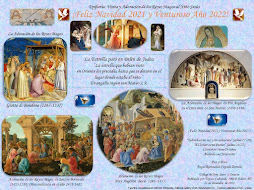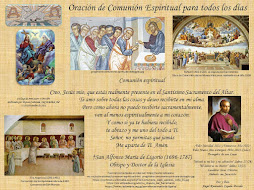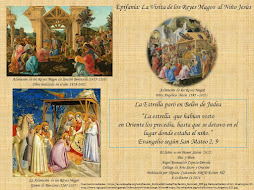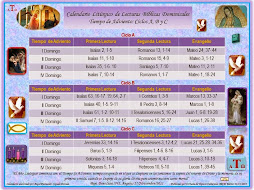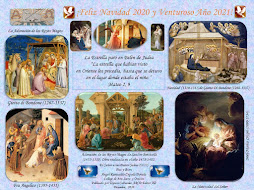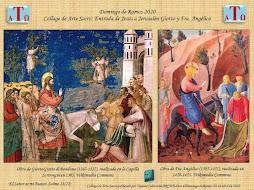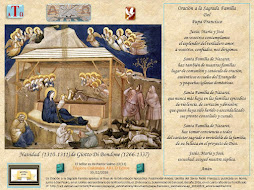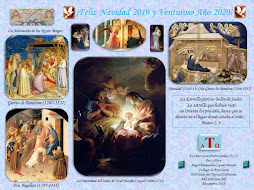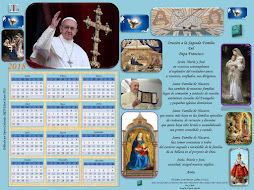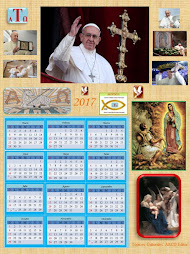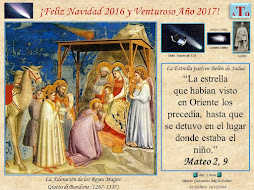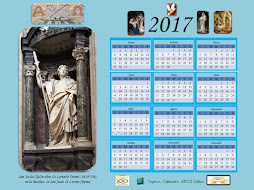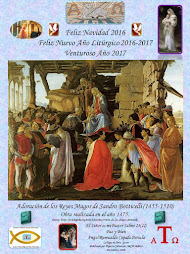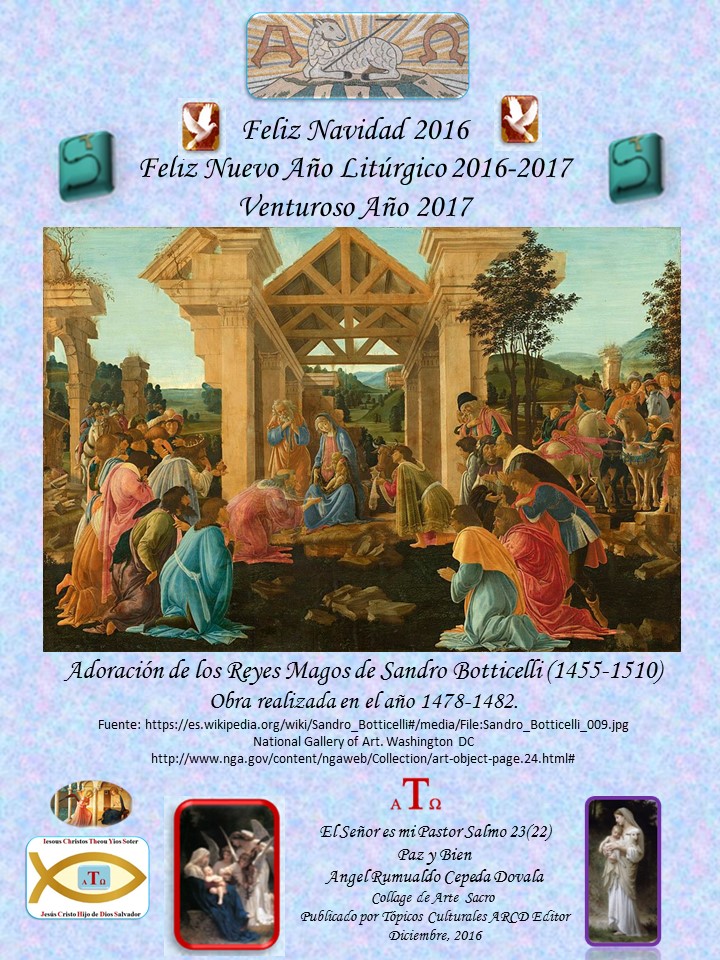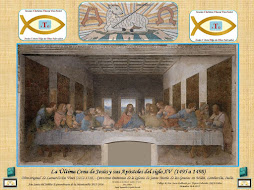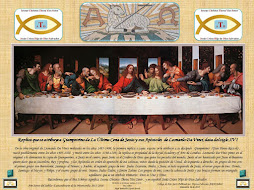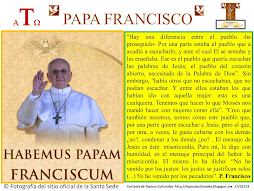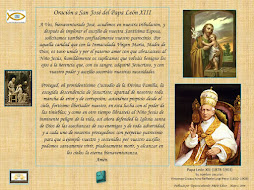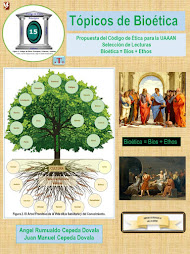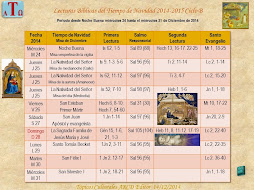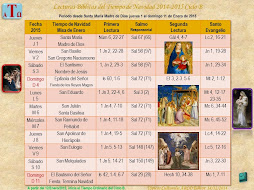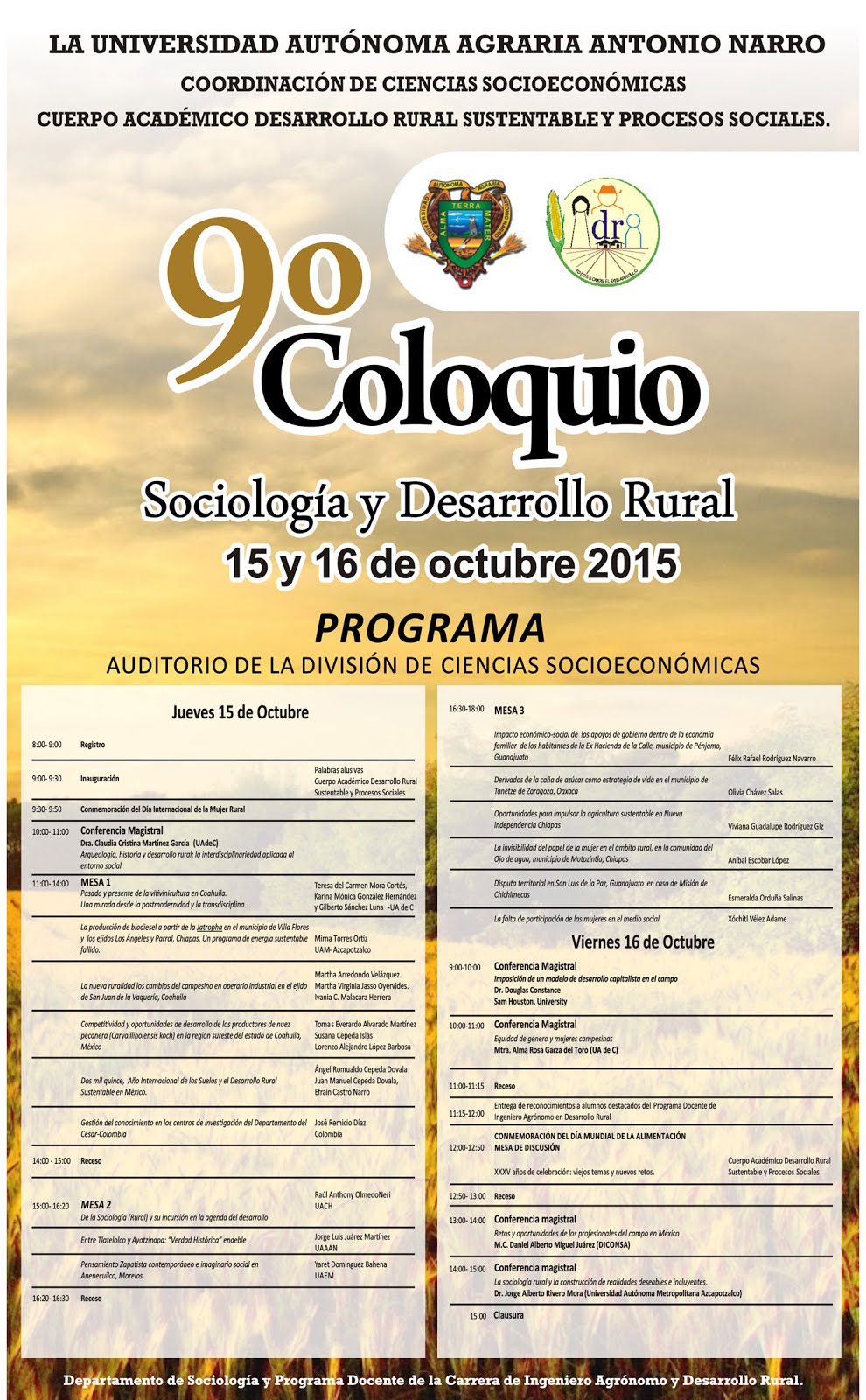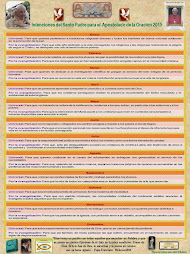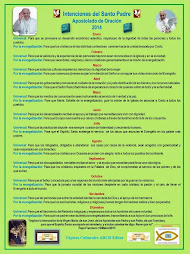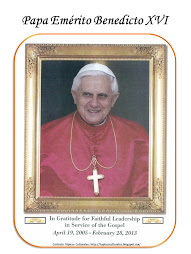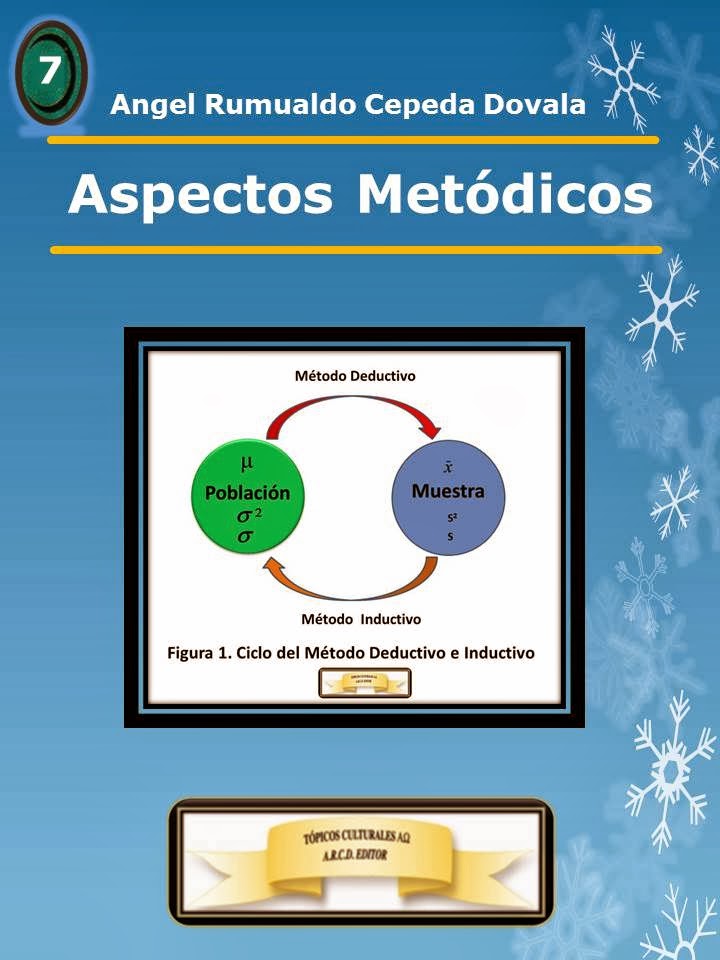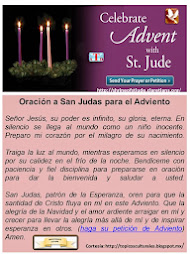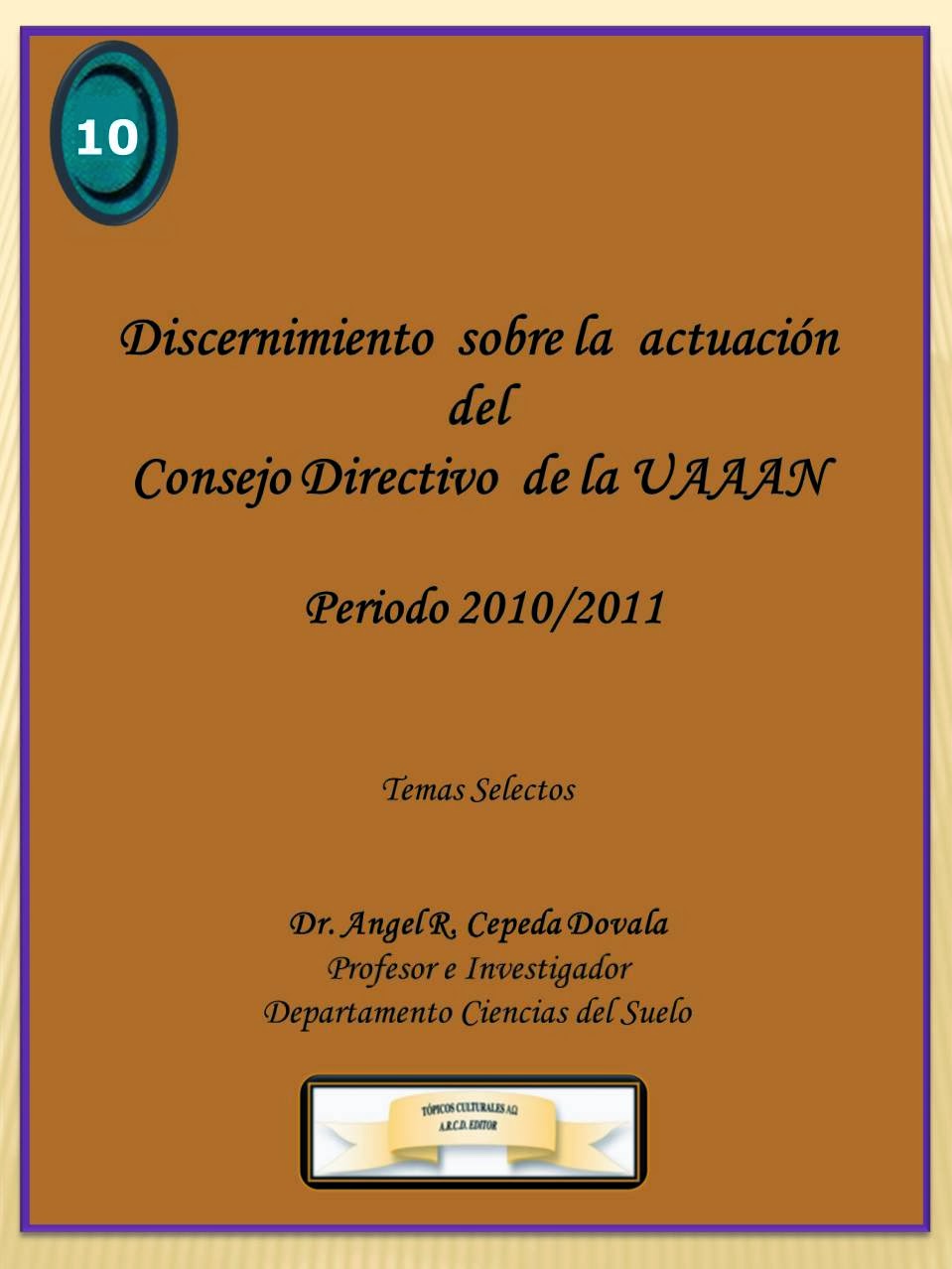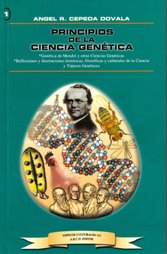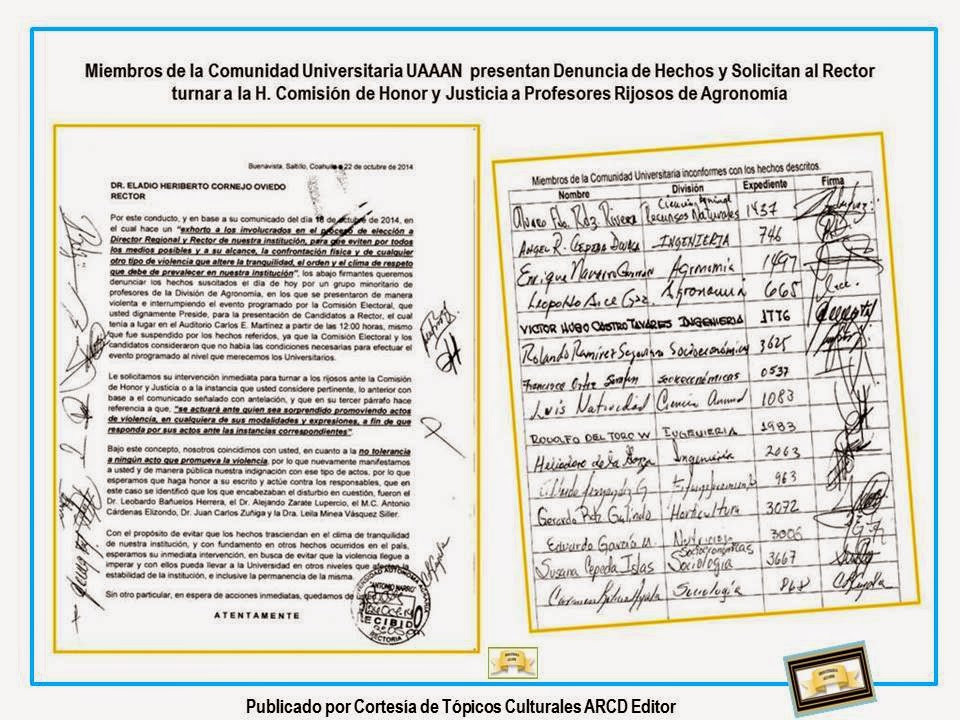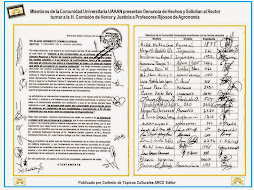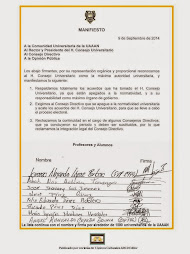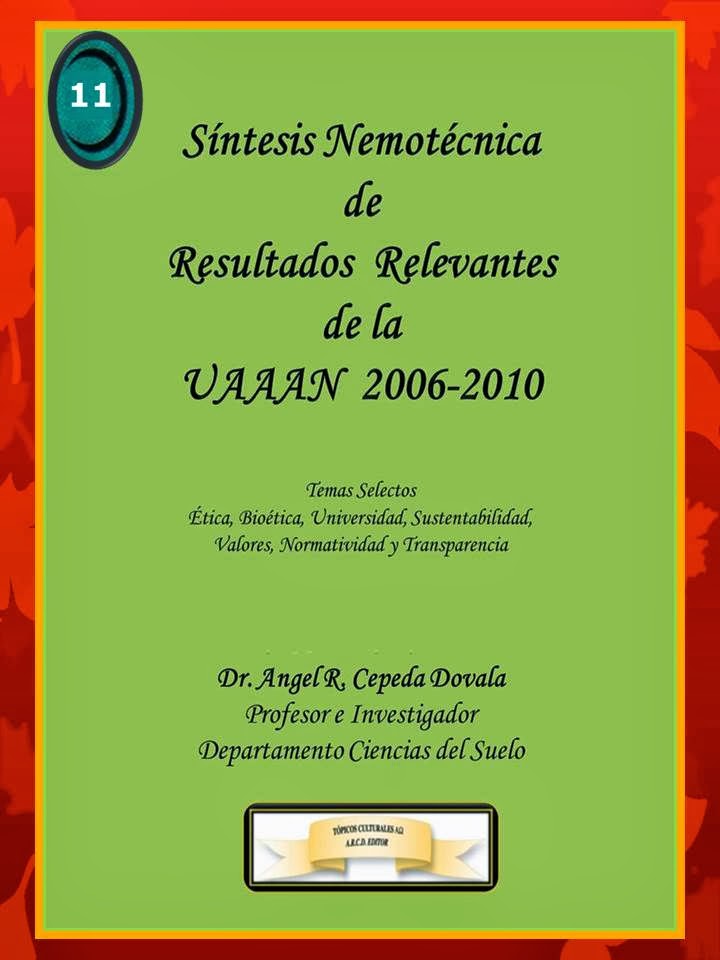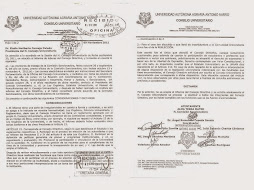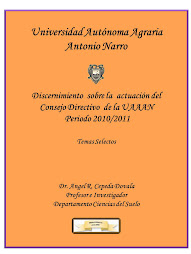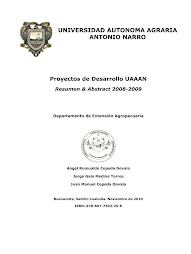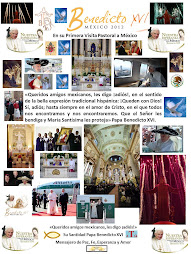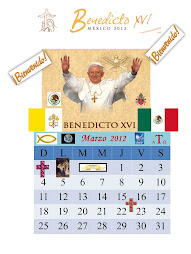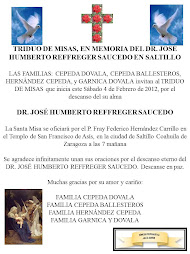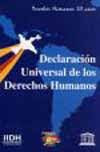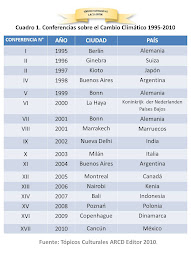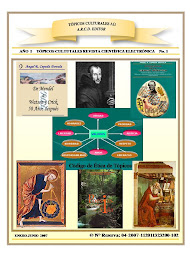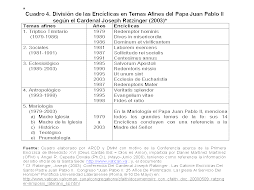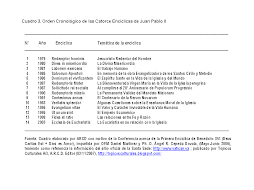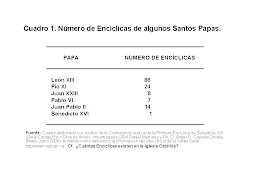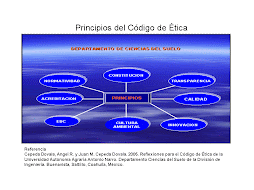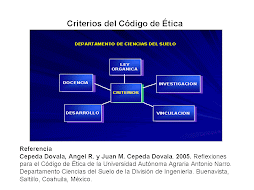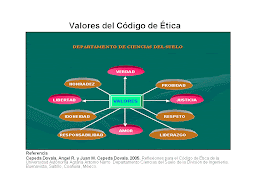En el Último Día de 2010
Por
Angel R. Cepeda Dovala
Posiblemente el hacer un excelente y provechoso examen de conciencia, nos permitirá reconocer los aciertos y errores en que se haya incurrido, pero ante todo reconociendo la maravilla de la Creación de Dios, lo bueno, lo bello, lo más nobles de nuestros logros, pues “Dios envió al mundo a su Hijo único, para darnos Vida por medio de Él”, (Cf. 1 Jn 4, 9); y meditar la Palabra en el evangelio de San Juan 1, 1-18, nos permitirá entender y comprender mejor el Principio de la Palabra que estaba con Dios, el Verbo Encarnado, pues la Palabra se hizo carne, y es la Verdad que está en el seno del Padre.
¡Feliz y Venturoso Año 2011!
PAZ Y BIEN
ARCD
viernes, 31 de diciembre de 2010
martes, 28 de diciembre de 2010
La Paz del Siervo, Por Angel R. Cepeda Dovala
La Paz del Siervo. Salmo 35 [34].
Por
Angel R. Cepeda Dovala
La meditación y la oración de las personas justas perseguidas, aquellas que no son profetas en sus tierras, como aquel Justo en su tierra, ciudad o país, recuerden el Salmo 35 [34] y canten, alégrense, deseen el triunfo y la felicidad repitiendo:
«¡Qué grande es el Señor que en la paz de su siervo se complace!». (Cf. Sal 35, 27).
PAZ Y BIEN
ARCD
Por
Angel R. Cepeda Dovala
La meditación y la oración de las personas justas perseguidas, aquellas que no son profetas en sus tierras, como aquel Justo en su tierra, ciudad o país, recuerden el Salmo 35 [34] y canten, alégrense, deseen el triunfo y la felicidad repitiendo:
«¡Qué grande es el Señor que en la paz de su siervo se complace!». (Cf. Sal 35, 27).
PAZ Y BIEN
ARCD
viernes, 24 de diciembre de 2010
Benedicto XVI y el Significado de la Navidad del Señor
Benedicto XVI y el Significado de la Navidad del Señor
Por
Angel R. Cepeda Dovala
¡Feliz Navidad 2010 y Venturoso Año 2011! Paz y Bien.
Quizás algunos lectores de Tópicos Culturales, aun no conozcan el sabio mensaje que dio el Papa Benedicto XVI, en la Audiencia General del miércoles 23 de diciembre de 2009, en relación al Significado de la Navidad, [1], en donde se hace referencia histórica para comprender esta solemnidad, y entre otras cuestiones muy importantes, se hace alusión a la primera biografía de Tomás de Celano en donde habla de la noche del belén de Greccio, en aquella noche de Navidad, le fue concedida a san Francisco la gracia de una visión maravillosa, y que se mencionan algunos aspectos en: “The First Christmas Crèche” [2]. Considerando su importancia para la Cultura de la Vida en Cristo, se transcribe a continuación la Audiencia del 23 de diciembre de 2009 del Santo Padre Benedicto XVI:
BENEDICTO XVI
AUDIENCIA GENERAL
Miércoles 23 de diciembre de 2009
Queridos hermanos y hermanas:
Con la Novena de Navidad que estamos celebrando en estos días, la Iglesia nos invita a vivir de modo intenso y profundo la preparación al Nacimiento del Salvador, ya inminente. El deseo, que todos llevamos en el corazón, es que la próxima fiesta de la Navidad nos dé, en medio de la actividad frenética de nuestros días, una serena y profunda alegría para que nos haga tocar con la mano la bondad de nuestro Dios y nos infunda nuevo valor.
Para comprender mejor el significado de la Navidad del Señor quisiera hacer una breve referencia al origen histórico de esta solemnidad. De hecho, el Año litúrgico de la Iglesia no se desarrolló inicialmente partiendo del nacimiento de Cristo, sino de la fe en su resurrección. Por eso la fiesta más antigua de la cristiandad no es la Navidad, sino la Pascua; la resurrección de Cristo funda la fe cristiana, está en la base del anuncio del Evangelio y hace nacer a la Iglesia. Por lo tanto, ser cristianos significa vivir de modo pascual, implicándonos en el dinamismo originado por el Bautismo, que lleva a morir al pecado para vivir con Dios (cf. Rm 6,4).
El primero que afirmó con claridad que Jesús nació el 25 de diciembre fue Hipólito de Roma, en su comentario al libro del profeta Daniel, escrito alrededor del año 204. Algún exegeta observa, además, que ese día se celebraba la fiesta de la Dedicación del Templo de Jerusalén, instituida por Judas Macabeo en el 164 antes de Cristo. La coincidencia de fechas significaría entonces que con Jesús, aparecido como luz de Dios en la noche, se realiza verdaderamente la consagración del templo, el Adviento de Dios a esta tierra.
En la cristiandad la fiesta de Navidad asumió una forma definida en el siglo IV, cuando tomó el lugar de la fiesta romana del "Sol invictus", el sol invencible; así se puso de relieve que el nacimiento de Cristo es la victoria de la verdadera luz sobre las tinieblas del mal y del pecado. Con todo, el particular e intenso clima espiritual que rodea la Navidad se desarrolló en la Edad Media, gracias a san Francisco de Asís, que estaba profundamente enamorado del hombre Jesús, del Dios-con-nosotros. Su primer biógrafo, Tomás de Celano, en la Vita seconda narra que san Francisco "por encima de las demás solemnidades, celebraba con inefable premura el Nacimiento del Niño Jesús, y llamaba fiesta de las fiestas al día en que Dios, hecho un niño pequeño, había sido amamantado por un seno humano" (Fonti Francescane, n. 199, p. 492). De esta particular devoción al misterio de la Encarnación se originó la famosa celebración de la Navidad en Greccio. Probablemente, para ella san Francisco se inspiró durante su peregrinación a Tierra Santa y en el pesebre de Santa María la Mayor en Roma. Lo que animaba al Poverello de Asís era el deseo de experimentar de forma concreta, viva y actual la humilde grandeza del acontecimiento del nacimiento del Niño Jesús y de comunicar su alegría a todos.
En la primera biografía, Tomás de Celano habla de la noche del belén de Greccio de una forma viva y conmovedora, dando una contribución decisiva a la difusión de la tradición navideña más hermosa, la del belén. La noche de Greccio devolvió a la cristiandad la intensidad y la belleza de la fiesta de la Navidad y educó al pueblo de Dios a captar su mensaje más auténtico, su calor particular, y a amar y adorar la humanidad de Cristo. Este particular enfoque de la Navidad ofreció a la fe cristiana una nueva dimensión. La Pascua había concentrado la atención sobre el poder de Dios que vence a la muerte, inaugura una nueva vida y enseña a esperar en el mundo futuro. Con san Francisco y su belén se ponían de relieve el amor inerme de Dios, su humildad y su benignidad, que en la Encarnación del Verbo se manifiesta a los hombres para enseñar un modo nuevo de vivir y de amar.
Celano narra que, en aquella noche de Navidad, le fue concedida a san Francisco la gracia de una visión maravillosa. Vio que en el pesebre yacía inmóvil un niño pequeño, que se despertó del sueño precisamente por la cercanía de san Francisco. Y añade: "Esta visión coincidía con los hechos, pues, por obra de su gracia que actuaba por medio de su santo siervo Francisco, el niño Jesús fue resucitado en el corazón de muchos que le habían olvidado, y quedó profundamente grabado en su memoria amorosa" (Vita prima, op. cit., n. 86, p. 307). Este cuadro describe con gran precisión todo lo que la fe viva y el amor de san Francisco a la humanidad de Cristo han transmitido a la fiesta cristiana de la Navidad: el descubrimiento de que Dios se revela en los tiernos miembros del Niño Jesús. Gracias a san Francisco, el pueblo cristiano ha podido percibir que en Navidad Dios ha llegado a ser verdaderamente el "Emmanuel", el Dios-con-nosotros, del que no nos separa ninguna barrera ni lejanía. En ese Niño, Dios se ha hecho tan próximo a cada uno de nosotros, tan cercano, que podemos tratarle de tú y mantener con él una relación confiada de profundo afecto, como lo hacemos con un recién nacido.
En ese Niño se manifiesta el Dios-Amor: Dios viene sin armas, sin la fuerza, porque no pretende conquistar, por decir así, desde fuera, sino que quiere más bien ser acogido libremente por el hombre; Dios se hace Niño inerme para vencer la soberbia, la violencia, el afán de poseer del hombre. En Jesús, Dios asumió esta condición pobre y conmovedora para vencer con el amor y llevarnos a nuestra verdadera identidad. No debemos olvidar que el título más grande de Jesucristo es precisamente el de "Hijo", Hijo de Dios; la dignidad divina se indica con un término que prolonga la referencia a la humilde condición del pesebre de Belén, aunque corresponda de manera única a su divinidad, que es la divinidad del "Hijo".
Su condición de Niño nos indica además cómo podemos encontrar a Dios y gozar de su presencia. A la luz de la Navidad podemos comprender las palabras de Jesús: "Si no os convertís y os hacéis como niños, no entraréis en el reino de los cielos" (Mt 18, 3). Quien no ha entendido el misterio de la Navidad, no ha entendido el elemento decisivo de la existencia cristiana. Quien no acoge a Jesús con corazón de niño, no puede entrar en el reino de los cielos; esto es lo que san Francisco quiso recordar a la cristiandad de su tiempo y de todos los tiempos, hasta hoy. Oremos al Padre para que conceda a nuestro corazón la sencillez que reconoce en el Niño al Señor, precisamente como hizo san Francisco en Greccio. Así pues, también a nosotros nos podría suceder lo que Tomás de Celano, refiriéndose a la experiencia de los pastores en la Noche Santa (cf. Lc 2, 20), narra a propósito de quienes estuvieron presentes en el acontecimiento de Greccio: "Cada uno volvió a su casa lleno de inefable alegría" (Vita prima, op. cit., n. 86, p. 479).
Este es el deseo que os expreso con afecto a todos vosotros, a vuestras familias y a vuestros seres queridos. ¡Feliz Navidad a todos!
Notas
[1] Cf. http://www.vatican.va/holy_father/benedict_xvi/audiences/2009/documents/hf_ben-xvi_aud_20091223_sp.html
[2] Cf. The First Christmas Crèche, in: http://topicosculturales.blogspot.com/2010/12/first-christmas-creche-by-angel-cepeda.html
The First Christmas Crèche, By Angel R. Cepeda Dovala
The First Christmas Crèche
By
Angel R. Cepeda Dovala
This short communication is based on The Life of Saint Francis by Thomas Celano.
Francis called it a “crèche,” the French word for cradle. He created the first crèche using real people, a real manger, a real donkey and ox, and real shepherds.
He wanted to do something that would help people remember the Christ Child and how He was born in Bethlehem, to see and experience Jesus in the manger, lying on hay wait animals nearby.
It was Christmas Eve in the year 1223. At the appointed time, Friars and people from the area came to the new Bethlehem to celebrate. Their torches lit up the night as they approached the crèche. Once again, shepherds were walking in the night to come and adore Him. All were filled with joy over the mystery of the Birth of Christ. And a great tradition began.
As we gaze upon the Nativity Set at Church or in our own homes this year, may we remember and celebrate once again God´s love for His creation. Jesus Christ, to show His abundant love, mercy and forgiveness, became human exactly like us. This is what the crèche meant for Francis, and what it means for the seminarians and Capuchin friars at Saint Lawrence Seminary today. [1].
We promise to remember you and your intentions at Christmas.
The Cultural Topics Community is grateful for the seminarians, Capuchin friars, and to Father Fr. Dennis Duggan, OFM, Capuchin & Rector of the Saint Lawrence Seminary, for sending me, a beautiful Christmas card, which is included in our Christmas message and happy New Year 2011 card.
Sincerely
Angel R. Cepeda Dovala
Cultural Topics Editor
Note.
[1] Cf. Saint Lawrence Seminary, in: www.stlawrence.edu
By
Angel R. Cepeda Dovala
This short communication is based on The Life of Saint Francis by Thomas Celano.
Francis called it a “crèche,” the French word for cradle. He created the first crèche using real people, a real manger, a real donkey and ox, and real shepherds.
He wanted to do something that would help people remember the Christ Child and how He was born in Bethlehem, to see and experience Jesus in the manger, lying on hay wait animals nearby.
It was Christmas Eve in the year 1223. At the appointed time, Friars and people from the area came to the new Bethlehem to celebrate. Their torches lit up the night as they approached the crèche. Once again, shepherds were walking in the night to come and adore Him. All were filled with joy over the mystery of the Birth of Christ. And a great tradition began.
As we gaze upon the Nativity Set at Church or in our own homes this year, may we remember and celebrate once again God´s love for His creation. Jesus Christ, to show His abundant love, mercy and forgiveness, became human exactly like us. This is what the crèche meant for Francis, and what it means for the seminarians and Capuchin friars at Saint Lawrence Seminary today. [1].
We promise to remember you and your intentions at Christmas.
The Cultural Topics Community is grateful for the seminarians, Capuchin friars, and to Father Fr. Dennis Duggan, OFM, Capuchin & Rector of the Saint Lawrence Seminary, for sending me, a beautiful Christmas card, which is included in our Christmas message and happy New Year 2011 card.
Sincerely
Angel R. Cepeda Dovala
Cultural Topics Editor
Note.
[1] Cf. Saint Lawrence Seminary, in: www.stlawrence.edu
domingo, 19 de diciembre de 2010
U.S.A. In Turmoil, By Roger Behra
SHORT COMMUNICATION 220
U.S.A. In Turmoil
By
Roger Behra
The word turmoil means a state of confusion and trouble, and millions of Americans feel that is the present state of affairs in the U.S.A. Their gut feelings are very correct. Many Americans also feel that the light at the end of the tunnel is very dim, indeed, and there are several factors to consider that feeds this very pessimistic outlook in America.
It all begins with the Obama administration and his Washington super liberals. They have America in debt to the tune of billions that last for one or more generations. Their stimulus program cost billions and did little help for the very bad economy. The mid-year election hopes to change things in Washington, and it has to start soon.
It has to start with the very high unemployment situation that is the highest since the depression if the 1930’s. The Washington health care plan that they passed is a bad one. Home ownership has collapsed for millions. Banks are afraid to make loans to home buyers and to start new small businesses. Terrorism on American soil is a constant worry. The financial support of wars on foreign soil is a great drain on America’s finances because of her involvement. America’s ideals and goals are greatly unmatched by reality. And to top all of this off is the relative thinking and actions that faith in God, religious living, good moral principles, and proper execution of government are far down on the list of great importance.
Thirty-three percent of Americans think that efficient government executions of functions are more important than faith in God and good morality. Only sixteen percent said that God is important in governmental affairs. Nearly fifty percent think that God has no role in improving the American culture. That is at the root of the great decline in America’s culture. It was not always that way.
Once upon a time in the distant past, America was made up of God obeying, church going, moral, honest, and hard-working, and charitable Americans that made America orderly and successful and a great international leader. Americans of years ago knew that God and Godly living and His blessing were needed and so important. And then the counterculture people arrived and changed everything. Now, when fifty percent of Americans feel that God is not important and eighty-four percent feel morality is not important, we have America in turmoil. It is not a coincidence. It is an absolute parallel of events. And the very dim light at the end of the tunnel indicates the turmoil in America’s culture will continue, and that America will never be a great nation internationally ever again. It is good-bye time for America’s once upon a time greatness. It is so very sad, indeed.
R. B.
12-28-10
U.S.A. In Turmoil
By
Roger Behra
The word turmoil means a state of confusion and trouble, and millions of Americans feel that is the present state of affairs in the U.S.A. Their gut feelings are very correct. Many Americans also feel that the light at the end of the tunnel is very dim, indeed, and there are several factors to consider that feeds this very pessimistic outlook in America.
It all begins with the Obama administration and his Washington super liberals. They have America in debt to the tune of billions that last for one or more generations. Their stimulus program cost billions and did little help for the very bad economy. The mid-year election hopes to change things in Washington, and it has to start soon.
It has to start with the very high unemployment situation that is the highest since the depression if the 1930’s. The Washington health care plan that they passed is a bad one. Home ownership has collapsed for millions. Banks are afraid to make loans to home buyers and to start new small businesses. Terrorism on American soil is a constant worry. The financial support of wars on foreign soil is a great drain on America’s finances because of her involvement. America’s ideals and goals are greatly unmatched by reality. And to top all of this off is the relative thinking and actions that faith in God, religious living, good moral principles, and proper execution of government are far down on the list of great importance.
Thirty-three percent of Americans think that efficient government executions of functions are more important than faith in God and good morality. Only sixteen percent said that God is important in governmental affairs. Nearly fifty percent think that God has no role in improving the American culture. That is at the root of the great decline in America’s culture. It was not always that way.
Once upon a time in the distant past, America was made up of God obeying, church going, moral, honest, and hard-working, and charitable Americans that made America orderly and successful and a great international leader. Americans of years ago knew that God and Godly living and His blessing were needed and so important. And then the counterculture people arrived and changed everything. Now, when fifty percent of Americans feel that God is not important and eighty-four percent feel morality is not important, we have America in turmoil. It is not a coincidence. It is an absolute parallel of events. And the very dim light at the end of the tunnel indicates the turmoil in America’s culture will continue, and that America will never be a great nation internationally ever again. It is good-bye time for America’s once upon a time greatness. It is so very sad, indeed.
R. B.
12-28-10
These Evils Flourish, By Roger Behra
SHORT COMMUNICATION 219
These Evils Flourish
By
Roger Behra
Three of the large group of evil behaviors have gained considerable practice and have become embedded in America’s culture, and they have gained considerable momentum during the past five years especially. These evil behaviors have seriously harmed America’s culture and tarnished her image in the minds of all Christian living people. Revelations of these evil behaviors have been frequently printed in newspapers and mentioned on radio and television. The there very addictive roost of evil being referred to here are internet pornography, immoral sex, and the greed for money. These evil addictions have ruined some very well-known lives and personal careers, especially during the 2009 and 2010 years.
Evil sex and the related activities to it top the list of the three types, and it badly stains character, ruins lives, and careers, especially those of well-known people. Teens and those all the way up to mature adults participate in evil sex. Teens as young as 12-years-old are now involved. Evil sex includes fornication, adultery, cohabitation, homosexuality, infidelity, and prostitution, as well as bisexuality. All of these are scourges individuals and to the culture in general.
A major cultural scourge in modern times is internet pornography. Millions of young and old have become addicted to it, and it is the root cause and urges to commit all kinds of evil behavior. The new evil activity is sexting. It has become a great evil addiction among very young teens, young adults, and, now, seniors. It has taken over in so many lives, and when it becomes public knowledge, lives and careers are greatly affected. Recently, some very well-known politicians, Hollywood people, several teachers, and a television evangelist have had their lives and careers affected.
The saying goes “money is the root of all evil”. That certainly is true in modern American culture. Some people combine money and evil sex to ruin their character and career. Tiger Woods is a great current example. Porno stars and prostitutes combine evil sex and money. Bernard Madoff ruined his senior life being involved and the organizer of a multi-billion dollar fraud scandal. The Mickey Mouse bank robber was recently caught after robbing several banks. A dozen banks have also been robbed by other robbers. California is fertile ground for bank robbers. A Southern California couple bragged on the Dr. Phil television show how they sold their shoplifted toys on E-Bay for 100,000 dollars. It led to their arrest and sentence to federal prison. All of these activities were evil for money.
No one is immune from three top flourishing modern evils. They are strongly addictive roots of evil. It takes daily religious living and strong character to quickly step back away from these flourishing evils, especially evil sex that is so easily accepted in modern American society and practiced by teens, young adults, older adults, and most recently, seniors.
R. B.
11-26-10
These Evils Flourish
By
Roger Behra
Three of the large group of evil behaviors have gained considerable practice and have become embedded in America’s culture, and they have gained considerable momentum during the past five years especially. These evil behaviors have seriously harmed America’s culture and tarnished her image in the minds of all Christian living people. Revelations of these evil behaviors have been frequently printed in newspapers and mentioned on radio and television. The there very addictive roost of evil being referred to here are internet pornography, immoral sex, and the greed for money. These evil addictions have ruined some very well-known lives and personal careers, especially during the 2009 and 2010 years.
Evil sex and the related activities to it top the list of the three types, and it badly stains character, ruins lives, and careers, especially those of well-known people. Teens and those all the way up to mature adults participate in evil sex. Teens as young as 12-years-old are now involved. Evil sex includes fornication, adultery, cohabitation, homosexuality, infidelity, and prostitution, as well as bisexuality. All of these are scourges individuals and to the culture in general.
A major cultural scourge in modern times is internet pornography. Millions of young and old have become addicted to it, and it is the root cause and urges to commit all kinds of evil behavior. The new evil activity is sexting. It has become a great evil addiction among very young teens, young adults, and, now, seniors. It has taken over in so many lives, and when it becomes public knowledge, lives and careers are greatly affected. Recently, some very well-known politicians, Hollywood people, several teachers, and a television evangelist have had their lives and careers affected.
The saying goes “money is the root of all evil”. That certainly is true in modern American culture. Some people combine money and evil sex to ruin their character and career. Tiger Woods is a great current example. Porno stars and prostitutes combine evil sex and money. Bernard Madoff ruined his senior life being involved and the organizer of a multi-billion dollar fraud scandal. The Mickey Mouse bank robber was recently caught after robbing several banks. A dozen banks have also been robbed by other robbers. California is fertile ground for bank robbers. A Southern California couple bragged on the Dr. Phil television show how they sold their shoplifted toys on E-Bay for 100,000 dollars. It led to their arrest and sentence to federal prison. All of these activities were evil for money.
No one is immune from three top flourishing modern evils. They are strongly addictive roots of evil. It takes daily religious living and strong character to quickly step back away from these flourishing evils, especially evil sex that is so easily accepted in modern American society and practiced by teens, young adults, older adults, and most recently, seniors.
R. B.
11-26-10
Another Freedom Lost, By Roger Behra
SHORT COMMUNICATION 218
Another Freedom Lost
By
Roger Behra
Yes, it just had to happen in America, and the excuse once again is the threat of terrorism, but it is a giant step in the wrong direction, and the general public in America is upset. The anger and disgust is strongly directed at the Transportation Security Association (TSA), and it is absolutely justified because their latest maneuver is one-hundred-percent an invasion of privacy. There is no doubt.
The full-body scanner that images a person’s nude body and the all-body pat-down are the sources of anger expressed by airline passengers. Many airports in the United States have begun using these gross invasions of privacy methods, all as an excuse against terrorism. In essence the ordinary American who travels by airline has become the target instead of the terrorist. This time you have gone too far, Big Brother.
The scanners in use are the same as taking off all one’s cloths. The agents get a complete view of the naked body that leaves nothing to the imagination. It is totally unjustified, and a person has very just rights to objet. No one has a right to gaze upon all God gave a person, not even as a guard against terrorism. There is also and added worry. And that is the danger that later the images will have a far wider audience than ever imagined. Can you visualize the delight on some faces as the naked images are being seen in the back room at one´s self gratification? Over 35,000 courthouse images have been saved by U.S. Marshals. There is no telling what has been done with those in private.
Another added worry is there because the right of refusal is a legal choice. If a passenger rejects the full-body scanner, here comes the “enhanced” pat-down. It is not the gentle frisking of the past. Instead, it is aggressive probing of intimate zones-breasts, buttocks, and genitals in through crotch examination. Both the scanner and the pat-down is a very demeaning experience. It is very humiliating to say the least. It is totally unneeded, and it makes the airplane passenger the humiliated and angry target. The TSA is following the political correctness agenda fostered by Washington politicians, and it is making Americans the target instead of the terrorist. Terrorists do not look like Americans. Americans do not hate America. Islamics hate America. They practice Islam which condones terrorism. And the Islamics are the terrorists, and they aim their terror at America. The TSA should figure that out. Everyone else has.
No one is going to come to the aid of the airline passenger except the airline passenger. They have to keep a large, strong, and constant outcry against scanning and the pat-down procedures of seeing and handling of one’s private parts. Unless the passengers rebel against a degrading procedure and the serious invasion of privacy, the scanners and pat-downs will remain in effect, the TSA wins the game and more warped and ridiculous counterculture thinking will remain in America’s culture. The airline passenger has the power to regain and protect a precious freedom lost: No one has any right to see or touch one’s private area.
R. B.
12-24-10
Another Freedom Lost
By
Roger Behra
Yes, it just had to happen in America, and the excuse once again is the threat of terrorism, but it is a giant step in the wrong direction, and the general public in America is upset. The anger and disgust is strongly directed at the Transportation Security Association (TSA), and it is absolutely justified because their latest maneuver is one-hundred-percent an invasion of privacy. There is no doubt.
The full-body scanner that images a person’s nude body and the all-body pat-down are the sources of anger expressed by airline passengers. Many airports in the United States have begun using these gross invasions of privacy methods, all as an excuse against terrorism. In essence the ordinary American who travels by airline has become the target instead of the terrorist. This time you have gone too far, Big Brother.
The scanners in use are the same as taking off all one’s cloths. The agents get a complete view of the naked body that leaves nothing to the imagination. It is totally unjustified, and a person has very just rights to objet. No one has a right to gaze upon all God gave a person, not even as a guard against terrorism. There is also and added worry. And that is the danger that later the images will have a far wider audience than ever imagined. Can you visualize the delight on some faces as the naked images are being seen in the back room at one´s self gratification? Over 35,000 courthouse images have been saved by U.S. Marshals. There is no telling what has been done with those in private.
Another added worry is there because the right of refusal is a legal choice. If a passenger rejects the full-body scanner, here comes the “enhanced” pat-down. It is not the gentle frisking of the past. Instead, it is aggressive probing of intimate zones-breasts, buttocks, and genitals in through crotch examination. Both the scanner and the pat-down is a very demeaning experience. It is very humiliating to say the least. It is totally unneeded, and it makes the airplane passenger the humiliated and angry target. The TSA is following the political correctness agenda fostered by Washington politicians, and it is making Americans the target instead of the terrorist. Terrorists do not look like Americans. Americans do not hate America. Islamics hate America. They practice Islam which condones terrorism. And the Islamics are the terrorists, and they aim their terror at America. The TSA should figure that out. Everyone else has.
No one is going to come to the aid of the airline passenger except the airline passenger. They have to keep a large, strong, and constant outcry against scanning and the pat-down procedures of seeing and handling of one’s private parts. Unless the passengers rebel against a degrading procedure and the serious invasion of privacy, the scanners and pat-downs will remain in effect, the TSA wins the game and more warped and ridiculous counterculture thinking will remain in America’s culture. The airline passenger has the power to regain and protect a precious freedom lost: No one has any right to see or touch one’s private area.
R. B.
12-24-10
The Greatest Surprise, By Roger Behra
SHORT COMMUNICATION 217
The Greatest Surprise
By
Roger Behra
There are an unimaginable number of people living today that is instore for the greatest surprise of their lives. And it can happen at any time. There can be no possible way to stop it from happening sooner or later, and when it happens to them, there will be no mistaking it for what it really is. It will be the final greeting of reality in their lives. And who is making up this unimaginable number of people? ATHEISTS! And what is the greatest surprise awaiting them? It will be their meeting with the God they so earnestly deny. As Gomer Pyle used to say on the program, Gomer Pyle, USMC, Surprise! Surprise!
This is what atheists need to know (agnostics also). Have no disbeliefs or doubts. God is! God exist! God is everywhere! God is the source of all good and love! God created the immense universe and us to enjoy it. They are His greatest earthly creations. God is all powerful and all knowing, and He is always there for us.
How is all this believable and known to us? Read the Holy Bible. Read the many books on people´s near death experiences. The revelation of their experiences is truly amazing. Read what went on during their NDE and how their lives were so greatly transformed. Talk to someone who has had a NDE. There is no doubt at all in their minds, heart, and lives that God exists. Talk to doctors, nurses, psychiatrist, and other science trained people who have had a near-death experience. Many experiencers who have not been under any medication have had a near-death experience. Many experiencers who have not been under any medication have had a NDE. So, it cannot be a hallucination or caused by any drug. And neither can the transformation in personal lives be blamed on drugs. Really, there is so much documented and convincing evidence available.
It is so true that near-death experiences smile often and give great hugs. They know that God exists, that He is the author of unconditional and all-encompassing love and eternal happiness, and that He is there for us now and eternally. It is so comforting to realize it.
Seek out and talk to some near-death experiences. Read books on the near-death experiences. Read the Bible. That way anyone can make the best of God´s great gift of life here and the gift of a happy eternity that awaits everyone who believes in God, keeps His Commandments, and loves Him and our neighbor.
Remember God’s precious gifts---our salvation, our life, and our free will. They were given to us to use wisely and from Mis great love for us.
The best advice to give to atheists (Agnostics, also) is this. Have an open mind. Investigate all the solid available evidence. There is plenty of it out there that God exists. It is overwhelming and totally convincing. And remember this: it is better to believe and lose nothing than to disbelieve and lose everything one’s happy eternity with God. Remember God’s own words. “If you deny Me here on earth, so will I deny later before My Father in Heaven.” Go forth as a believer.
R. B.
The Greatest Surprise
By
Roger Behra
There are an unimaginable number of people living today that is instore for the greatest surprise of their lives. And it can happen at any time. There can be no possible way to stop it from happening sooner or later, and when it happens to them, there will be no mistaking it for what it really is. It will be the final greeting of reality in their lives. And who is making up this unimaginable number of people? ATHEISTS! And what is the greatest surprise awaiting them? It will be their meeting with the God they so earnestly deny. As Gomer Pyle used to say on the program, Gomer Pyle, USMC, Surprise! Surprise!
This is what atheists need to know (agnostics also). Have no disbeliefs or doubts. God is! God exist! God is everywhere! God is the source of all good and love! God created the immense universe and us to enjoy it. They are His greatest earthly creations. God is all powerful and all knowing, and He is always there for us.
How is all this believable and known to us? Read the Holy Bible. Read the many books on people´s near death experiences. The revelation of their experiences is truly amazing. Read what went on during their NDE and how their lives were so greatly transformed. Talk to someone who has had a NDE. There is no doubt at all in their minds, heart, and lives that God exists. Talk to doctors, nurses, psychiatrist, and other science trained people who have had a near-death experience. Many experiencers who have not been under any medication have had a near-death experience. Many experiencers who have not been under any medication have had a NDE. So, it cannot be a hallucination or caused by any drug. And neither can the transformation in personal lives be blamed on drugs. Really, there is so much documented and convincing evidence available.
It is so true that near-death experiences smile often and give great hugs. They know that God exists, that He is the author of unconditional and all-encompassing love and eternal happiness, and that He is there for us now and eternally. It is so comforting to realize it.
Seek out and talk to some near-death experiences. Read books on the near-death experiences. Read the Bible. That way anyone can make the best of God´s great gift of life here and the gift of a happy eternity that awaits everyone who believes in God, keeps His Commandments, and loves Him and our neighbor.
Remember God’s precious gifts---our salvation, our life, and our free will. They were given to us to use wisely and from Mis great love for us.
The best advice to give to atheists (Agnostics, also) is this. Have an open mind. Investigate all the solid available evidence. There is plenty of it out there that God exists. It is overwhelming and totally convincing. And remember this: it is better to believe and lose nothing than to disbelieve and lose everything one’s happy eternity with God. Remember God’s own words. “If you deny Me here on earth, so will I deny later before My Father in Heaven.” Go forth as a believer.
R. B.
Intelligent Design Wins, By Roger Behra
SHORT COMMUNICATION 216
Intelligent Design Wins
By
Roger Behra
In the American schools whenever the origin of the Universe and man is taught most all the teachers and professors work hard to keep God out of the equation. And that is most unfair to the students. When intelligent design is also taught it is very easy to realize that evolution is full of obvious holes. Without the comparison the students are very much misled. Intelligent design and creationism is greatly provable when properly presented, while evolution is only a theory.
The proof of intelligent design and human creation is their in the Holy Bible. During the seven days God used to complete his plans, He created the Universe. At the same time He created man in His own likeness. None of this happened by accident or over a long period of time. It all happened during a seven day period.
The Universe -sun, moon, stars, and planets- is so vast, so orderly, and so consistent, that it absolutely could not have been by chance. And the fact that it has remained so for and untold amount of time-year after year after year-greatly supports involvement. The billions of stars alone, all remaining in place, boggles the mind. And then there is the rest of the Universe, each part separately, to analyze and consider.
After the Universe was created, God created man in HIS OWN IMAGE AND LIKENESS. The excludes man evolving from apes or some other animal. Science has learned that the physical makeup of man is indeed, very, very complex to say the least. The simplest of cells appear so complex that they could not have been a product of evolution or come from an animal at any time. Darwin did not have any idea whatsoever about man’s very complex cell structure and overall complex physical makeup that could not possibly evolve from any type of animal. His promotion of evolution was a hollow and blind theory, and it still is. During the seven days of God’s creation of the Universe and man, it was orderly and intelligent design that could only come from Him. Nothing happened by accident, so the “Big Bang” theory can be discarded.
It is gratifying to know that many scientists respect intelligent design. They recognize a gift horse when it is staring them in the face. There was too much involved in His creation of the Universe and also the physical structure of man for any of it to happen by mere chance. Since man was created after the Universe, but was in God’s plan, He created the Universe in an orderly and stable way to accommodate man later. And it still does. All realistic thinking people realize that intelligent design (God’s) is the only realistic conclusion. It wins the debate without question.
R. B.
11-10-10
Intelligent Design Wins
By
Roger Behra
In the American schools whenever the origin of the Universe and man is taught most all the teachers and professors work hard to keep God out of the equation. And that is most unfair to the students. When intelligent design is also taught it is very easy to realize that evolution is full of obvious holes. Without the comparison the students are very much misled. Intelligent design and creationism is greatly provable when properly presented, while evolution is only a theory.
The proof of intelligent design and human creation is their in the Holy Bible. During the seven days God used to complete his plans, He created the Universe. At the same time He created man in His own likeness. None of this happened by accident or over a long period of time. It all happened during a seven day period.
The Universe -sun, moon, stars, and planets- is so vast, so orderly, and so consistent, that it absolutely could not have been by chance. And the fact that it has remained so for and untold amount of time-year after year after year-greatly supports involvement. The billions of stars alone, all remaining in place, boggles the mind. And then there is the rest of the Universe, each part separately, to analyze and consider.
After the Universe was created, God created man in HIS OWN IMAGE AND LIKENESS. The excludes man evolving from apes or some other animal. Science has learned that the physical makeup of man is indeed, very, very complex to say the least. The simplest of cells appear so complex that they could not have been a product of evolution or come from an animal at any time. Darwin did not have any idea whatsoever about man’s very complex cell structure and overall complex physical makeup that could not possibly evolve from any type of animal. His promotion of evolution was a hollow and blind theory, and it still is. During the seven days of God’s creation of the Universe and man, it was orderly and intelligent design that could only come from Him. Nothing happened by accident, so the “Big Bang” theory can be discarded.
It is gratifying to know that many scientists respect intelligent design. They recognize a gift horse when it is staring them in the face. There was too much involved in His creation of the Universe and also the physical structure of man for any of it to happen by mere chance. Since man was created after the Universe, but was in God’s plan, He created the Universe in an orderly and stable way to accommodate man later. And it still does. All realistic thinking people realize that intelligent design (God’s) is the only realistic conclusion. It wins the debate without question.
R. B.
11-10-10
sábado, 18 de diciembre de 2010
The Importance of Prayer, By Roger Behra
SHORT COMMUNICATION 215
The Importance of Prayer
By
Roger Behra
A great multitude of people around the world do not have any idea about prayer that prayer can do in their lives, or how to pray effectively. They wander through life oblivious to the importance and power of prayer in their lives hand how prayer can change a life. They do not know how to pray or to whom to pray.
Prayer is a formal request that can be written or spontaneous that asks God, His Blessed Mother, or the Saints for special help, guidance, or gives thanks for a request answered. Prayers can be said at any time, but prayers usually begin the day or at night before retiring. They are also said at church services and before and after meals. And they are certainly said in time of danger and catastrophe.
Recently a survey was taken asking Americans of bringing God back into people’s lives would help in restoring America’s honor and future. Remember, the counter-culture movement started in the 1960’s pushed God out of the way. Fifty-percent of Americans said they did not think so. That reply nearly coincides with the sixty-percent of Americans who do not practice religious living. And the greatly degenerated, immoral, chaotic, and disturbing condition of America’s culture is a direct result of the thinking of 56%-60% of Americans. It is not a coincidence, folks. It is a direct result.
The honor and future of America requires direct involvement with God, prayer, good morals, and with efficient execution of civil function. And the direct involvement with God comes through prayer-individual and group prayer.
Prayer not only brings God into the situation directly, which is most necessary, it will help American’s daily lives to maintain good morality and ethical principles individually. As long as Americans do not think God is most important in improving individual lives and therefore the honor and future of America, it will never happen. All humans are flawed and imperfect, and without God’s help directly through prayer improvement is never possible. We need as much of God’s graces as possible. God puts us on the path to that when He said, “Ask, and you will receive.” Unfortunately, if we do not ask, we do not receive. It’s so very simple.
The following prayer can be said at anytime but especially at bedtime, during a dangerous time, before surgery, or at the point of death. If it is said with true sorrow it means the difference between a happy or unhappy eternity. Memorize it. “Oh my God, I am heartily sorry for all my sins, and I dread the loss of heaven and the pains of hell, but most of all because they offend Thee, my God, who is worthy of all my love. I firmly resolve, with the help of thy grace, sin no more and to avoid all the occasions of sin. Amen.
R. B.
11-7-10
The Importance of Prayer
By
Roger Behra
A great multitude of people around the world do not have any idea about prayer that prayer can do in their lives, or how to pray effectively. They wander through life oblivious to the importance and power of prayer in their lives hand how prayer can change a life. They do not know how to pray or to whom to pray.
Prayer is a formal request that can be written or spontaneous that asks God, His Blessed Mother, or the Saints for special help, guidance, or gives thanks for a request answered. Prayers can be said at any time, but prayers usually begin the day or at night before retiring. They are also said at church services and before and after meals. And they are certainly said in time of danger and catastrophe.
Recently a survey was taken asking Americans of bringing God back into people’s lives would help in restoring America’s honor and future. Remember, the counter-culture movement started in the 1960’s pushed God out of the way. Fifty-percent of Americans said they did not think so. That reply nearly coincides with the sixty-percent of Americans who do not practice religious living. And the greatly degenerated, immoral, chaotic, and disturbing condition of America’s culture is a direct result of the thinking of 56%-60% of Americans. It is not a coincidence, folks. It is a direct result.
The honor and future of America requires direct involvement with God, prayer, good morals, and with efficient execution of civil function. And the direct involvement with God comes through prayer-individual and group prayer.
Prayer not only brings God into the situation directly, which is most necessary, it will help American’s daily lives to maintain good morality and ethical principles individually. As long as Americans do not think God is most important in improving individual lives and therefore the honor and future of America, it will never happen. All humans are flawed and imperfect, and without God’s help directly through prayer improvement is never possible. We need as much of God’s graces as possible. God puts us on the path to that when He said, “Ask, and you will receive.” Unfortunately, if we do not ask, we do not receive. It’s so very simple.
The following prayer can be said at anytime but especially at bedtime, during a dangerous time, before surgery, or at the point of death. If it is said with true sorrow it means the difference between a happy or unhappy eternity. Memorize it. “Oh my God, I am heartily sorry for all my sins, and I dread the loss of heaven and the pains of hell, but most of all because they offend Thee, my God, who is worthy of all my love. I firmly resolve, with the help of thy grace, sin no more and to avoid all the occasions of sin. Amen.
R. B.
11-7-10
jueves, 16 de diciembre de 2010
America’s Immoral Tailspin, By Roger Behra
SHORT COMMUNICATION 214
America’s Immoral Tailspin
By
Roger Behra
If any American thinks that America is going to reverse course and pull out of her very immoral culture, a recent survey indicates that is not going to happen any tine soon. The survey took place in New York City, and it involved teens in the age groups thirteen through eighteen. The information gathered and recently revealed is both disheartening and sad.
It is bad enough that America´s adults are steeped in immorality. Now the New York City survey adds teens to the list. Teens are America´s future hope of adding a new leaf to America´s culture, but that seems very unlikely.
The New York City survey revealed several disturbing factors about teen sex. There has been a great increase in teen sex that includes teens as young as 13-years-old. That is not surprising considering the increase also in teens being poorly grounded in religious living within their family life and the availability of internet pornography. That is a deadly combination that greatly influences teen behavior along with their peer-group pressure. It is disturbing enough that so many teens are involved in teen sex, but the kinds of teen sex adds to this unacceptable behavior.
The study analyzed 17,220 public health surveys. It found that more than 33% of teens had same-sex encounters. That is very astonishing and very dangerous for teens and very, very immoral teen behavior. Of all the students who completed the survey, 7,261 engaged in sexual intercourse, and 9.3% reported at least one same sex partner. And the behavior was increasingly risky and violent. The survey also showed that students who had both male and female partners have enormous adverse health problems. The varied kinds of teen sexual behavior revealed in the study raised many eyebrows, indeed.
Another alarming outcome of the survey is the fact that so much teen sex and the various kinds leaves teens with the lack of support from adults and peers, and that leads to great depression because of the social stigma.
The bottom line of all of this is teen sex should be avoided at all costs. God doesn’t want it to happen. Parents do not want it to happen. Teens later regret it also. And it is gravely immoral. Aids are a constant worry. Violence can happen at any time. Teen sex is not only morally, socially and psychologically wrong, it can be dangerous and a life changing situation that can never be easily remedied.
R. B.
11-4-10
America’s Immoral Tailspin
By
Roger Behra
If any American thinks that America is going to reverse course and pull out of her very immoral culture, a recent survey indicates that is not going to happen any tine soon. The survey took place in New York City, and it involved teens in the age groups thirteen through eighteen. The information gathered and recently revealed is both disheartening and sad.
It is bad enough that America´s adults are steeped in immorality. Now the New York City survey adds teens to the list. Teens are America´s future hope of adding a new leaf to America´s culture, but that seems very unlikely.
The New York City survey revealed several disturbing factors about teen sex. There has been a great increase in teen sex that includes teens as young as 13-years-old. That is not surprising considering the increase also in teens being poorly grounded in religious living within their family life and the availability of internet pornography. That is a deadly combination that greatly influences teen behavior along with their peer-group pressure. It is disturbing enough that so many teens are involved in teen sex, but the kinds of teen sex adds to this unacceptable behavior.
The study analyzed 17,220 public health surveys. It found that more than 33% of teens had same-sex encounters. That is very astonishing and very dangerous for teens and very, very immoral teen behavior. Of all the students who completed the survey, 7,261 engaged in sexual intercourse, and 9.3% reported at least one same sex partner. And the behavior was increasingly risky and violent. The survey also showed that students who had both male and female partners have enormous adverse health problems. The varied kinds of teen sexual behavior revealed in the study raised many eyebrows, indeed.
Another alarming outcome of the survey is the fact that so much teen sex and the various kinds leaves teens with the lack of support from adults and peers, and that leads to great depression because of the social stigma.
The bottom line of all of this is teen sex should be avoided at all costs. God doesn’t want it to happen. Parents do not want it to happen. Teens later regret it also. And it is gravely immoral. Aids are a constant worry. Violence can happen at any time. Teen sex is not only morally, socially and psychologically wrong, it can be dangerous and a life changing situation that can never be easily remedied.
R. B.
11-4-10
Disenchanted American Voters, By Roger Behra
SHORT COMMUNICATION 213
Disenchanted American Voters
By
Roger Behra
With another election coming on November 2, 2010, voter disillusionment in the United States keeps growing as time passes, and the momentum has greatly increased since the year 2000. And the frustration may very well increase after the November 2 election because there are so many propositions on the ballot.
What always rekindles the disillusion and frustration after the votes are counted, especially in California, are the many propositions This November there are nine of them. It never fails that propositions voted into law end up in the courts of law to be decided by federal judges who with the stroke of their pens overturn the votes of millions of voters. That is the discouraging factor.
Several years ago California voters passed Proposition 8 disallowing same-sex marriages. Over seven-million votes were cast in favor of Proposition 8. Now it is in the system and may go all the way to the U.S. Supreme Court where there is a good chance Proposition 8 will be ruled unconstitutional. That will anger millions of voters in California.
What is also disappointing and disturbing to a large degree about liberal federal judges making decisions that overturn millions of votes is the personal bias and behavior of some of the judges. In the case of Proposition 8 that concerns gay behavior, an openly gay federal judge presided over a very important matter concerning gays. He did not have the good sense to excuse himself to avoid the impression of a biased decision.
And then there are the despicable personal behavior cases of two other federal judges who were arrested on serious matters. One federal judge had to resign in disgrace when it became known to authorities he was involved in computer activity and gravely immoral activity with young boys. Recently, October, 2010 a federal judge in Atlanta, Georgia, was arrested on drug and gun charges after an exotic dancer at a strip club told authorities the judge used cocaine, marijuana, and other illegal drugs with her. Soon authorities arrested Judge Camp as soon as he handed over $ 160 to undercover law enforcement for cocaine and a narcotic medication that was intended for use with the exotic dancer. Two firearms were also found in the front seat of his vehicle. This is totally unacceptable and gravely immoral behavior from anyone having the trust of the people.
These are recent cases concerning personal behavior and biases of federal judges who are in a position to make decisions of great importance to millions of people. It is totally unacceptable that moral decisions of the voters can be over turned by immoral federal judges. Serious changes must be made soon. Future votes that end up in the courts of law depend on it. And if the courts overturn Proposition 8 and allow same-sex marriages in California a boat load of California voters (7.5 million) are going to be fit to be tied immediately if not sooner. It will be known in December, 2010 after the November election. Now, isn’t that a coincidence? Oh, my goodness, after the November election: (Some quiet laughter here.)
R. B.
10-26-10
Disenchanted American Voters
By
Roger Behra
With another election coming on November 2, 2010, voter disillusionment in the United States keeps growing as time passes, and the momentum has greatly increased since the year 2000. And the frustration may very well increase after the November 2 election because there are so many propositions on the ballot.
What always rekindles the disillusion and frustration after the votes are counted, especially in California, are the many propositions This November there are nine of them. It never fails that propositions voted into law end up in the courts of law to be decided by federal judges who with the stroke of their pens overturn the votes of millions of voters. That is the discouraging factor.
Several years ago California voters passed Proposition 8 disallowing same-sex marriages. Over seven-million votes were cast in favor of Proposition 8. Now it is in the system and may go all the way to the U.S. Supreme Court where there is a good chance Proposition 8 will be ruled unconstitutional. That will anger millions of voters in California.
What is also disappointing and disturbing to a large degree about liberal federal judges making decisions that overturn millions of votes is the personal bias and behavior of some of the judges. In the case of Proposition 8 that concerns gay behavior, an openly gay federal judge presided over a very important matter concerning gays. He did not have the good sense to excuse himself to avoid the impression of a biased decision.
And then there are the despicable personal behavior cases of two other federal judges who were arrested on serious matters. One federal judge had to resign in disgrace when it became known to authorities he was involved in computer activity and gravely immoral activity with young boys. Recently, October, 2010 a federal judge in Atlanta, Georgia, was arrested on drug and gun charges after an exotic dancer at a strip club told authorities the judge used cocaine, marijuana, and other illegal drugs with her. Soon authorities arrested Judge Camp as soon as he handed over $ 160 to undercover law enforcement for cocaine and a narcotic medication that was intended for use with the exotic dancer. Two firearms were also found in the front seat of his vehicle. This is totally unacceptable and gravely immoral behavior from anyone having the trust of the people.
These are recent cases concerning personal behavior and biases of federal judges who are in a position to make decisions of great importance to millions of people. It is totally unacceptable that moral decisions of the voters can be over turned by immoral federal judges. Serious changes must be made soon. Future votes that end up in the courts of law depend on it. And if the courts overturn Proposition 8 and allow same-sex marriages in California a boat load of California voters (7.5 million) are going to be fit to be tied immediately if not sooner. It will be known in December, 2010 after the November election. Now, isn’t that a coincidence? Oh, my goodness, after the November election: (Some quiet laughter here.)
R. B.
10-26-10
Some Preventable Tragedies, By Roger Behra
SHORT COMMUNICATION 212
Some Preventable Tragedies
By
Roger Behra
Among all the negative things going on in America’s culture there is one topic Americans avoid discussing as it has gained considerable momentum during the last year alone. And that is the topic of teen suicide. It needs to be discussed, so that corrections can be made. There are good reasons why a teen decides to end a life.
The teen suicide tragedy in most all cases starts with the parents. And that is most likely the reason why the topic is avoided. Parents would have to make big and important changes in their philosophy of life and mode of living.
It is not a coincidence that as more and more parents have avoided religious type living the teen suicide rate has progressively increased. Over sixty-percent Of Americans now do not practice religious living. So there is a definite correlation between parent and teen behaviors. And in far too many cases it ends with a teen suicide.
A 16-year-old softball star hangs herself. A 15-year-old girl stands in front of a moving train. A 20-year-old man lights himself, on fire and jumps to his death off a cliff. A Rutgers University student filmed by fellow students as he engaged in homosexual sex later hanged himself after the films was seen on computers by thousands of people. These suicides are very likely the result of the common reason called the behavioral chain of events. And it always starts with the parents.
Parents do not practice daily religious living. Teen is brought up not as any kind of Christian in a non-religious living environment. Teen doesn’t know that he is creature of God accountable to God for all thoughts, words, and actions. Teen later goes to school and is surrounded by other teens brought up in the same environment and with the same poorly developed consciences and who do not know why they are here, what they should be doing, and where they go after earthly ends. As a result the teens have a very blurry conception between right and wrong and what is correct and incorrect. In the end much too soon teen snuffs out a life and a God ordained destiny.
Now you can understand how it all develops with parental philosophy, behavior, and the resulting childhood and teen home environment. Until parents realize from the very beginning that no religious living in the home environment is a very disastrous way of behaving and living, the teen suicide rate will increase year after year, and that the are basically at fault. Parents must also realize that a non-religious living home environment leads to other criminal behavior that is disastrous also. Parents have to come to their senses and help prevent so many tragedies here on earth and very unhappy eternities later for their children well as for themselves.
R. B.
10-19-10
Some Preventable Tragedies
By
Roger Behra
Among all the negative things going on in America’s culture there is one topic Americans avoid discussing as it has gained considerable momentum during the last year alone. And that is the topic of teen suicide. It needs to be discussed, so that corrections can be made. There are good reasons why a teen decides to end a life.
The teen suicide tragedy in most all cases starts with the parents. And that is most likely the reason why the topic is avoided. Parents would have to make big and important changes in their philosophy of life and mode of living.
It is not a coincidence that as more and more parents have avoided religious type living the teen suicide rate has progressively increased. Over sixty-percent Of Americans now do not practice religious living. So there is a definite correlation between parent and teen behaviors. And in far too many cases it ends with a teen suicide.
A 16-year-old softball star hangs herself. A 15-year-old girl stands in front of a moving train. A 20-year-old man lights himself, on fire and jumps to his death off a cliff. A Rutgers University student filmed by fellow students as he engaged in homosexual sex later hanged himself after the films was seen on computers by thousands of people. These suicides are very likely the result of the common reason called the behavioral chain of events. And it always starts with the parents.
Parents do not practice daily religious living. Teen is brought up not as any kind of Christian in a non-religious living environment. Teen doesn’t know that he is creature of God accountable to God for all thoughts, words, and actions. Teen later goes to school and is surrounded by other teens brought up in the same environment and with the same poorly developed consciences and who do not know why they are here, what they should be doing, and where they go after earthly ends. As a result the teens have a very blurry conception between right and wrong and what is correct and incorrect. In the end much too soon teen snuffs out a life and a God ordained destiny.
Now you can understand how it all develops with parental philosophy, behavior, and the resulting childhood and teen home environment. Until parents realize from the very beginning that no religious living in the home environment is a very disastrous way of behaving and living, the teen suicide rate will increase year after year, and that the are basically at fault. Parents must also realize that a non-religious living home environment leads to other criminal behavior that is disastrous also. Parents have to come to their senses and help prevent so many tragedies here on earth and very unhappy eternities later for their children well as for themselves.
R. B.
10-19-10
miércoles, 15 de diciembre de 2010
Words of Famous Democrats, By Roger Behra
SHORT COMMUNICATION 211
Words of Famous Democrats
By
Roger Behra
In anyone wonders why America is in the sad shape she is in all that has to be done is to pay attention to the words and actions of the super liberal Democrat Party and the influential members of that party. The following members mentioned hare are very well known, and the words attached to them in this communication are their exact words. They are the exact words of Democrat Party nincompoops. A nincompoop is a stupid of foolish person, and the Democrat Party is full of them. Read on thanks to Yahoo! Mail, http:us.mc658.mail.yahoo.com/mc/welcome?
The following groups of Democrats are well known and can be classified as famous dynamic duds who harm their party and the culture of America. Here are some of their exact words.
Hillary Clinton: -wife of retired U.S. President Bill Clinton. In 1998 she said “Bill is the greatest husband, father, and no one is more faithful, true, and honest.” Shortly thereafter the White House sex scandal came to light about Bill and Monica Lewinsky for the whole world’s knowledge.
Bill Clinton: -at his impeachment trial. “It depends on your definition of sex.”
Jesse Jackson: -the famous American reverend who cheated on his wife. “That Obama, I would like to cut his NUTS off.”
Al Gore: -retired U.S. Vice-President. “I invented the Internet.” How believable is that?
Nancy Pelosi: -speaker of the House. “You don’t need God anymore. You have us Democrats.” “We have to pass the Healthcare Bill to see what’s in it.” She is called the “MOTHER MORON”.
Joe Biden: -the current U.S. Vice-President and professed Catholic. “The next person that tells me I’m not religious, I’m going to shove my rosary beads up their ASS. “These words of his are such bad taste and very unacceptable.
Barack Obama: -the current U.S. President. “I have campaigned in all 57 states. “Mr. President, there are only 50 states- “America is no longer, uh, what it, uh, could be, uh, and I say to myself, uh, I don’t want that future, uh, uh, for my children!” Instead, he is going to give them a financially bankrupt and socialistic America at a very fast pace.
When well known Americans in high places throughout America give such bad example through their speech and thoughts the impression is very poor at best. It is no surprise that America is quite morally bankrupt as well as financially bankrupt also. This group is a classic example of counterculture behavior-just do or say it whether it is right or wrong. All these people are Democrats who want to replace God as Nancy Pelosi so unashamedly stated.
R. B.
10-12-10
Words of Famous Democrats
By
Roger Behra
In anyone wonders why America is in the sad shape she is in all that has to be done is to pay attention to the words and actions of the super liberal Democrat Party and the influential members of that party. The following members mentioned hare are very well known, and the words attached to them in this communication are their exact words. They are the exact words of Democrat Party nincompoops. A nincompoop is a stupid of foolish person, and the Democrat Party is full of them. Read on thanks to Yahoo! Mail, http:us.mc658.mail.yahoo.com/mc/welcome?
The following groups of Democrats are well known and can be classified as famous dynamic duds who harm their party and the culture of America. Here are some of their exact words.
Hillary Clinton: -wife of retired U.S. President Bill Clinton. In 1998 she said “Bill is the greatest husband, father, and no one is more faithful, true, and honest.” Shortly thereafter the White House sex scandal came to light about Bill and Monica Lewinsky for the whole world’s knowledge.
Bill Clinton: -at his impeachment trial. “It depends on your definition of sex.”
Jesse Jackson: -the famous American reverend who cheated on his wife. “That Obama, I would like to cut his NUTS off.”
Al Gore: -retired U.S. Vice-President. “I invented the Internet.” How believable is that?
Nancy Pelosi: -speaker of the House. “You don’t need God anymore. You have us Democrats.” “We have to pass the Healthcare Bill to see what’s in it.” She is called the “MOTHER MORON”.
Joe Biden: -the current U.S. Vice-President and professed Catholic. “The next person that tells me I’m not religious, I’m going to shove my rosary beads up their ASS. “These words of his are such bad taste and very unacceptable.
Barack Obama: -the current U.S. President. “I have campaigned in all 57 states. “Mr. President, there are only 50 states- “America is no longer, uh, what it, uh, could be, uh, and I say to myself, uh, I don’t want that future, uh, uh, for my children!” Instead, he is going to give them a financially bankrupt and socialistic America at a very fast pace.
When well known Americans in high places throughout America give such bad example through their speech and thoughts the impression is very poor at best. It is no surprise that America is quite morally bankrupt as well as financially bankrupt also. This group is a classic example of counterculture behavior-just do or say it whether it is right or wrong. All these people are Democrats who want to replace God as Nancy Pelosi so unashamedly stated.
R. B.
10-12-10
sábado, 4 de diciembre de 2010
Cambio Climático de Berlín a Cancún, México Por Angel R. Cepeda D.
Cambio Climático de Berlín a Cancún México
Por
Angel R. Cepeda Dovala
“El Señor es mi Luz y mi Salvación” Salmo 27 [26]
El interés por el Cambio Climático se oficializa en el escenario internacional en Berlín en 1995, de esa fecha se han realizado un total 17 Conferencias sobre el Cambio Climático, considerando la última que se realiza actualmente en Cancún, México 2010. [1]
Algunos antecedentes de la Cumbre del Clima desde Berlín hasta Cancún, para tener una panorámica del recorrido inicial a la actualidad, ver el Cuadro 1, Cuadro elaborado por Tópicos Culturales con motivo de la XVII Conferencia sobre Cambio Climático en Cancún México 2010, esperando que la Luz de Cristo brille sobre las tinieblas y se Dignifique y beneficie a la Persona Humana y el Bien Común.
En Mayo 9, 1922, en New York, US, fue adoptada La Convención Marco de las Naciones Unidas sobre el Cambio Climático (CMNUCC) y entro en vigor en Marzo 21, 1994. En la Convención se fija el objetivo último de estabilizar las emisiones de gases de efecto invernadero "a un nivel que impida interferencias antropógenas peligrosas en el sistema climático". Se declara asimismo que "ese nivel debería lograrse en un plazo suficiente para permitir que los ecosistemas se adapten naturalmente al cambio climático, asegurar que la producción de alimentos no se vea amenazada y permitir que el desarrollo económico prosiga de manera sostenible"[2]. Se encuentran adheridos a la Convención 194 países, incluyendo a México, y como observadores dos países Andorra y el Vaticano. [3]. La Conferencia de las Partes (CP) es el “órgano supremo” de la Convención, es decir su máxima autoridad con capacidad de decisión. Es una asociación de todos los países que son Partes en la Convención. La CP se encarga de mantener los esfuerzos internacionales por resolver los problemas del cambio climático.[4].
PAZ Y BIEN
ARCD
Notas
[1]Cf. http://cc2010.mx/es/
[2] Cf. http://unfccc.int/portal_espanol/items/3093.php; y,
http://unfccc.int/portal_espanol/essential_background/feeling_the_heat/items/3385.php
[3] Cf. http://unfccc.int/essential_background/convention/status_of_ratification/items/2631.php
[4] Cf. Nota [1] y, http://unfccc.int/portal_espanol/essential_background/convention/convention_bodies/items/3325.php
Por
Angel R. Cepeda Dovala
“El Señor es mi Luz y mi Salvación” Salmo 27 [26]
El interés por el Cambio Climático se oficializa en el escenario internacional en Berlín en 1995, de esa fecha se han realizado un total 17 Conferencias sobre el Cambio Climático, considerando la última que se realiza actualmente en Cancún, México 2010. [1]
Algunos antecedentes de la Cumbre del Clima desde Berlín hasta Cancún, para tener una panorámica del recorrido inicial a la actualidad, ver el Cuadro 1, Cuadro elaborado por Tópicos Culturales con motivo de la XVII Conferencia sobre Cambio Climático en Cancún México 2010, esperando que la Luz de Cristo brille sobre las tinieblas y se Dignifique y beneficie a la Persona Humana y el Bien Común.
En Mayo 9, 1922, en New York, US, fue adoptada La Convención Marco de las Naciones Unidas sobre el Cambio Climático (CMNUCC) y entro en vigor en Marzo 21, 1994. En la Convención se fija el objetivo último de estabilizar las emisiones de gases de efecto invernadero "a un nivel que impida interferencias antropógenas peligrosas en el sistema climático". Se declara asimismo que "ese nivel debería lograrse en un plazo suficiente para permitir que los ecosistemas se adapten naturalmente al cambio climático, asegurar que la producción de alimentos no se vea amenazada y permitir que el desarrollo económico prosiga de manera sostenible"[2]. Se encuentran adheridos a la Convención 194 países, incluyendo a México, y como observadores dos países Andorra y el Vaticano. [3]. La Conferencia de las Partes (CP) es el “órgano supremo” de la Convención, es decir su máxima autoridad con capacidad de decisión. Es una asociación de todos los países que son Partes en la Convención. La CP se encarga de mantener los esfuerzos internacionales por resolver los problemas del cambio climático.[4].
PAZ Y BIEN
ARCD
Notas
[1]Cf. http://cc2010.mx/es/
[2] Cf. http://unfccc.int/portal_espanol/items/3093.php; y,
http://unfccc.int/portal_espanol/essential_background/feeling_the_heat/items/3385.php
[3] Cf. http://unfccc.int/essential_background/convention/status_of_ratification/items/2631.php
[4] Cf. Nota [1] y, http://unfccc.int/portal_espanol/essential_background/convention/convention_bodies/items/3325.php
domingo, 28 de noviembre de 2010
¡Feliz Año Nuevo Litúrgico 2010!
¡Feliz Año Nuevo Litúrgico 2010!
Por
Angel R. Cepeda Dovala
La palabra Adviento, proviene del latín adventus, que significa llegada. La celebración del Adviento comienza el Domingo más cercano a la fiesta de San Andrés Apóstol (30 de Noviembre), abarca cuatro domingos, y termina el 24 de Diciembre, y preceden el nacimiento de Nuestro Señor Jesucristo. [1]
En un mundo convulsionado por desastres del cambio climático, la violencia de las posibles nuevas guerras, que solo acarrean destrucción, muerte y miseria deben evitarse, como es el caso de los países hermanos de Corea del Norte y Corea del Sur, situación que nos hacen meditar y reflexionar, en que este nuevo Año Litúrgico que se inicia, el ser humano busque la Mirada de Jesucristo y en encuentre su Luz de la Verdad, Esperanza, la Paz y el Bien.
ARCD
[1] Cf. Adviento = Venida, Llegada. ¡Feliz Año Nuevo Litúrgico!, en:
http://topicosculturales.blogspot.com/2007/12/adviento-venida-llegada-feliz-ao-nuevo.html
Por
Angel R. Cepeda Dovala
La palabra Adviento, proviene del latín adventus, que significa llegada. La celebración del Adviento comienza el Domingo más cercano a la fiesta de San Andrés Apóstol (30 de Noviembre), abarca cuatro domingos, y termina el 24 de Diciembre, y preceden el nacimiento de Nuestro Señor Jesucristo. [1]
En un mundo convulsionado por desastres del cambio climático, la violencia de las posibles nuevas guerras, que solo acarrean destrucción, muerte y miseria deben evitarse, como es el caso de los países hermanos de Corea del Norte y Corea del Sur, situación que nos hacen meditar y reflexionar, en que este nuevo Año Litúrgico que se inicia, el ser humano busque la Mirada de Jesucristo y en encuentre su Luz de la Verdad, Esperanza, la Paz y el Bien.
ARCD
[1] Cf. Adviento = Venida, Llegada. ¡Feliz Año Nuevo Litúrgico!, en:
http://topicosculturales.blogspot.com/2007/12/adviento-venida-llegada-feliz-ao-nuevo.html
domingo, 14 de noviembre de 2010
33°Domingo Ordinario
33°Domingo Ordinario
Por
Angel R. Cepeda Dovala
En el Santoral Católico se recuerda a Santa Gertrudis la Grande, una de las Patronas para los escritores católicos, y su famosa Oración por las Almas que aparece el Blog de Tópicos Culturales. En este 33° Domingo Ordinario recordamos también que los que Temen a Dios: “Brillara el Sol de Justicia” (Cf. 1ª Lectura: Malaquías 3, 19), en donde el “Sol de Justicia” es Cristo, y desempeña un papel importantísimo en las Fiestas Litúrgicas de la Navidad y la Epifanía; el Salmo Responsorial: “El Señor llega para regir los pueblos con Rectitud” (Cf. Salmo 97); la Segunda Lectura de San Pablo, se exhorta a Trabajar con tranquilidad para ganarse el pan (Cf. 2ª Carta a los Tesalonicenses 3, 7-12), y el Evangelio de San Lucas, nos invita a Perseverar para salvar nuestras almas (Cf. Lc 25, 5-19).
PAZ Y BIEN
ARCD
Por
Angel R. Cepeda Dovala
En el Santoral Católico se recuerda a Santa Gertrudis la Grande, una de las Patronas para los escritores católicos, y su famosa Oración por las Almas que aparece el Blog de Tópicos Culturales. En este 33° Domingo Ordinario recordamos también que los que Temen a Dios: “Brillara el Sol de Justicia” (Cf. 1ª Lectura: Malaquías 3, 19), en donde el “Sol de Justicia” es Cristo, y desempeña un papel importantísimo en las Fiestas Litúrgicas de la Navidad y la Epifanía; el Salmo Responsorial: “El Señor llega para regir los pueblos con Rectitud” (Cf. Salmo 97); la Segunda Lectura de San Pablo, se exhorta a Trabajar con tranquilidad para ganarse el pan (Cf. 2ª Carta a los Tesalonicenses 3, 7-12), y el Evangelio de San Lucas, nos invita a Perseverar para salvar nuestras almas (Cf. Lc 25, 5-19).
PAZ Y BIEN
ARCD
sábado, 13 de noviembre de 2010
Felicitaciones al Dr. Jorge Galo Medina Torres
Felicitaciones al Dr. Jorge Galo Medina Torres
Por
Angel R. Cepeda Dovala
La comunidad de Tópicos Culturales se complace en felicitar al Dr. Jorge Galo Medina Torres, Rector 2006-2010 de la Universidad Autónoma Agraria Antonio Narro (UAAAN), y le desea el mejor de los éxitos en su nueva vida académica. Hoy 12 de Noviembre, fue un día muy especial, lleno de mensajes de un alto contenido humano e institucional. A los grandes amigos que han sido un ejemplo en su trabajo, dignifican con sus acciones a la persona humana y al bien común. Un 4° Informe de actividades, emotivo, lleno de sencillez pero con una gran sabiduría, marca nuevos derroteros de lo que es un verdadero trabajo en equipo con responsabilidad individual, pese al vaivén de la adversidad.
PAZ Y BIEN
ARCD
Por
Angel R. Cepeda Dovala
La comunidad de Tópicos Culturales se complace en felicitar al Dr. Jorge Galo Medina Torres, Rector 2006-2010 de la Universidad Autónoma Agraria Antonio Narro (UAAAN), y le desea el mejor de los éxitos en su nueva vida académica. Hoy 12 de Noviembre, fue un día muy especial, lleno de mensajes de un alto contenido humano e institucional. A los grandes amigos que han sido un ejemplo en su trabajo, dignifican con sus acciones a la persona humana y al bien común. Un 4° Informe de actividades, emotivo, lleno de sencillez pero con una gran sabiduría, marca nuevos derroteros de lo que es un verdadero trabajo en equipo con responsabilidad individual, pese al vaivén de la adversidad.
PAZ Y BIEN
ARCD
domingo, 7 de noviembre de 2010
Vida, Muerte y Resurrección, por Angel R. Cepeda Dovala
Vida, Muerte y Resurrección
Por
Angel R. Cepeda Dovala
En este mes de Noviembre se celebró a Todos los Santos y el Día de los Difuntos, que recordamos con alegría a nuestros seres que pasaron a una mejor vida. El Libro Segundo de los Macabeos, escrito alrededor del año 124 a. de C., tiene una visión profunda acerca de los temas del sufrimiento, la muerte y la justicia de Dios, y se considera como el primer libro bíblico en anunciar la resurrección de los muertos, tal como se menciona en el relato del guerrero Judas Macabeo en la campaña militar contra Gorgias, el estratega y gobernador de Idumea, después de la fiesta de Pentecostés, y ofrece posteriormente un sacrificio por los muertos y la necesidad de orar por ellos. (Cf. 2° Macabeos 12). San Francisco habla de la “hermana muerte”, vivió su propia muerte con plena conciencia y un gran realismo cristiano, pues procuró vivir los Misterios de Jesucristo. La muerte es una etapa en que el cristiano a de prepararse dignamente, para pasar a una mejor vida, pues Cristo es la Resurrección, el camino la verdad y la vida.
PAZ Y BIEN
ARCD
Por
Angel R. Cepeda Dovala
En este mes de Noviembre se celebró a Todos los Santos y el Día de los Difuntos, que recordamos con alegría a nuestros seres que pasaron a una mejor vida. El Libro Segundo de los Macabeos, escrito alrededor del año 124 a. de C., tiene una visión profunda acerca de los temas del sufrimiento, la muerte y la justicia de Dios, y se considera como el primer libro bíblico en anunciar la resurrección de los muertos, tal como se menciona en el relato del guerrero Judas Macabeo en la campaña militar contra Gorgias, el estratega y gobernador de Idumea, después de la fiesta de Pentecostés, y ofrece posteriormente un sacrificio por los muertos y la necesidad de orar por ellos. (Cf. 2° Macabeos 12). San Francisco habla de la “hermana muerte”, vivió su propia muerte con plena conciencia y un gran realismo cristiano, pues procuró vivir los Misterios de Jesucristo. La muerte es una etapa en que el cristiano a de prepararse dignamente, para pasar a una mejor vida, pues Cristo es la Resurrección, el camino la verdad y la vida.
PAZ Y BIEN
ARCD
Jesús y la Actitud de Zaqueo, por Angel R. Cepeda Dovala
Jesús y la Actitud de Zaqueo
Por
Angel R. Cepeda Dovala
En lo profundo de la reflexión bíblica, Jesús muestra una parte del Rostro del Señor al ser compasivo y misericordioso, lento para enojarse y generoso para perdonar (Cf. Sal 144), al decirle a Zaqueo que se bajara del árbol porque “Hoy tengo que hospedarme en tu casa”, Zaqueo le dice a Jesús, “Voy a darles a los pobres la mitad de mis bienes, y se he defraudado a alguien, le restituiré cuatro veces más” y Jesús le dice entre otras cosas muy importantes: “”El Hijo del hombre ha venido a buscar y a salvar lo que se había perdido” (Cf. Lc 19, 1-10).
El número cuatro es un número sagrado, pues representa al Evangelio, a los cuatro evangelios escritos por Mateo, Marcos, Lucas y Juan. La actitud de Zaqueo ante Jesús es la de un hombre que está lleno de humildad, a pesar de ser un rico publicano recaudador de impuestos como lo fue Mateo en este oficio. Los recaudadores de impuestos en los tiempos bíblicos no eran personas bien vistas, muy posiblemente no está alejado aun en nuestra realidad actual.
San Zaqueo es un ejemplo de una autentica y verdadera actitud católico cristiana, cuantas personas en este mundo han defraudado a otras, ¿Estarán dispuestas a restituir cuatro veces o más lo defraudado?, algunos otros ejemplos, incluyendo algunos aspectos del pensamiento de los Jesuitas en México. (Cf. Semanario 566 del 31 Octubre de 2010), a continuación:
1. Quienes no pagan impuestos, defraudan a una nación, pues los evasores de impuestos corrompen las estructuras de servicio a los semejantes, sean estas personas físicas o morales, o profesores e investigadores que forman de parte de un sistema, ¿Ya pagaron sus impuestos?, pues si hablan de Respeto y Rectitud, deben poner el ejemplo, y las autoridades académicas, para permitirles participar en dichos programas, deben exigir copia de la declaración de impuestos, para otorgarles alguna carta de de recomendación, o bien para ocupar puestos honoríficos de consejeros o directivos. Si defraudan a la nación no pagando o evadiendo impuestos, ¿Qué podemos esperar de estos pseudocientíficos acartonados, que como sanguijuelas están chupando sangre?, ¿Tendrán la Valentía y Humildad de San Zaqueo?
2. Los países Ricos que han defraudado a los países Pobres, ¿Estarán dispuestos a devolver, como Zaqueo lo defraudado 4 veces más? Cuando existen elecciones fraudulentas en equis institución o país ¿Cómo será la Actitud que debe asumirse y mostrarse para remediar una situación violentada y maquillada por calumniadores de las leyes naturales?
3. Si en algo he defraudado a mi esposa o a esposo, escamoteándole el cariño, las delicadezas, la comprensión y el perdón a todo lo cual tenía derecho del mundo, ¿Estoy dispuesto a devolverle cuatro veces más?
4. Si en algo he defraudado a mis hijos, no proporcionándoles el tiempo, el ejemplo, la dedicación y cariño, que debía haberles dado, ¿Estoy dispuesto, de ahora en adelante, a devolverles cuatro veces más?
5. Sí en algo he defraudado a mis trabajadores o a mis clientes, ¿Estoy dispuesto a devolverle cuatro veces más?
6. Si en algo he defraudado la confianza y la responsabilidad que mis patrones o jefes han depositado en mí, ¿Estoy dispuesto a devolverles cuatro veces más?
7. Si en algo he defraudado a mis padres en el respeto, el cariño y la ayuda que merecían, ¿Estoy dispuesto a respetarlos, quererlos y ayudarlos cuatro veces más?
“HOY A LLEGADO LA SALVACIÓN A ESTA CASA” (Cf. Lc 19)
PAZ Y BIEN
ARCD
Por
Angel R. Cepeda Dovala
En lo profundo de la reflexión bíblica, Jesús muestra una parte del Rostro del Señor al ser compasivo y misericordioso, lento para enojarse y generoso para perdonar (Cf. Sal 144), al decirle a Zaqueo que se bajara del árbol porque “Hoy tengo que hospedarme en tu casa”, Zaqueo le dice a Jesús, “Voy a darles a los pobres la mitad de mis bienes, y se he defraudado a alguien, le restituiré cuatro veces más” y Jesús le dice entre otras cosas muy importantes: “”El Hijo del hombre ha venido a buscar y a salvar lo que se había perdido” (Cf. Lc 19, 1-10).
El número cuatro es un número sagrado, pues representa al Evangelio, a los cuatro evangelios escritos por Mateo, Marcos, Lucas y Juan. La actitud de Zaqueo ante Jesús es la de un hombre que está lleno de humildad, a pesar de ser un rico publicano recaudador de impuestos como lo fue Mateo en este oficio. Los recaudadores de impuestos en los tiempos bíblicos no eran personas bien vistas, muy posiblemente no está alejado aun en nuestra realidad actual.
San Zaqueo es un ejemplo de una autentica y verdadera actitud católico cristiana, cuantas personas en este mundo han defraudado a otras, ¿Estarán dispuestas a restituir cuatro veces o más lo defraudado?, algunos otros ejemplos, incluyendo algunos aspectos del pensamiento de los Jesuitas en México. (Cf. Semanario 566 del 31 Octubre de 2010), a continuación:
1. Quienes no pagan impuestos, defraudan a una nación, pues los evasores de impuestos corrompen las estructuras de servicio a los semejantes, sean estas personas físicas o morales, o profesores e investigadores que forman de parte de un sistema, ¿Ya pagaron sus impuestos?, pues si hablan de Respeto y Rectitud, deben poner el ejemplo, y las autoridades académicas, para permitirles participar en dichos programas, deben exigir copia de la declaración de impuestos, para otorgarles alguna carta de de recomendación, o bien para ocupar puestos honoríficos de consejeros o directivos. Si defraudan a la nación no pagando o evadiendo impuestos, ¿Qué podemos esperar de estos pseudocientíficos acartonados, que como sanguijuelas están chupando sangre?, ¿Tendrán la Valentía y Humildad de San Zaqueo?
2. Los países Ricos que han defraudado a los países Pobres, ¿Estarán dispuestos a devolver, como Zaqueo lo defraudado 4 veces más? Cuando existen elecciones fraudulentas en equis institución o país ¿Cómo será la Actitud que debe asumirse y mostrarse para remediar una situación violentada y maquillada por calumniadores de las leyes naturales?
3. Si en algo he defraudado a mi esposa o a esposo, escamoteándole el cariño, las delicadezas, la comprensión y el perdón a todo lo cual tenía derecho del mundo, ¿Estoy dispuesto a devolverle cuatro veces más?
4. Si en algo he defraudado a mis hijos, no proporcionándoles el tiempo, el ejemplo, la dedicación y cariño, que debía haberles dado, ¿Estoy dispuesto, de ahora en adelante, a devolverles cuatro veces más?
5. Sí en algo he defraudado a mis trabajadores o a mis clientes, ¿Estoy dispuesto a devolverle cuatro veces más?
6. Si en algo he defraudado la confianza y la responsabilidad que mis patrones o jefes han depositado en mí, ¿Estoy dispuesto a devolverles cuatro veces más?
7. Si en algo he defraudado a mis padres en el respeto, el cariño y la ayuda que merecían, ¿Estoy dispuesto a respetarlos, quererlos y ayudarlos cuatro veces más?
“HOY A LLEGADO LA SALVACIÓN A ESTA CASA” (Cf. Lc 19)
PAZ Y BIEN
ARCD
sábado, 30 de octubre de 2010
Political Correctness Stinks, By Roger Behra
SHORT COMMUNICATION 210
Political Correctness Stinks
By
Roger Behra
Political correctness in America has been in effect for quite some time. It is a counterculture invention, and in causes so much head scratching and utter amazement in modern American social behavior. It all started when counterculture women then counterculture women initiated lawsuits that forced courts to lawfully give women the same rights as men. However, the ideology expanded into allowing mixed groups and nationalities to also have certain frivolous rights they were not legally entitled to have. It became the willy-nilly expansion of social rights through the court system that has given political correctness a very bad odor. Presently, it stinks.
Political correctness affects how a person acts and what is said anywhere in American society. It controls what can be said on the radio and television, and it definitely controls what is printed in the print media. It has affected the mode of dress and what is allowed in regards to personal appearance-hair and dress styles, tattoos, and the latest fashions. It has greatly affected the American schools. It has dumbed-down many facets of American society.
One area of American society greatly affected by PC is American sports. It concerns locker room etiquette. A court decision should never have been made allowing female reporters to go into men´s locker rooms immediately after a practice or a game while men team members are going to and from showers and other places partially dressed or completely undressed. This very often happens. And when the guys whistle or words are said, the female reporters complain of sexual harassment. The locker room etiquette court decision is nonsensical political correctness and very bad judgment on the part of female reporters. It is more counterculture cluelessness that just because something can be done, that does not mean it should be done.
Isn´t it amazing that men reporters do not go into women´s locker rooms to get a news story while women athletes are in various stages of undress. If they did, no doubt women would cry to high heaven and rant and rave against the men. Males seem to excercise much better judgment.
Another form of PC takes place that can but should not. It pertains to how women dress and then go out in public or to church. Women dress very provocatively in tight fitting jeans or extremely short miniskirts and have half or more of their breasts are bare for all to see. And if boys or man whistle or make any remarks, they are accused of sexual harassment under the cover of PC. It is the immoral mode of dress of women that is politically incorrect.
Political correctness has greatly blurred the line between what is correct and incorrect in so many cases. It is a detrimental counterculture maneuver that has hurt American culture. Political correctness is not the way to go, and it never will be.
R. B.
9-23-10
Political Correctness Stinks
By
Roger Behra
Political correctness in America has been in effect for quite some time. It is a counterculture invention, and in causes so much head scratching and utter amazement in modern American social behavior. It all started when counterculture women then counterculture women initiated lawsuits that forced courts to lawfully give women the same rights as men. However, the ideology expanded into allowing mixed groups and nationalities to also have certain frivolous rights they were not legally entitled to have. It became the willy-nilly expansion of social rights through the court system that has given political correctness a very bad odor. Presently, it stinks.
Political correctness affects how a person acts and what is said anywhere in American society. It controls what can be said on the radio and television, and it definitely controls what is printed in the print media. It has affected the mode of dress and what is allowed in regards to personal appearance-hair and dress styles, tattoos, and the latest fashions. It has greatly affected the American schools. It has dumbed-down many facets of American society.
One area of American society greatly affected by PC is American sports. It concerns locker room etiquette. A court decision should never have been made allowing female reporters to go into men´s locker rooms immediately after a practice or a game while men team members are going to and from showers and other places partially dressed or completely undressed. This very often happens. And when the guys whistle or words are said, the female reporters complain of sexual harassment. The locker room etiquette court decision is nonsensical political correctness and very bad judgment on the part of female reporters. It is more counterculture cluelessness that just because something can be done, that does not mean it should be done.
Isn´t it amazing that men reporters do not go into women´s locker rooms to get a news story while women athletes are in various stages of undress. If they did, no doubt women would cry to high heaven and rant and rave against the men. Males seem to excercise much better judgment.
Another form of PC takes place that can but should not. It pertains to how women dress and then go out in public or to church. Women dress very provocatively in tight fitting jeans or extremely short miniskirts and have half or more of their breasts are bare for all to see. And if boys or man whistle or make any remarks, they are accused of sexual harassment under the cover of PC. It is the immoral mode of dress of women that is politically incorrect.
Political correctness has greatly blurred the line between what is correct and incorrect in so many cases. It is a detrimental counterculture maneuver that has hurt American culture. Political correctness is not the way to go, and it never will be.
R. B.
9-23-10
Three Necessary Aspects, By Roger Behra
SHORT COMMUNICATION 209
Three Necessary Aspects
By
Roger Behra
There is a certain reason why fifty-percent of marriages in America end in divorce. That alarm statistic is another result of defective thinking on the part of America’s counterculture people in general and couples in particular. Fifty percent of modern day couples do not know or accept the three vital aspects of a successful and thriving marriage. They are absolutely necessary, and without all three, the unions are on shakey ground from the very beginning.
It is also a fact that sixty-percent of Americans do not practice Christian living, and coupled with the fifty-percent of divorces, it is interesting to note the correlation. One is leading to the other it seems. And that indicates the first and most important aspect of a successful marriage, the spiritual aspect, is missing. It is not considered at all or taken very, very lightly. If the spiritual aspect of life in general is practiced daily, then it automatically becomes a part of a marriage. So, the reverse is true also. The spiritual aspect means God is important and that His laws are of importance and is necessary in a fruitful and successful marital union.
Also very important is the cultivation of the love aspect between spouses in a marriage. Love for a spouse is the strong feeling of fondness and friendship, aside from sex. Spouses should be each others best friends. The stronger the fondness and friendship the less chance of failure, and the intimate part of the union will flourish to much higher degree.
All marriages have to be recognized as reasonable and acceptable, so legal aspect is very important. It legitimizes the union and protects the rights of the both spouses when done according to civil and religious laws.
Marriage cannot be taken lightly, approached haphazardly, or meerly to satisfy sexual urges. The foundation has to be very solid and well prepared in order to withstand the test of time. Cohabitation and pre-marital sex are to be avoided. They are already strike two in a prospective marriage, and a probable ticket to join the fifty-percent of marriage failures.
R. B.
9-20-10
Three Necessary Aspects
By
Roger Behra
There is a certain reason why fifty-percent of marriages in America end in divorce. That alarm statistic is another result of defective thinking on the part of America’s counterculture people in general and couples in particular. Fifty percent of modern day couples do not know or accept the three vital aspects of a successful and thriving marriage. They are absolutely necessary, and without all three, the unions are on shakey ground from the very beginning.
It is also a fact that sixty-percent of Americans do not practice Christian living, and coupled with the fifty-percent of divorces, it is interesting to note the correlation. One is leading to the other it seems. And that indicates the first and most important aspect of a successful marriage, the spiritual aspect, is missing. It is not considered at all or taken very, very lightly. If the spiritual aspect of life in general is practiced daily, then it automatically becomes a part of a marriage. So, the reverse is true also. The spiritual aspect means God is important and that His laws are of importance and is necessary in a fruitful and successful marital union.
Also very important is the cultivation of the love aspect between spouses in a marriage. Love for a spouse is the strong feeling of fondness and friendship, aside from sex. Spouses should be each others best friends. The stronger the fondness and friendship the less chance of failure, and the intimate part of the union will flourish to much higher degree.
All marriages have to be recognized as reasonable and acceptable, so legal aspect is very important. It legitimizes the union and protects the rights of the both spouses when done according to civil and religious laws.
Marriage cannot be taken lightly, approached haphazardly, or meerly to satisfy sexual urges. The foundation has to be very solid and well prepared in order to withstand the test of time. Cohabitation and pre-marital sex are to be avoided. They are already strike two in a prospective marriage, and a probable ticket to join the fifty-percent of marriage failures.
R. B.
9-20-10
domingo, 24 de octubre de 2010
Consciousness Lives Forever, By Roger Behra
SHORT COMMUNICATION 208
Consciousness Lives Forever
By
Roger Behra
Consciousness means the condition of being able to think, feel, and understand what is happening. It is a very important aspect. It begins at birth, and it lasts forever. And forever means during life on earth and throughout eternity as well.
The kinds of consciousness are earthly and eternal. Eternal consciousness is vastly different, and because of that it is the most important. It is a very high degree of consciousness that starts immediately at death, and it is functional during also during a near-death experience.
When a person has near-death experience it is quickly noticeable that the consciousness has been expended. The thinking, feeling, understanding, and mobility are totally clear and without boundaries. Communication is mind to mind. No voice is used. The person’s spirit can be anywhere instantly and perceive the future. And the near-death experiences a good idea about the eternal realm with deceased relatives and friends depending on the length of time of the near-death experience.
The undeniable fact is consciousness does not cease to exist at death. That in itself proves that there is eternal life after earthly life, which is enlightening and also very sobering. Eternal consciousness, however, is very expanded. We are still able to think and understand what is happening, but it is on a much higher, quicker, and inclusive level. All those who have a pleasant NDE are very reluctant to be revived, and the opposite is true for those who have a hellish NDE.
A near-death experience can last for minutes to days. A famous American’s mother died. She was given a proper funeral, and then interred in the family vault. A relative who arrived too late asked to see her body in the vault. As he looked at her, he saw her chest move. She regained consciousness and scolded everyone for such a hasty conclusion. Three years later Mrs. Lee gave birth to the child who would someday lead the American South during the Civil War. His name is the famous Robert E. Lee.
When a near-death experience is revived, it is because God wants it to be that way. It is His choice, because a destiny has to be completed here on earth in God’s own time. Everyone has a destiny to complete.
Everyone has the choice to make their destiny a good and fruitful one by using the most precious gift God gives to everyone: our FREE WILL. When we do that, we honor God, become worthy of His esteem, and insure a happy eternity later with Him for all eternity. And in the meantime our lives are much more satisfying and happier, which is what God also wants for us.
R. B.
9-18-10
Consciousness Lives Forever
By
Roger Behra
Consciousness means the condition of being able to think, feel, and understand what is happening. It is a very important aspect. It begins at birth, and it lasts forever. And forever means during life on earth and throughout eternity as well.
The kinds of consciousness are earthly and eternal. Eternal consciousness is vastly different, and because of that it is the most important. It is a very high degree of consciousness that starts immediately at death, and it is functional during also during a near-death experience.
When a person has near-death experience it is quickly noticeable that the consciousness has been expended. The thinking, feeling, understanding, and mobility are totally clear and without boundaries. Communication is mind to mind. No voice is used. The person’s spirit can be anywhere instantly and perceive the future. And the near-death experiences a good idea about the eternal realm with deceased relatives and friends depending on the length of time of the near-death experience.
The undeniable fact is consciousness does not cease to exist at death. That in itself proves that there is eternal life after earthly life, which is enlightening and also very sobering. Eternal consciousness, however, is very expanded. We are still able to think and understand what is happening, but it is on a much higher, quicker, and inclusive level. All those who have a pleasant NDE are very reluctant to be revived, and the opposite is true for those who have a hellish NDE.
A near-death experience can last for minutes to days. A famous American’s mother died. She was given a proper funeral, and then interred in the family vault. A relative who arrived too late asked to see her body in the vault. As he looked at her, he saw her chest move. She regained consciousness and scolded everyone for such a hasty conclusion. Three years later Mrs. Lee gave birth to the child who would someday lead the American South during the Civil War. His name is the famous Robert E. Lee.
When a near-death experience is revived, it is because God wants it to be that way. It is His choice, because a destiny has to be completed here on earth in God’s own time. Everyone has a destiny to complete.
Everyone has the choice to make their destiny a good and fruitful one by using the most precious gift God gives to everyone: our FREE WILL. When we do that, we honor God, become worthy of His esteem, and insure a happy eternity later with Him for all eternity. And in the meantime our lives are much more satisfying and happier, which is what God also wants for us.
R. B.
9-18-10
Exposing Muslim Behavior, By Roger Behra
SHORT COMMUNICATION 207
Exposing Muslim Behavior
By
Roger Behra
Mr. Hussam Ayloush in his Muslim way has accused Americans of being ignorant and unaware. Well, Mr. H.A. you are wrong. Americans are quite aware. They certainly know very well what is going on with Islam and Muslims who follow it. The following information will also eliminate the accusation of ignorance.
The man made non-Christian religion of Islam and Muslims have been consistently in the news for several weeks because of the insensitive plan to build a Mosque only two blocks from Ground Zero in New York City. They can build a Mosque but not so close to Ground Zero. It would be a slap in the face to the families who lost loved ones there during the 9/11 terrorist attack. It would support insensitivity and Muslim silence in regards to other very important matters, also.
Firstly, Islam is not a true religion. It joins the others that are not founded on Biblical truths also. The one true religion started when Jesus told Peter “upon this rock I will build My church”. Islam and mosques were not even in the picture. And St. Peter was the first true leader of Christ’s true church.
Secondly, the Quran that Muslims read and follow is a book of man- made rules and regulations that advocates harm and violence to humans. The Islamic cultures’ unequal and at times violent treatment of women and gays is condoned by the Quran. A mother of two, Sakineh Ashtiani, is facing a hanging that can happen any day. A young Afghan couple was stoned to death in August, 2010 because they planned to elope. An 18-yeard-old Afghan woman was greatly harmed by her husband when he cut her nose and ears under orders from the Taliban after she tried to escape mistreatment by her in-laws. These experiences are not the mark of a true Christ-centered and Biblical advocated religion. Terrorism is proliferating in Muslim countries because of Islam.
Thirdly, there is the total silence of non-radical Muslims in regards to so much violence and injustices caused under the name of Islam. When the World Trade Center came down under Muslim attack killing nearly 3,000 people there were wild scenes of jubilation on television screens around the world, and there were no indignant voices or words of protest from non-radical Muslims at this evil and horrendous act. These are facets of Islam that greatly bother non-Muslims.
Muslim leaders have not been silent, however, when they call non-Muslims ignorant. Non-Muslims are not ignorant. They are quite aware of the strong odor of hypocrisy and deception of Muslims. They can tell when Muslims say one thing and do the opposite. Non-Muslims have the just thinking that Muslims are misguided, deceptive, unjustly silent, and terrorist minded. They wish harm to others and especially to women and innocent people. Three-thousand died at Ground Zero. And when Muslim leaders made it known they want the world to be rid of all Christians, the awareness became crystal clear: that Muslims condone terrorism and evil behavior under the quite of religion: the man made religion of Islam.
R. B.
9-12-10
Exposing Muslim Behavior
By
Roger Behra
Mr. Hussam Ayloush in his Muslim way has accused Americans of being ignorant and unaware. Well, Mr. H.A. you are wrong. Americans are quite aware. They certainly know very well what is going on with Islam and Muslims who follow it. The following information will also eliminate the accusation of ignorance.
The man made non-Christian religion of Islam and Muslims have been consistently in the news for several weeks because of the insensitive plan to build a Mosque only two blocks from Ground Zero in New York City. They can build a Mosque but not so close to Ground Zero. It would be a slap in the face to the families who lost loved ones there during the 9/11 terrorist attack. It would support insensitivity and Muslim silence in regards to other very important matters, also.
Firstly, Islam is not a true religion. It joins the others that are not founded on Biblical truths also. The one true religion started when Jesus told Peter “upon this rock I will build My church”. Islam and mosques were not even in the picture. And St. Peter was the first true leader of Christ’s true church.
Secondly, the Quran that Muslims read and follow is a book of man- made rules and regulations that advocates harm and violence to humans. The Islamic cultures’ unequal and at times violent treatment of women and gays is condoned by the Quran. A mother of two, Sakineh Ashtiani, is facing a hanging that can happen any day. A young Afghan couple was stoned to death in August, 2010 because they planned to elope. An 18-yeard-old Afghan woman was greatly harmed by her husband when he cut her nose and ears under orders from the Taliban after she tried to escape mistreatment by her in-laws. These experiences are not the mark of a true Christ-centered and Biblical advocated religion. Terrorism is proliferating in Muslim countries because of Islam.
Thirdly, there is the total silence of non-radical Muslims in regards to so much violence and injustices caused under the name of Islam. When the World Trade Center came down under Muslim attack killing nearly 3,000 people there were wild scenes of jubilation on television screens around the world, and there were no indignant voices or words of protest from non-radical Muslims at this evil and horrendous act. These are facets of Islam that greatly bother non-Muslims.
Muslim leaders have not been silent, however, when they call non-Muslims ignorant. Non-Muslims are not ignorant. They are quite aware of the strong odor of hypocrisy and deception of Muslims. They can tell when Muslims say one thing and do the opposite. Non-Muslims have the just thinking that Muslims are misguided, deceptive, unjustly silent, and terrorist minded. They wish harm to others and especially to women and innocent people. Three-thousand died at Ground Zero. And when Muslim leaders made it known they want the world to be rid of all Christians, the awareness became crystal clear: that Muslims condone terrorism and evil behavior under the quite of religion: the man made religion of Islam.
R. B.
9-12-10
sábado, 23 de octubre de 2010
Clueless Counterculture Screwups, By Roger Behra
SHORT COMMUNICATION 206
Clueless Counterculture Screwups
By
Roger Behra
If you watch television news, listen to radio news, or read the daily newspaper, the strong feeling is that the counterculture people who make up America’s culture are masters at screwing up. So much of what they do is ruined from the very start because of poor intellectual approach and downright cluelessness. Here are some classic examples.
Recently the I-Phone 4 arrived in American stores. Millions of people rushed to buy it. And 2 days later the frustration mounted. It was flawed because it automatically dropped calls in the middle of conversations. The frustration level went of the charts at the expensive item that was flawed.
In California $ 100,000,000 was spent on building a Great Park, and as of early August, 2010 there was little or nothing to show for time and money spent. Who ran away with the money? Silence has prevailed to that question.
America’s counterculture president, Mr. Obama, waited 6 whole weeks before he got directly involved in the BP oil disaster. Meanwhile, millions of barrels of oil flooded into the ocean in the Gulf of Mexico causing an ecological disaster and the ruination of the seafood industry in the Gulf. Obama really fumbled the ball.
Aids is on a dramatic increase. Over one-million Americans have aids, and many of them do not know they have it. That includes wives of bi-sexual husbands who cheat on their wives with gay men who have aids. Women who practice prostitution secretly in hotels, motels, and out of their homes have aids and do not know it, except for the innocent wives; the others are reaping what they are sowing. Sin-full, illicit, and unnatural (gay) sex has a high price to pay-AIDS.
Actor Mel Gibson gets the counterculture all time clueless awards for his absolutely hateful, obscenity laced, and threatening tirade against his live-in female lover and mother of their daughter that was all over in the mass media. He made a lasting fool of himself; seriously verbally abused someone, and shattered his future acting career. He is man with millions in the bank and a .25₵ brain in his head. Bye-Bye, Mel.
Curse words were not heard on radio or television until recently. The fines were large and heavy. But a recent court ruling buy a counterculture judge has ruled that fines are unconstitutional under the guise of free speech. Oh Boy! * !!??!**.
The American economy is wobbling and teetering still after two years and heading toward a double-dip recession all caused by and order from Washington to the banks that every American has a right to own a home. Therefore, bad loans were made and millions of houses were lost. Now the banks are afraid to make any loans and the economy has seriously stalled. Washington gets no prize for that order. And soon the Bush tax cuts will expire. That is going to cause an economic avalanche to hit the American taxpayer very severely. That is going to be the straw that breaks the economy’s move forward. It is going to be loud and clear throughout all America in 2011. If Congress let´s that happen, it’s bye-bye Democrats and President Obama and the American economy.
R. B.
9-1-10
Clueless Counterculture Screwups
By
Roger Behra
If you watch television news, listen to radio news, or read the daily newspaper, the strong feeling is that the counterculture people who make up America’s culture are masters at screwing up. So much of what they do is ruined from the very start because of poor intellectual approach and downright cluelessness. Here are some classic examples.
Recently the I-Phone 4 arrived in American stores. Millions of people rushed to buy it. And 2 days later the frustration mounted. It was flawed because it automatically dropped calls in the middle of conversations. The frustration level went of the charts at the expensive item that was flawed.
In California $ 100,000,000 was spent on building a Great Park, and as of early August, 2010 there was little or nothing to show for time and money spent. Who ran away with the money? Silence has prevailed to that question.
America’s counterculture president, Mr. Obama, waited 6 whole weeks before he got directly involved in the BP oil disaster. Meanwhile, millions of barrels of oil flooded into the ocean in the Gulf of Mexico causing an ecological disaster and the ruination of the seafood industry in the Gulf. Obama really fumbled the ball.
Aids is on a dramatic increase. Over one-million Americans have aids, and many of them do not know they have it. That includes wives of bi-sexual husbands who cheat on their wives with gay men who have aids. Women who practice prostitution secretly in hotels, motels, and out of their homes have aids and do not know it, except for the innocent wives; the others are reaping what they are sowing. Sin-full, illicit, and unnatural (gay) sex has a high price to pay-AIDS.
Actor Mel Gibson gets the counterculture all time clueless awards for his absolutely hateful, obscenity laced, and threatening tirade against his live-in female lover and mother of their daughter that was all over in the mass media. He made a lasting fool of himself; seriously verbally abused someone, and shattered his future acting career. He is man with millions in the bank and a .25₵ brain in his head. Bye-Bye, Mel.
Curse words were not heard on radio or television until recently. The fines were large and heavy. But a recent court ruling buy a counterculture judge has ruled that fines are unconstitutional under the guise of free speech. Oh Boy! * !!??!**.
The American economy is wobbling and teetering still after two years and heading toward a double-dip recession all caused by and order from Washington to the banks that every American has a right to own a home. Therefore, bad loans were made and millions of houses were lost. Now the banks are afraid to make any loans and the economy has seriously stalled. Washington gets no prize for that order. And soon the Bush tax cuts will expire. That is going to cause an economic avalanche to hit the American taxpayer very severely. That is going to be the straw that breaks the economy’s move forward. It is going to be loud and clear throughout all America in 2011. If Congress let´s that happen, it’s bye-bye Democrats and President Obama and the American economy.
R. B.
9-1-10
viernes, 22 de octubre de 2010
Miracles Do Happen, By Roger Behra
SHORT COMMUNICATION 205
Miracles Do Happen
By
Roger Behra
In this communication you are going to read about a man originally from Russia who is a living example that miracles really do happen. There are other worthwhile examples, but this one about George Rodanaia is most captivating and very convincing that a higher power is in charge. Please keep in mind that the whole episode is on record and can be clinically verified in Russian medical records.
George Rodanaia was a young dissident in Russia when all this happened to him. He openly and strongly disagreed and spoke out against his own country. That led to certain retaliation from the Russian government. It happened in 1976.
One day as George was out and about the KGB took care of this outspoken dissident. Rodanaia was twice run over by a car. The second time was to make sure there was no slipup in the assassination attempt. George was considered a dead and very useless dissident. He was rushed to the hospital, pronounced stone-cold dead, and taken to the morgue. He was quick frozen and kept there at 40° for three days.
Three days later George was removed from the freezer vault. A teem of doctors were going to perform an autopsy. As the senior doctor started to cut George open George’s eyes popped open. The doctor closed the eyes. As the doctor resumed his cutting George´s eyes popped open again. The doctor seemed puzzled and closed the eyes a second time. When George’s eyes opened a third time, the doctor jumped backward and screamed with total shock. A hurried examination took place. Sure enough George was not a stone-cold corpse at all, and he was given a special room and treated as a special medical mystery patient. An alive George was a miracle.
The fact that George returned to life from his near-death experience is miraculous by itself. But there was a second miracle that was connected to his very grave physical condition. All his ribs were broken. His muscles were destroyed. His feet were a horrible mess. He could not talk for there days. The pain was unbearable. He was kept alive, but it took nine months of hospitalization and eleven more months of therapy and rehabilitation for George to get well physically when all the odds were against that ever happening. After getting well he threw all his atheistic and communistic thinking far out the window and enlisted in a seminary program in the Georgian Orthodox Church and became a priest. The American government and the help of a friend in Texas helped him and his family to immigrate to live in Nederland, Texas.
George’s NDE and the resulting miracles transformed his thinking and life. He realized God is a real and is the highest power, and everything is under God’s direction in a place of happiness and unconditional love. His NDE and recovery has enabled him to make complete sense of religion and science. And in the field of science George’s case challenged the entire field of near-death studies and the belief in miracles. A man, who was clinically certified as stone-cold dead, was a physical wreck, and in a 40° morgue vault for three days was the perfect example to challenge the arrogance and smugness of doctors and medical science.
R. B.
8-30-10
Miracles Do Happen
By
Roger Behra
In this communication you are going to read about a man originally from Russia who is a living example that miracles really do happen. There are other worthwhile examples, but this one about George Rodanaia is most captivating and very convincing that a higher power is in charge. Please keep in mind that the whole episode is on record and can be clinically verified in Russian medical records.
George Rodanaia was a young dissident in Russia when all this happened to him. He openly and strongly disagreed and spoke out against his own country. That led to certain retaliation from the Russian government. It happened in 1976.
One day as George was out and about the KGB took care of this outspoken dissident. Rodanaia was twice run over by a car. The second time was to make sure there was no slipup in the assassination attempt. George was considered a dead and very useless dissident. He was rushed to the hospital, pronounced stone-cold dead, and taken to the morgue. He was quick frozen and kept there at 40° for three days.
Three days later George was removed from the freezer vault. A teem of doctors were going to perform an autopsy. As the senior doctor started to cut George open George’s eyes popped open. The doctor closed the eyes. As the doctor resumed his cutting George´s eyes popped open again. The doctor seemed puzzled and closed the eyes a second time. When George’s eyes opened a third time, the doctor jumped backward and screamed with total shock. A hurried examination took place. Sure enough George was not a stone-cold corpse at all, and he was given a special room and treated as a special medical mystery patient. An alive George was a miracle.
The fact that George returned to life from his near-death experience is miraculous by itself. But there was a second miracle that was connected to his very grave physical condition. All his ribs were broken. His muscles were destroyed. His feet were a horrible mess. He could not talk for there days. The pain was unbearable. He was kept alive, but it took nine months of hospitalization and eleven more months of therapy and rehabilitation for George to get well physically when all the odds were against that ever happening. After getting well he threw all his atheistic and communistic thinking far out the window and enlisted in a seminary program in the Georgian Orthodox Church and became a priest. The American government and the help of a friend in Texas helped him and his family to immigrate to live in Nederland, Texas.
George’s NDE and the resulting miracles transformed his thinking and life. He realized God is a real and is the highest power, and everything is under God’s direction in a place of happiness and unconditional love. His NDE and recovery has enabled him to make complete sense of religion and science. And in the field of science George’s case challenged the entire field of near-death studies and the belief in miracles. A man, who was clinically certified as stone-cold dead, was a physical wreck, and in a 40° morgue vault for three days was the perfect example to challenge the arrogance and smugness of doctors and medical science.
R. B.
8-30-10
The Beginning Battle, By Roger Behra
SHORT COMMUNICATION 204
The Beginning Battle
By
Roger Behra
The months of July and August in California were full of suspense, expectation, disappointment, and joy pertaining to court decisions regarding same-sex marriage and Proposition 8 that bands such marriages in California. The court trial took place in July, and two decisions were given in August.
On August 10, 2010, the first court decision ruled the Prop. 8 ban was unconstitutional, but the judge put a 6 day stay on same-sex marriages pending an appeal. Meanwhile, the pro Prop. 8 lawyers appealed to the 9 the 9th U.S. Circuit Court. On August 16th the 9th U.S. Circuit Court continued the stay until mid-December, 2010.
Thankfully, there was mostly joy so far in this matter, and it was among the California voters who realize their votes are still in effect and that same-sex marriage is unnatural, sinful, and alters the true meaning of marriage. Hopefully, down the line of legal maneuvering
and decisions the. Prop. 8 ban will become permanent and legal.
The Proposition 8 ban is absolutely necessary for several good reasons. First of all, the sanctity of marriage between a man and women must prevail. Same-sex marriage would be a mockery of that. God does not want any kind of mockery of the sacrament of marriage. If same-sex marriage was good and wholesome, it would have been included during His ministry hare on earth. It was not.
Secondly, a man marrying another man or a woman marrying another woman is completely unorthodox, and it is in keeping with the counterculture philosophy of throwing out the old traditions and bringing in the new ones. And it looks very much like gays want to legally justify their unnatural and sinful sexual behavior. They want to ease their consciences with a legal piece of paper in the eyes of society. Gay sexual behavior is an abomination and repulsive under any conditions. Period. It is not called same-sex for the lack of better words.
Thirdly, the push by gays and other counterculture clueless people who want the true meaning of traditional marriage to be distorted cannot get it through their thick skulls that just because something can be done it does not mean that it should be done. Same-sex marriage violates God’s plan for marriage. Same-sex marriage violates established tradition. Same-sex marriage would legally condone gravely sinful behavior. Same-sex marriage is total distortion in so many ways as it greatly blurrs the line between what is acceptable and not acceptable and what is right and wrong. Proposition 8 must prevail in California. It supports God’s law of morality. It supports the votes of ever seven million people and by a 54% to 48% vote outcome, and the U.S. court systems have no right to scuttle God’s law and the morally correct thinking and decision of millions of people who support God’s law, morality, and sacred tradition.
R. B.
8-28-10
The Beginning Battle
By
Roger Behra
The months of July and August in California were full of suspense, expectation, disappointment, and joy pertaining to court decisions regarding same-sex marriage and Proposition 8 that bands such marriages in California. The court trial took place in July, and two decisions were given in August.
On August 10, 2010, the first court decision ruled the Prop. 8 ban was unconstitutional, but the judge put a 6 day stay on same-sex marriages pending an appeal. Meanwhile, the pro Prop. 8 lawyers appealed to the 9 the 9th U.S. Circuit Court. On August 16th the 9th U.S. Circuit Court continued the stay until mid-December, 2010.
Thankfully, there was mostly joy so far in this matter, and it was among the California voters who realize their votes are still in effect and that same-sex marriage is unnatural, sinful, and alters the true meaning of marriage. Hopefully, down the line of legal maneuvering
and decisions the. Prop. 8 ban will become permanent and legal.
The Proposition 8 ban is absolutely necessary for several good reasons. First of all, the sanctity of marriage between a man and women must prevail. Same-sex marriage would be a mockery of that. God does not want any kind of mockery of the sacrament of marriage. If same-sex marriage was good and wholesome, it would have been included during His ministry hare on earth. It was not.
Secondly, a man marrying another man or a woman marrying another woman is completely unorthodox, and it is in keeping with the counterculture philosophy of throwing out the old traditions and bringing in the new ones. And it looks very much like gays want to legally justify their unnatural and sinful sexual behavior. They want to ease their consciences with a legal piece of paper in the eyes of society. Gay sexual behavior is an abomination and repulsive under any conditions. Period. It is not called same-sex for the lack of better words.
Thirdly, the push by gays and other counterculture clueless people who want the true meaning of traditional marriage to be distorted cannot get it through their thick skulls that just because something can be done it does not mean that it should be done. Same-sex marriage violates God’s plan for marriage. Same-sex marriage violates established tradition. Same-sex marriage would legally condone gravely sinful behavior. Same-sex marriage is total distortion in so many ways as it greatly blurrs the line between what is acceptable and not acceptable and what is right and wrong. Proposition 8 must prevail in California. It supports God’s law of morality. It supports the votes of ever seven million people and by a 54% to 48% vote outcome, and the U.S. court systems have no right to scuttle God’s law and the morally correct thinking and decision of millions of people who support God’s law, morality, and sacred tradition.
R. B.
8-28-10
miércoles, 20 de octubre de 2010
No More Obama, By Roger Behra
SHORT COMMUNICATION 203
No More Obama
By
Roger Behra
All the American voters who fell for Obama’s promises and rhetoric during his campaigning for U.S. president during 2008 are now falling away from him in droves during 2010. A large percentage of people have caught on to him, and they do not like his thinking, his political actions, and how he lied to them in 2008. Obama is very well living up to the old joke about all politicians. How do you tell if a politician is lying to you? You can tell when his lips are moving.
Millions of Americans in general are extremely disappointed, distrustful, and in many cases just plain angry at Obama after his first 20 months in office. The strong realization is that the harm already done is not going to be reversed any time soon. The complete opposite of so many promises he made in 2008 has angry feelings flourishing.
During Obama’s 2008 campaigning America was promised an open and transparent administration. Just the opposite has happened. Obama promised an end the bickering between Republicans and Democrats. That has not happened. Obama promised to adopt a shelter dog. The exact opposite took place. Obama promised to be a post-racial president. That never materialized. All Americans were promised unemployment would go over 8 percent. It raced to over 12 percent, and in August, 2010 it is stuck at 9.5 percent. And no relief is in sight. The healthcare changover and the promises and methods to pass it rank among the biggest lies and behind the scenes action in modern times. Most Americans are against the healthcare change. And all the olive branches he extended to America’s enemies have backfired. There is no doubt Obama is clearly disconnected from Americans, and they regard him as very distrustful and inexperienced.
The sad fact is so much harm has already been done. And 28 more months of him and his administration is very scary. America’s only hope is that Obama thinks before he opens his mouth in the coming months, and the midterm elections in November, 2010 cuts into his administration’s power.
American’s have the mass media and the age group 19 to 26 blame for Obama becoming president. The mass media was in love with Obama during his campaigning days. And the misguided 19 to 26 age group fell for his rhetoric and false promises. Now they cannot find a job and are part of the 9.5 percent of the unemployed. They are a large part of the discontented group who want no more Obama.
R. B.
8-18-10
No More Obama
By
Roger Behra
All the American voters who fell for Obama’s promises and rhetoric during his campaigning for U.S. president during 2008 are now falling away from him in droves during 2010. A large percentage of people have caught on to him, and they do not like his thinking, his political actions, and how he lied to them in 2008. Obama is very well living up to the old joke about all politicians. How do you tell if a politician is lying to you? You can tell when his lips are moving.
Millions of Americans in general are extremely disappointed, distrustful, and in many cases just plain angry at Obama after his first 20 months in office. The strong realization is that the harm already done is not going to be reversed any time soon. The complete opposite of so many promises he made in 2008 has angry feelings flourishing.
During Obama’s 2008 campaigning America was promised an open and transparent administration. Just the opposite has happened. Obama promised an end the bickering between Republicans and Democrats. That has not happened. Obama promised to adopt a shelter dog. The exact opposite took place. Obama promised to be a post-racial president. That never materialized. All Americans were promised unemployment would go over 8 percent. It raced to over 12 percent, and in August, 2010 it is stuck at 9.5 percent. And no relief is in sight. The healthcare changover and the promises and methods to pass it rank among the biggest lies and behind the scenes action in modern times. Most Americans are against the healthcare change. And all the olive branches he extended to America’s enemies have backfired. There is no doubt Obama is clearly disconnected from Americans, and they regard him as very distrustful and inexperienced.
The sad fact is so much harm has already been done. And 28 more months of him and his administration is very scary. America’s only hope is that Obama thinks before he opens his mouth in the coming months, and the midterm elections in November, 2010 cuts into his administration’s power.
American’s have the mass media and the age group 19 to 26 blame for Obama becoming president. The mass media was in love with Obama during his campaigning days. And the misguided 19 to 26 age group fell for his rhetoric and false promises. Now they cannot find a job and are part of the 9.5 percent of the unemployed. They are a large part of the discontented group who want no more Obama.
R. B.
8-18-10
An Unusual Journey, By Roger Behra
SHORT COMMUNICATION 202
An Unusual Journey
By
Roger Behra
What you are going to read here is going to be a take it or leave read. And all credit or I don´t believe it goes to Mr. Bill Wiese and the book he wrote, 23 Minutes In Hell, about his spontaneous out-of-body (OBE) experience to the spiritual eternal dark place where so many souls go for all eternity. His experience parallels the Holy Bible accounts. However, the descriptive details give a very clear picture of what supposedly goes on in the eternal dark place. And the very clear picture is far and away not a pretty one.
It has to be made clear from the beginning that the OBE is an excepted fact. It happens during a near-death experience. Some people learn how to have an OBE at will. Or an OBE can happen spontaneously, which was the case with Mr. Wiese at 3:00 A.M. on 11-23-98.
Mr. Wiese and his wife are good practicing Christians. They had just finished an enjoyable evening with some Christian friends and returned home at 11:00 P.M. on 11-22-98. At 3:00 A.M. Mr. Wiese suddenly had an OBE. It definitely was wide awake. He could see his body in bed asleep as he hovered over it for some seconds before he drifted away very quickly.
There was no dark tunnel or encompassing all loving bright Light. He could see the top of his house and the trees. More and more quickly he traveled far away. All of a sudden he landed in a cell in a very dark place. And what he experienced there during the minutes he spent in a very dark infernal place was pure-HELL.
Everything was in vivid color (not hazy like in a dream) as he left a cell, and what he witnessed and experienced was the most frightening and terrorizing imaginable. It was beyond description. The heat was very extreme with no letup at all. The putrid and rotting stench was sickening and strongly unbearable at all times. The agonizing and deafening screams of damned souls were terrorfying. The hideous and grotesque demons exhibited pure hatred and frightening behavior. It was clearly evident the demons hated God and humans who loved God. Mr. Wiese witnessed the flames of hell and the hopeless moans and relentless screams of the damned souls as they rose and fell repeatedly in the intense flames and heat. And the realization that all of what he saw was eternal -never ending and without any hope- was extremely sobering. After 23 minutes of this agonizing OBE experience he felt the strong hand of God lift him out of the everlasting pit of hell and back to his earthly body.
Read the book, 23 Minutes In Hell, and then decide for yourself. It is easy reading. Mr. Wiese comes forward as honest and believable. And what he has to say is supported by the Holy Bible, science (the OBE), and many who have had a drightening near-death experiennce. And Mr. Wiese feels his OBE to hell was God´s will to inform people that hell does exist and is to be avoided at all costs through God´s great g ift to us-our free will. God and our free will are the most powerful weapons available to avoid the most frightening and terrorizing eternal dark place.
R. B.
8-8-10
An Unusual Journey
By
Roger Behra
What you are going to read here is going to be a take it or leave read. And all credit or I don´t believe it goes to Mr. Bill Wiese and the book he wrote, 23 Minutes In Hell, about his spontaneous out-of-body (OBE) experience to the spiritual eternal dark place where so many souls go for all eternity. His experience parallels the Holy Bible accounts. However, the descriptive details give a very clear picture of what supposedly goes on in the eternal dark place. And the very clear picture is far and away not a pretty one.
It has to be made clear from the beginning that the OBE is an excepted fact. It happens during a near-death experience. Some people learn how to have an OBE at will. Or an OBE can happen spontaneously, which was the case with Mr. Wiese at 3:00 A.M. on 11-23-98.
Mr. Wiese and his wife are good practicing Christians. They had just finished an enjoyable evening with some Christian friends and returned home at 11:00 P.M. on 11-22-98. At 3:00 A.M. Mr. Wiese suddenly had an OBE. It definitely was wide awake. He could see his body in bed asleep as he hovered over it for some seconds before he drifted away very quickly.
There was no dark tunnel or encompassing all loving bright Light. He could see the top of his house and the trees. More and more quickly he traveled far away. All of a sudden he landed in a cell in a very dark place. And what he experienced there during the minutes he spent in a very dark infernal place was pure-HELL.
Everything was in vivid color (not hazy like in a dream) as he left a cell, and what he witnessed and experienced was the most frightening and terrorizing imaginable. It was beyond description. The heat was very extreme with no letup at all. The putrid and rotting stench was sickening and strongly unbearable at all times. The agonizing and deafening screams of damned souls were terrorfying. The hideous and grotesque demons exhibited pure hatred and frightening behavior. It was clearly evident the demons hated God and humans who loved God. Mr. Wiese witnessed the flames of hell and the hopeless moans and relentless screams of the damned souls as they rose and fell repeatedly in the intense flames and heat. And the realization that all of what he saw was eternal -never ending and without any hope- was extremely sobering. After 23 minutes of this agonizing OBE experience he felt the strong hand of God lift him out of the everlasting pit of hell and back to his earthly body.
Read the book, 23 Minutes In Hell, and then decide for yourself. It is easy reading. Mr. Wiese comes forward as honest and believable. And what he has to say is supported by the Holy Bible, science (the OBE), and many who have had a drightening near-death experiennce. And Mr. Wiese feels his OBE to hell was God´s will to inform people that hell does exist and is to be avoided at all costs through God´s great g ift to us-our free will. God and our free will are the most powerful weapons available to avoid the most frightening and terrorizing eternal dark place.
R. B.
8-8-10
domingo, 10 de octubre de 2010
Desiertos, Biotecnología y Remediación de Suelos con Agricultura Orgánica
Desiertos, Biotecnología y Remediación de Suelos con Agricultura Orgánica [1]
*Angel Rumualdo Cepeda Dovala y Juan Manuel Cepeda Dovala
*Autores, proyecto de investigación multidisciplinario 02 03 0303 2359. Profesores e Investigadores de la Universidad Autónoma Agraria Antonio Narro. Saltillo, Coahuila.
Correos electrónicos: acdovala@gmail.com y dovala51@hotmail.com
Nota
[1] Cf.http://topicosculturales.blogspot.com/2007/10/desiertos-biotecnologa-y-remediacin-de.html
*Angel Rumualdo Cepeda Dovala y Juan Manuel Cepeda Dovala
*Autores, proyecto de investigación multidisciplinario 02 03 0303 2359. Profesores e Investigadores de la Universidad Autónoma Agraria Antonio Narro. Saltillo, Coahuila.
Correos electrónicos: acdovala@gmail.com y dovala51@hotmail.com
Nota
[1] Cf.http://topicosculturales.blogspot.com/2007/10/desiertos-biotecnologa-y-remediacin-de.html
lunes, 4 de octubre de 2010
¿Entendemos el significado del Desarrollo Humano?
¿Entendemos el significado del Desarrollo Humano?
El Papa Benedicto XVI, en su enciclica nos ilustra el significado del Desarrollo Humano en Nuestro Tiempo, en el Capítulo Segundo de su CARTA ENCÍCLICA CARITAS IN VERITATE [1]; por lo que se invita cordialmente a los lectores de Tópicos Culturales a releer y meditar esta Carta Enciclica de su Santidad. PAZ Y BIEN. ARCD.
A continuación se trascribe el capítulo segundo de la Carta Encíclica.
CAPÍTULO SEGUNDO
EL DESARROLLO HUMANO
EN NUESTRO TIEMPO
21. Pablo VI tenía una visión articulada del desarrollo. Con el término «desarrollo» quiso indicar ante todo el objetivo de que los pueblos salieran del hambre, la miseria, las enfermedades endémicas y el analfabetismo. Desde el punto de vista económico, eso significaba su participación activa y en condiciones de igualdad en el proceso económico internacional; desde el punto de vista social, su evolución hacia sociedades solidarias y con buen nivel de formación; desde el punto de vista político, la consolidación de regímenes democráticos capaces de asegurar libertad y paz. Después de tantos años, al ver con preocupación el desarrollo y la perspectiva de las crisis que se suceden en estos tiempos, nos preguntamos hasta qué punto se han cumplido las expectativas de Pablo VI siguiendo el modelo de desarrollo que se ha adoptado en las últimas décadas. Por tanto, reconocemos que estaba fundada la preocupación de la Iglesia por la capacidad del hombre meramente tecnológico para fijar objetivos realistas y poder gestionar constante y adecuadamente los instrumentos disponibles. La ganancia es útil si, como medio, se orienta a un fin que le dé un sentido, tanto en el modo de adquirirla como de utilizarla. El objetivo exclusivo del beneficio, cuando es obtenido mal y sin el bien común como fin último, corre el riesgo de destruir riqueza y crear pobreza. El desarrollo económico que Pablo VI deseaba era el que produjera un crecimiento real, extensible a todos y concretamente sostenible. Es verdad que el desarrollo ha sido y sigue siendo un factor positivo que ha sacado de la miseria a miles de millones de personas y que, últimamente, ha dado a muchos países la posibilidad de participar efectivamente en la política internacional. Sin embargo, se ha de reconocer que el desarrollo económico mismo ha estado, y lo está aún, aquejado por desviaciones y problemas dramáticos, que la crisis actual ha puesto todavía más de manifiesto. Ésta nos pone improrrogablemente ante decisiones que afectan cada vez más al destino mismo del hombre, el cual, por lo demás, no puede prescindir de su naturaleza. Las fuerzas técnicas que se mueven, las interrelaciones planetarias, los efectos perniciosos sobre la economía real de una actividad financiera mal utilizada y en buena parte especulativa, los imponentes flujos migratorios, frecuentemente provocados y después no gestionados adecuadamente, o la explotación sin reglas de los recursos de la tierra, nos induce hoy a reflexionar sobre las medidas necesarias para solucionar problemas que no sólo son nuevos respecto a los afrontados por el Papa Pablo VI, sino también, y sobre todo, que tienen un efecto decisivo para el bien presente y futuro de la humanidad. Los aspectos de la crisis y sus soluciones, así como la posibilidad de un nuevo desarrollo futuro, están cada vez más interrelacionados, se implican recíprocamente, requieren nuevos esfuerzos de comprensión unitaria y una nueva síntesis humanista. Nos preocupa justamente la complejidad y gravedad de la situación económica actual, pero hemos de asumir con realismo, confianza y esperanza las nuevas responsabilidades que nos reclama la situación de un mundo que necesita una profunda renovación cultural y el redescubrimiento de valores de fondo sobre los cuales construir un futuro mejor. La crisis nos obliga a revisar nuestro camino, a darnos nuevas reglas y a encontrar nuevas formas de compromiso, a apoyarnos en las experiencias positivas y a rechazar las negativas. De este modo, la crisis se convierte en ocasión de discernir y proyectar de un modo nuevo. Conviene afrontar las dificultades del presente en esta clave, de manera confiada más que resignada.
22. Hoy, el cuadro del desarrollo se despliega en múltiples ámbitos. Los actores y las causas, tanto del subdesarrollo como del desarrollo, son múltiples, las culpas y los méritos son muchos y diferentes. Esto debería llevar a liberarse de las ideologías, que con frecuencia simplifican de manera artificiosa la realidad, y a examinar con objetividad la dimensión humana de los problemas. Como ya señaló Juan Pablo II[55], la línea de demarcación entre países ricos y pobres ahora no es tan neta como en tiempos de la Populorum progressio. La riqueza mundial crece en términos absolutos, pero aumentan también las desigualdades. En los países ricos, nuevas categorías sociales se empobrecen y nacen nuevas pobrezas. En las zonas más pobres, algunos grupos gozan de un tipo de superdesarrollo derrochador y consumista, que contrasta de modo inaceptable con situaciones persistentes de miseria deshumanizadora. Se sigue produciendo «el escándalo de las disparidades hirientes»[56]. Lamentablemente, hay corrupción e ilegalidad tanto en el comportamiento de sujetos económicos y políticos de los países ricos, nuevos y antiguos, como en los países pobres. La falta de respeto de los derechos humanos de los trabajadores es provocada a veces por grandes empresas multinacionales y también por grupos de producción local. Las ayudas internacionales se han desviado con frecuencia de su finalidad por irresponsabilidades tanto en los donantes como en los beneficiarios. Podemos encontrar la misma articulación de responsabilidades también en el ámbito de las causas inmateriales o culturales del desarrollo y el subdesarrollo. Hay formas excesivas de protección de los conocimientos por parte de los países ricos, a través de un empleo demasiado rígido del derecho a la propiedad intelectual, especialmente en el campo sanitario. Al mismo tiempo, en algunos países pobres perduran modelos culturales y normas sociales de comportamiento que frenan el proceso de desarrollo.
23. Hoy, muchas áreas del planeta se han desarrollado, aunque de modo problemático y desigual, entrando a formar parte del grupo de las grandes potencias destinado a jugar un papel importante en el futuro. Pero se ha de subrayar que no basta progresar sólo desde el punto de vista económico y tecnológico. El desarrollo necesita ser ante todo auténtico e integral. El salir del atraso económico, algo en sí mismo positivo, no soluciona la problemática compleja de la promoción del hombre, ni en los países protagonistas de estos adelantos, ni en los países económicamente ya desarrollados, ni en los que todavía son pobres, los cuales pueden sufrir, además de antiguas formas de explotación, las consecuencias negativas que se derivan de un crecimiento marcado por desviaciones y desequilibrios.
Tras el derrumbe de los sistemas económicos y políticos de los países comunistas de Europa Oriental y el fin de los llamados «bloques contrapuestos», hubiera sido necesario un replanteamiento total del desarrollo. Lo pidió Juan Pablo II, quien en 1987 indicó que la existencia de estos «bloques» era una de las principales causas del subdesarrollo[57], pues la política sustraía recursos a la economía y a la cultura, y la ideología inhibía la libertad. En 1991, después de los acontecimientos de 1989, pidió también que el fin de los bloques se correspondiera con un nuevo modo de proyectar globalmente el desarrollo, no sólo en aquellos países, sino también en Occidente y en las partes del mundo que se estaban desarrollando[58]. Esto ha ocurrido sólo en parte, y sigue siendo un deber llevarlo a cabo, tal vez aprovechando precisamente las medidas necesarias para superar los problemas económicos actuales.
24. El mundo que Pablo VI tenía ante sí, aunque el proceso de socialización estuviera ya avanzado y pudo hablar de una cuestión social que se había hecho mundial, estaba aún mucho menos integrado que el actual. La actividad económica y la función política se movían en gran parte dentro de los mismos confines y podían contar, por tanto, la una con la otra. La actividad productiva tenía lugar predominantemente en los ámbitos nacionales y las inversiones financieras circulaban de forma bastante limitada con el extranjero, de manera que la política de muchos estados podía fijar todavía las prioridades de la economía y, de algún modo, gobernar su curso con los instrumentos que tenía a su disposición. Por este motivo, la Populorum progressio asignó un papel central, aunque no exclusivo, a los «poderes públicos»[59].
En nuestra época, el Estado se encuentra con el deber de afrontar las limitaciones que pone a su soberanía el nuevo contexto económico-comercial y financiero internacional, caracterizado también por una creciente movilidad de los capitales financieros y los medios de producción materiales e inmateriales. Este nuevo contexto ha modificado el poder político de los estados.
Hoy, aprendiendo también la lección que proviene de la crisis económica actual, en la que los poderes públicos del Estado se ven llamados directamente a corregir errores y disfunciones, parece más realista una renovada valoración de su papel y de su poder, que han de ser sabiamente reexaminados y revalorizados, de modo que sean capaces de afrontar los desafíos del mundo actual, incluso con nuevas modalidades de ejercerlos. Con un papel mejor ponderado de los poderes públicos, es previsible que se fortalezcan las nuevas formas de participación en la política nacional e internacional que tienen lugar a través de la actuación de las organizaciones de la sociedad civil; en este sentido, es de desear que haya mayor atención y participación en la res publica por parte de los ciudadanos.
25. Desde el punto de vista social, a los sistemas de protección y previsión, ya existentes en tiempos de Pablo VI en muchos países, les cuesta trabajo, y les costará todavía más en el futuro, lograr sus objetivos de verdadera justicia social dentro de un cuadro de fuerzas profundamente transformado. El mercado, al hacerse global, ha estimulado, sobre todo en países ricos, la búsqueda de áreas en las que emplazar la producción a bajo coste con el fin de reducir los precios de muchos bienes, aumentar el poder de adquisición y acelerar por tanto el índice de crecimiento, centrado en un mayor consumo en el propio mercado interior. Consiguientemente, el mercado ha estimulado nuevas formas de competencia entre los estados con el fin de atraer centros productivos de empresas extranjeras, adoptando diversas medidas, como una fiscalidad favorable y la falta de reglamentación del mundo del trabajo. Estos procesos han llevado a la reducción de la red de seguridad social a cambio de la búsqueda de mayores ventajas competitivas en el mercado global, con grave peligro para los derechos de los trabajadores, para los derechos fundamentales del hombre y para la solidaridad en las tradicionales formas del Estado social. Los sistemas de seguridad social pueden perder la capacidad de cumplir su tarea, tanto en los países pobres, como en los emergentes, e incluso en los ya desarrollados desde hace tiempo. En este punto, las políticas de balance, con los recortes al gasto social, con frecuencia promovidos también por las instituciones financieras internacionales, pueden dejar a los ciudadanos impotentes ante riesgos antiguos y nuevos; dicha impotencia aumenta por la falta de protección eficaz por parte de las asociaciones de los trabajadores. El conjunto de los cambios sociales y económicos hace que las organizaciones sindicales tengan mayores dificultades para desarrollar su tarea de representación de los intereses de los trabajadores, también porque los gobiernos, por razones de utilidad económica, limitan a menudo las libertades sindicales o la capacidad de negociación de los sindicatos mismos. Las redes de solidaridad tradicionales se ven obligadas a superar mayores obstáculos. Por tanto, la invitación de la doctrina social de la Iglesia, empezando por la Rerum novarum[60], a dar vida a asociaciones de trabajadores para defender sus propios derechos ha de ser respetada, hoy más que ayer, dando ante todo una respuesta pronta y de altas miras a la urgencia de establecer nuevas sinergias en el ámbito internacional y local.
La movilidad laboral, asociada a la desregulación generalizada, ha sido un fenómeno importante, no exento de aspectos positivos porque estimula la producción de nueva riqueza y el intercambio entre culturas diferentes. Sin embargo, cuando la incertidumbre sobre las condiciones de trabajo a causa de la movilidad y la desregulación se hace endémica, surgen formas de inestabilidad psicológica, de dificultad para abrirse caminos coherentes en la vida, incluido el del matrimonio. Como consecuencia, se producen situaciones de deterioro humano y de desperdicio social. Respecto a lo que sucedía en la sociedad industrial del pasado, el paro provoca hoy nuevas formas de irrelevancia económica, y la actual crisis sólo puede empeorar dicha situación. El estar sin trabajo durante mucho tiempo, o la dependencia prolongada de la asistencia pública o privada, mina la libertad y la creatividad de la persona y sus relaciones familiares y sociales, con graves daños en el plano psicológico y espiritual. Quisiera recordar a todos, en especial a los gobernantes que se ocupan en dar un aspecto renovado al orden económico y social del mundo, que el primer capital que se ha de salvaguardar y valorar es el hombre, la persona en su integridad: «Pues el hombre es el autor, el centro y el fin de toda la vida económico-social»[61].
26. En el plano cultural, las diferencias son aún más acusadas que en la época de Pablo VI. Entonces, las culturas estaban generalmente bien definidas y tenían más posibilidades de defenderse ante los intentos de hacerlas homogéneas. Hoy, las posibilidades de interacción entre las culturas han aumentado notablemente, dando lugar a nuevas perspectivas de diálogo intercultural, un diálogo que, para ser eficaz, ha de tener como punto de partida una toma de conciencia de la identidad específica de los diversos interlocutores. Pero no se ha de olvidar que la progresiva mercantilización de los intercambios culturales aumenta hoy un doble riesgo. Se nota, en primer lugar, un eclecticismo cultural asumido con frecuencia de manera acrítica: se piensa en las culturas como superpuestas unas a otras, sustancialmente equivalentes e intercambiables. Eso induce a caer en un relativismo que en nada ayuda al verdadero diálogo intercultural; en el plano social, el relativismo cultural provoca que los grupos culturales estén juntos o convivan, pero separados, sin diálogo auténtico y, por lo tanto, sin verdadera integración. Existe, en segundo lugar, el peligro opuesto de rebajar la cultura y homologar los comportamientos y estilos de vida. De este modo, se pierde el sentido profundo de la cultura de las diferentes naciones, de las tradiciones de los diversos pueblos, en cuyo marco la persona se enfrenta a las cuestiones fundamentales de la existencia[62]. El eclecticismo y el bajo nivel cultural coinciden en separar la cultura de la naturaleza humana. Así, las culturas ya no saben encontrar su lugar en una naturaleza que las transciende[63], terminando por reducir al hombre a mero dato cultural. Cuando esto ocurre, la humanidad corre nuevos riesgos de sometimiento y manipulación.
27. En muchos países pobres persiste, y amenaza con acentuarse, la extrema inseguridad de vida a causa de la falta de alimentación: el hambre causa todavía muchas víctimas entre tantos Lázaros a los que no se les consiente sentarse a la mesa del rico epulón, como en cambio Pablo VI deseaba[64]. Dar de comer a los hambrientos (cf. Mt 25,35.37.42) es un imperativo ético para la Iglesia universal, que responde a las enseñanzas de su Fundador, el Señor Jesús, sobre la solidaridad y el compartir. Además, en la era de la globalización, eliminar el hambre en el mundo se ha convertido también en una meta que se ha de lograr para salvaguardar la paz y la estabilidad del planeta. El hambre no depende tanto de la escasez material, cuanto de la insuficiencia de recursos sociales, el más importante de los cuales es de tipo institucional. Es decir, falta un sistema de instituciones económicas capaces, tanto de asegurar que se tenga acceso al agua y a la comida de manera regular y adecuada desde el punto de vista nutricional, como de afrontar las exigencias relacionadas con las necesidades primarias y con las emergencias de crisis alimentarias reales, provocadas por causas naturales o por la irresponsabilidad política nacional e internacional. El problema de la inseguridad alimentaria debe ser planteado en una perspectiva de largo plazo, eliminando las causas estructurales que lo provocan y promoviendo el desarrollo agrícola de los países más pobres mediante inversiones en infraestructuras rurales, sistemas de riego, transportes, organización de los mercados, formación y difusión de técnicas agrícolas apropiadas, capaces de utilizar del mejor modo los recursos humanos, naturales y socio-económicos, que se puedan obtener preferiblemente en el propio lugar, para asegurar así también su sostenibilidad a largo plazo. Todo eso ha de llevarse a cabo implicando a las comunidades locales en las opciones y decisiones referentes a la tierra de cultivo. En esta perspectiva, podría ser útil tener en cuenta las nuevas fronteras que se han abierto en el empleo correcto de las técnicas de producción agrícola tradicional, así como las más innovadoras, en el caso de que éstas hayan sido reconocidas, tras una adecuada verificación, convenientes, respetuosas del ambiente y atentas a las poblaciones más desfavorecidas. Al mismo tiempo, no se debería descuidar la cuestión de una reforma agraria ecuánime en los países en desarrollo. El derecho a la alimentación y al agua tiene un papel importante para conseguir otros derechos, comenzando ante todo por el derecho primario a la vida. Por tanto, es necesario que madure una conciencia solidaria que considere la alimentación y el acceso al agua como derechos universales de todos los seres humanos, sin distinciones ni discriminaciones[65]. Es importante destacar, además, que la vía solidaria hacia el desarrollo de los países pobres puede ser un proyecto de solución de la crisis global actual, como lo han intuido en los últimos tiempos hombres políticos y responsables de instituciones internacionales. Apoyando a los países económicamente pobres mediante planes de financiación inspirados en la solidaridad, con el fin de que ellos mismos puedan satisfacer las necesidades de bienes de consumo y desarrollo de los propios ciudadanos, no sólo se puede producir un verdadero crecimiento económico, sino que se puede contribuir también a sostener la capacidad productiva de los países ricos, que corre peligro de quedar comprometida por la crisis.
28. Uno de los aspectos más destacados del desarrollo actual es la importancia del tema del respeto a la vida, que en modo alguno puede separarse de las cuestiones relacionadas con el desarrollo de los pueblos. Es un aspecto que últimamente está asumiendo cada vez mayor relieve, obligándonos a ampliar el concepto de pobreza [66] y de subdesarrollo a los problemas vinculados con la acogida de la vida, sobre todo donde ésta se ve impedida de diversas formas.
La situación de pobreza no sólo provoca todavía en muchas zonas un alto índice de mortalidad infantil, sino que en varias partes del mundo persisten prácticas de control demográfico por parte de los gobiernos, que con frecuencia difunden la contracepción y llegan incluso a imponer también el aborto. En los países económicamente más desarrollados, las legislaciones contrarias a la vida están muy extendidas y han condicionado ya las costumbres y la praxis, contribuyendo a difundir una mentalidad antinatalista, que muchas veces se trata de transmitir también a otros estados como si fuera un progreso cultural.
Algunas organizaciones no gubernamentales, además, difunden el aborto, promoviendo a veces en los países pobres la adopción de la práctica de la esterilización, incluso en mujeres a quienes no se pide su consentimiento. Por añadidura, existe la sospecha fundada de que, en ocasiones, las ayudas al desarrollo se condicionan a determinadas políticas sanitarias que implican de hecho la imposición de un fuerte control de la natalidad. Preocupan también tanto las legislaciones que aceptan la eutanasia como las presiones de grupos nacionales e internacionales que reivindican su reconocimiento jurídico.
La apertura a la vida está en el centro del verdadero desarrollo. Cuando una sociedad se encamina hacia la negación y la supresión de la vida, acaba por no encontrar la motivación y la energía necesaria para esforzarse en el servicio del verdadero bien del hombre. Si se pierde la sensibilidad personal y social para acoger una nueva vida, también se marchitan otras formas de acogida provechosas para la vida social[67]. La acogida de la vida forja las energías morales y capacita para la ayuda recíproca. Fomentando la apertura a la vida, los pueblos ricos pueden comprender mejor las necesidades de los que son pobres, evitar el empleo de ingentes recursos económicos e intelectuales para satisfacer deseos egoístas entre los propios ciudadanos y promover, por el contrario, buenas actuaciones en la perspectiva de una producción moralmente sana y solidaria, en el respeto del derecho fundamental de cada pueblo y cada persona a la vida.
29. Hay otro aspecto de la vida de hoy, muy estrechamente unido con el desarrollo: la negación del derecho a la libertad religiosa. No me refiero sólo a las luchas y conflictos que todavía se producen en el mundo por motivos religiosos, aunque a veces la religión sea solamente una cobertura para razones de otro tipo, como el afán de poder y riqueza. En efecto, hoy se mata frecuentemente en el nombre sagrado de Dios, como muchas veces ha manifestado y deplorado públicamente mi predecesor Juan Pablo II y yo mismo[68]. La violencia frena el desarrollo auténtico e impide la evolución de los pueblos hacia un mayor bienestar socioeconómico y espiritual. Esto ocurre especialmente con el terrorismo de inspiración fundamentalista[69], que causa dolor, devastación y muerte, bloquea el diálogo entre las naciones y desvía grandes recursos de su empleo pacífico y civil. No obstante, se ha de añadir que, además del fanatismo religioso que impide el ejercicio del derecho a la libertad de religión en algunos ambientes, también la promoción programada de la indiferencia religiosa o del ateísmo práctico por parte de muchos países contrasta con las necesidades del desarrollo de los pueblos, sustrayéndoles bienes espirituales y humanos. Dios es el garante del verdadero desarrollo del hombre en cuanto, habiéndolo creado a su imagen, funda también su dignidad trascendente y alimenta su anhelo constitutivo de «ser más». El ser humano no es un átomo perdido en un universo casual[70], sino una criatura de Dios, a quien Él ha querido dar un alma inmortal y al que ha amado desde siempre. Si el hombre fuera fruto sólo del azar o la necesidad, o si tuviera que reducir sus aspiraciones al horizonte angosto de las situaciones en que vive, si todo fuera únicamente historia y cultura, y el hombre no tuviera una naturaleza destinada a transcenderse en una vida sobrenatural, podría hablarse de incremento o de evolución, pero no de desarrollo. Cuando el Estado promueve, enseña, o incluso impone formas de ateísmo práctico, priva a sus ciudadanos de la fuerza moral y espiritual indispensable para comprometerse en el desarrollo humano integral y les impide avanzar con renovado dinamismo en su compromiso en favor de una respuesta humana más generosa al amor divino[71]. Y también se da el caso de que países económicamente desarrollados o emergentes exporten a los países pobres, en el contexto de sus relaciones culturales, comerciales y políticas, esta visión restringida de la persona y su destino. Éste es el daño que el «superdesarrollo»[72] produce al desarrollo auténtico, cuando va acompañado por el «subdesarrollo moral»[73].
30. En esta línea, el tema del desarrollo humano integral adquiere un alcance aún más complejo: la correlación entre sus múltiples elementos exige un esfuerzo para que los diferentes ámbitos del saber humano sean interactivos, con vistas a la promoción de un verdadero desarrollo de los pueblos. Con frecuencia, se cree que basta aplicar el desarrollo o las medidas socioeconómicas correspondientes mediante una actuación común. Sin embargo, este actuar común necesita ser orientado, porque «toda acción social implica una doctrina»[74]. Teniendo en cuenta la complejidad de los problemas, es obvio que las diferentes disciplinas deben colaborar en una interdisciplinariedad ordenada. La caridad no excluye el saber, más bien lo exige, lo promueve y lo anima desde dentro. El saber nunca es sólo obra de la inteligencia. Ciertamente, puede reducirse a cálculo y experimentación, pero si quiere ser sabiduría capaz de orientar al hombre a la luz de los primeros principios y de su fin último, ha de ser «sazonado» con la «sal» de la caridad. Sin el saber, el hacer es ciego, y el saber es estéril sin el amor. En efecto, «el que está animado de una verdadera caridad es ingenioso para descubrir las causas de la miseria, para encontrar los medios de combatirla, para vencerla con intrepidez»[75]. Al afrontar los fenómenos que tenemos delante, la caridad en la verdad exige ante todo conocer y entender, conscientes y respetuosos de la competencia específica de cada ámbito del saber. La caridad no es una añadidura posterior, casi como un apéndice al trabajo ya concluido de las diferentes disciplinas, sino que dialoga con ellas desde el principio. Las exigencias del amor no contradicen las de la razón. El saber humano es insuficiente y las conclusiones de las ciencias no podrán indicar por sí solas la vía hacia el desarrollo integral del hombre. Siempre hay que lanzarse más allá: lo exige la caridad en la verdad[76]. Pero ir más allá nunca significa prescindir de las conclusiones de la razón, ni contradecir sus resultados. No existe la inteligencia y después el amor: existe el amor rico en inteligencia y la inteligencia llena de amor.
31. Esto significa que la valoración moral y la investigación científica deben crecer juntas, y que la caridad ha de animarlas en un conjunto interdisciplinar armónico, hecho de unidad y distinción. La doctrina social de la Iglesia, que tiene «una importante dimensión interdisciplinar»[77], puede desempeñar en esta perspectiva una función de eficacia extraordinaria. Permite a la fe, a la teología, a la metafísica y a las ciencias encontrar su lugar dentro de una colaboración al servicio del hombre. La doctrina social de la Iglesia ejerce especialmente en esto su dimensión sapiencial. Pablo VI vio con claridad que una de las causas del subdesarrollo es una falta de sabiduría, de reflexión, de pensamiento capaz de elaborar una síntesis orientadora[78], y que requiere «una clara visión de todos los aspectos económicos, sociales, culturales y espirituales»[79]. La excesiva sectorización del saber[80], el cerrarse de las ciencias humanas a la metafísica[81], las dificultades del diálogo entre las ciencias y la teología, no sólo dañan el desarrollo del saber, sino también el desarrollo de los pueblos, pues, cuando eso ocurre, se obstaculiza la visión de todo el bien del hombre en las diferentes dimensiones que lo caracterizan. Es indispensable «ampliar nuestro concepto de razón y de su uso»[82] para conseguir ponderar adecuadamente todos los términos de la cuestión del desarrollo y de la solución de los problemas socioeconómicos.
32. Las grandes novedades que presenta hoy el cuadro del desarrollo de los pueblos plantean en muchos casos la exigencia de nuevas soluciones. Éstas han de buscarse, a la vez, en el respeto de las leyes propias de cada cosa y a la luz de una visión integral del hombre que refleje los diversos aspectos de la persona humana, considerada con la mirada purificada por la caridad. Así se descubrirán singulares convergencias y posibilidades concretas de solución, sin renunciar a ningún componente fundamental de la vida humana.
La dignidad de la persona y las exigencias de la justicia requieren, sobre todo hoy, que las opciones económicas no hagan aumentar de manera excesiva y moralmente inaceptable las desigualdades [83] y que se siga buscando como prioridad el objetivo del acceso al trabajo por parte de todos, o lo mantengan. Pensándolo bien, esto es también una exigencia de la «razón económica». El aumento sistémico de las desigualdades entre grupos sociales dentro de un mismo país y entre las poblaciones de los diferentes países, es decir, el aumento masivo de la pobreza relativa, no sólo tiende a erosionar la cohesión social y, de este modo, poner en peligro la democracia, sino que tiene también un impacto negativo en el plano económico por el progresivo desgaste del «capital social», es decir, del conjunto de relaciones de confianza, fiabilidad y respeto de las normas, que son indispensables en toda convivencia civil.
La ciencia económica nos dice también que una situación de inseguridad estructural da origen a actitudes antiproductivas y al derroche de recursos humanos, en cuanto que el trabajador tiende a adaptarse pasivamente a los mecanismos automáticos, en vez de dar espacio a la creatividad. También sobre este punto hay una convergencia entre ciencia económica y valoración moral. Los costes humanos son siempre también costes económicos y las disfunciones económicas comportan igualmente costes humanos.
Además, se ha de recordar que rebajar las culturas a la dimensión tecnológica, aunque puede favorecer la obtención de beneficios a corto plazo, a la larga obstaculiza el enriquecimiento mutuo y las dinámicas de colaboración. Es importante distinguir entre consideraciones económicas o sociológicas a corto y largo plazo. Reducir el nivel de tutela de los derechos de los trabajadores y renunciar a mecanismos de redistribución del rédito con el fin de que el país adquiera mayor competitividad internacional, impiden consolidar un desarrollo duradero. Por tanto, se han de valorar cuidadosamente las consecuencias que tienen sobre las personas las tendencias actuales hacia una economía de corto, a veces brevísimo plazo. Esto exige «una nueva y más profunda reflexión sobre el sentido de la economía y de sus fines»[84], además de una honda revisión con amplitud de miras del modelo de desarrollo, para corregir sus disfunciones y desviaciones. Lo exige, en realidad, el estado de salud ecológica del planeta; lo requiere sobre todo la crisis cultural y moral del hombre, cuyos síntomas son evidentes en todas las partes del mundo desde hace tiempo.
33. Más de cuarenta años después de la Populorum progressio, su argumento de fondo, el progreso, sigue siendo aún un problema abierto, que se ha hecho más agudo y perentorio por la crisis económico-financiera que se está produciendo. Aunque algunas zonas del planeta que sufrían la pobreza han experimentado cambios notables en términos de crecimiento económico y participación en la producción mundial, otras viven todavía en una situación de miseria comparable a la que había en tiempos de Pablo VI y, en algún caso, puede decirse que peor. Es significativo que algunas causas de esta situación fueran ya señaladas en la Populorum progressio, como por ejemplo, los altos aranceles aduaneros impuestos por los países económicamente desarrollados, que todavía impiden a los productos procedentes de los países pobres llegar a los mercados de los países ricos. En cambio, otras causas que la Encíclica sólo esbozó, han adquirido después mayor relieve. Este es el caso de la valoración del proceso de descolonización, por entonces en pleno auge. Pablo VI deseaba un itinerario autónomo que se recorriera en paz y libertad. Después de más de cuarenta años, hemos de reconocer lo difícil que ha sido este recorrido, tanto por nuevas formas de colonialismo y dependencia de antiguos y nuevos países hegemónicos, como por graves irresponsabilidades internas en los propios países que se han independizado.
La novedad principal ha sido el estallido de la interdependencia planetaria, ya comúnmente llamada globalización. Pablo VI lo había previsto parcialmente, pero es sorprendente el alcance y la impetuosidad de su auge. Surgido en los países económicamente desarrollados, este proceso ha implicado por su naturaleza a todas las economías. Ha sido el motor principal para que regiones enteras superaran el subdesarrollo y es, de por sí, una gran oportunidad. Sin embargo, sin la guía de la caridad en la verdad, este impulso planetario puede contribuir a crear riesgo de daños hasta ahora desconocidos y nuevas divisiones en la familia humana. Por eso, la caridad y la verdad nos plantean un compromiso inédito y creativo, ciertamente muy vasto y complejo. Se trata de ensanchar la razón y hacerla capaz de conocer y orientar estas nuevas e imponentes dinámicas, animándolas en la perspectiva de esa «civilización del amor», de la cual Dios ha puesto la semilla en cada pueblo y en cada cultura.
Nota:
[1] Cf. Carta Encíclica CARITAS IN VERITATE en:
http://www.vatican.va/holy_father/benedict_xvi/encyclicals/documents/hf_ben-xvi_enc_20090629_caritas-in-veritate_sp.html
© Copyright 2009 - Libreria Editrice Vaticana
El Papa Benedicto XVI, en su enciclica nos ilustra el significado del Desarrollo Humano en Nuestro Tiempo, en el Capítulo Segundo de su CARTA ENCÍCLICA CARITAS IN VERITATE [1]; por lo que se invita cordialmente a los lectores de Tópicos Culturales a releer y meditar esta Carta Enciclica de su Santidad. PAZ Y BIEN. ARCD.
A continuación se trascribe el capítulo segundo de la Carta Encíclica.
CAPÍTULO SEGUNDO
EL DESARROLLO HUMANO
EN NUESTRO TIEMPO
21. Pablo VI tenía una visión articulada del desarrollo. Con el término «desarrollo» quiso indicar ante todo el objetivo de que los pueblos salieran del hambre, la miseria, las enfermedades endémicas y el analfabetismo. Desde el punto de vista económico, eso significaba su participación activa y en condiciones de igualdad en el proceso económico internacional; desde el punto de vista social, su evolución hacia sociedades solidarias y con buen nivel de formación; desde el punto de vista político, la consolidación de regímenes democráticos capaces de asegurar libertad y paz. Después de tantos años, al ver con preocupación el desarrollo y la perspectiva de las crisis que se suceden en estos tiempos, nos preguntamos hasta qué punto se han cumplido las expectativas de Pablo VI siguiendo el modelo de desarrollo que se ha adoptado en las últimas décadas. Por tanto, reconocemos que estaba fundada la preocupación de la Iglesia por la capacidad del hombre meramente tecnológico para fijar objetivos realistas y poder gestionar constante y adecuadamente los instrumentos disponibles. La ganancia es útil si, como medio, se orienta a un fin que le dé un sentido, tanto en el modo de adquirirla como de utilizarla. El objetivo exclusivo del beneficio, cuando es obtenido mal y sin el bien común como fin último, corre el riesgo de destruir riqueza y crear pobreza. El desarrollo económico que Pablo VI deseaba era el que produjera un crecimiento real, extensible a todos y concretamente sostenible. Es verdad que el desarrollo ha sido y sigue siendo un factor positivo que ha sacado de la miseria a miles de millones de personas y que, últimamente, ha dado a muchos países la posibilidad de participar efectivamente en la política internacional. Sin embargo, se ha de reconocer que el desarrollo económico mismo ha estado, y lo está aún, aquejado por desviaciones y problemas dramáticos, que la crisis actual ha puesto todavía más de manifiesto. Ésta nos pone improrrogablemente ante decisiones que afectan cada vez más al destino mismo del hombre, el cual, por lo demás, no puede prescindir de su naturaleza. Las fuerzas técnicas que se mueven, las interrelaciones planetarias, los efectos perniciosos sobre la economía real de una actividad financiera mal utilizada y en buena parte especulativa, los imponentes flujos migratorios, frecuentemente provocados y después no gestionados adecuadamente, o la explotación sin reglas de los recursos de la tierra, nos induce hoy a reflexionar sobre las medidas necesarias para solucionar problemas que no sólo son nuevos respecto a los afrontados por el Papa Pablo VI, sino también, y sobre todo, que tienen un efecto decisivo para el bien presente y futuro de la humanidad. Los aspectos de la crisis y sus soluciones, así como la posibilidad de un nuevo desarrollo futuro, están cada vez más interrelacionados, se implican recíprocamente, requieren nuevos esfuerzos de comprensión unitaria y una nueva síntesis humanista. Nos preocupa justamente la complejidad y gravedad de la situación económica actual, pero hemos de asumir con realismo, confianza y esperanza las nuevas responsabilidades que nos reclama la situación de un mundo que necesita una profunda renovación cultural y el redescubrimiento de valores de fondo sobre los cuales construir un futuro mejor. La crisis nos obliga a revisar nuestro camino, a darnos nuevas reglas y a encontrar nuevas formas de compromiso, a apoyarnos en las experiencias positivas y a rechazar las negativas. De este modo, la crisis se convierte en ocasión de discernir y proyectar de un modo nuevo. Conviene afrontar las dificultades del presente en esta clave, de manera confiada más que resignada.
22. Hoy, el cuadro del desarrollo se despliega en múltiples ámbitos. Los actores y las causas, tanto del subdesarrollo como del desarrollo, son múltiples, las culpas y los méritos son muchos y diferentes. Esto debería llevar a liberarse de las ideologías, que con frecuencia simplifican de manera artificiosa la realidad, y a examinar con objetividad la dimensión humana de los problemas. Como ya señaló Juan Pablo II[55], la línea de demarcación entre países ricos y pobres ahora no es tan neta como en tiempos de la Populorum progressio. La riqueza mundial crece en términos absolutos, pero aumentan también las desigualdades. En los países ricos, nuevas categorías sociales se empobrecen y nacen nuevas pobrezas. En las zonas más pobres, algunos grupos gozan de un tipo de superdesarrollo derrochador y consumista, que contrasta de modo inaceptable con situaciones persistentes de miseria deshumanizadora. Se sigue produciendo «el escándalo de las disparidades hirientes»[56]. Lamentablemente, hay corrupción e ilegalidad tanto en el comportamiento de sujetos económicos y políticos de los países ricos, nuevos y antiguos, como en los países pobres. La falta de respeto de los derechos humanos de los trabajadores es provocada a veces por grandes empresas multinacionales y también por grupos de producción local. Las ayudas internacionales se han desviado con frecuencia de su finalidad por irresponsabilidades tanto en los donantes como en los beneficiarios. Podemos encontrar la misma articulación de responsabilidades también en el ámbito de las causas inmateriales o culturales del desarrollo y el subdesarrollo. Hay formas excesivas de protección de los conocimientos por parte de los países ricos, a través de un empleo demasiado rígido del derecho a la propiedad intelectual, especialmente en el campo sanitario. Al mismo tiempo, en algunos países pobres perduran modelos culturales y normas sociales de comportamiento que frenan el proceso de desarrollo.
23. Hoy, muchas áreas del planeta se han desarrollado, aunque de modo problemático y desigual, entrando a formar parte del grupo de las grandes potencias destinado a jugar un papel importante en el futuro. Pero se ha de subrayar que no basta progresar sólo desde el punto de vista económico y tecnológico. El desarrollo necesita ser ante todo auténtico e integral. El salir del atraso económico, algo en sí mismo positivo, no soluciona la problemática compleja de la promoción del hombre, ni en los países protagonistas de estos adelantos, ni en los países económicamente ya desarrollados, ni en los que todavía son pobres, los cuales pueden sufrir, además de antiguas formas de explotación, las consecuencias negativas que se derivan de un crecimiento marcado por desviaciones y desequilibrios.
Tras el derrumbe de los sistemas económicos y políticos de los países comunistas de Europa Oriental y el fin de los llamados «bloques contrapuestos», hubiera sido necesario un replanteamiento total del desarrollo. Lo pidió Juan Pablo II, quien en 1987 indicó que la existencia de estos «bloques» era una de las principales causas del subdesarrollo[57], pues la política sustraía recursos a la economía y a la cultura, y la ideología inhibía la libertad. En 1991, después de los acontecimientos de 1989, pidió también que el fin de los bloques se correspondiera con un nuevo modo de proyectar globalmente el desarrollo, no sólo en aquellos países, sino también en Occidente y en las partes del mundo que se estaban desarrollando[58]. Esto ha ocurrido sólo en parte, y sigue siendo un deber llevarlo a cabo, tal vez aprovechando precisamente las medidas necesarias para superar los problemas económicos actuales.
24. El mundo que Pablo VI tenía ante sí, aunque el proceso de socialización estuviera ya avanzado y pudo hablar de una cuestión social que se había hecho mundial, estaba aún mucho menos integrado que el actual. La actividad económica y la función política se movían en gran parte dentro de los mismos confines y podían contar, por tanto, la una con la otra. La actividad productiva tenía lugar predominantemente en los ámbitos nacionales y las inversiones financieras circulaban de forma bastante limitada con el extranjero, de manera que la política de muchos estados podía fijar todavía las prioridades de la economía y, de algún modo, gobernar su curso con los instrumentos que tenía a su disposición. Por este motivo, la Populorum progressio asignó un papel central, aunque no exclusivo, a los «poderes públicos»[59].
En nuestra época, el Estado se encuentra con el deber de afrontar las limitaciones que pone a su soberanía el nuevo contexto económico-comercial y financiero internacional, caracterizado también por una creciente movilidad de los capitales financieros y los medios de producción materiales e inmateriales. Este nuevo contexto ha modificado el poder político de los estados.
Hoy, aprendiendo también la lección que proviene de la crisis económica actual, en la que los poderes públicos del Estado se ven llamados directamente a corregir errores y disfunciones, parece más realista una renovada valoración de su papel y de su poder, que han de ser sabiamente reexaminados y revalorizados, de modo que sean capaces de afrontar los desafíos del mundo actual, incluso con nuevas modalidades de ejercerlos. Con un papel mejor ponderado de los poderes públicos, es previsible que se fortalezcan las nuevas formas de participación en la política nacional e internacional que tienen lugar a través de la actuación de las organizaciones de la sociedad civil; en este sentido, es de desear que haya mayor atención y participación en la res publica por parte de los ciudadanos.
25. Desde el punto de vista social, a los sistemas de protección y previsión, ya existentes en tiempos de Pablo VI en muchos países, les cuesta trabajo, y les costará todavía más en el futuro, lograr sus objetivos de verdadera justicia social dentro de un cuadro de fuerzas profundamente transformado. El mercado, al hacerse global, ha estimulado, sobre todo en países ricos, la búsqueda de áreas en las que emplazar la producción a bajo coste con el fin de reducir los precios de muchos bienes, aumentar el poder de adquisición y acelerar por tanto el índice de crecimiento, centrado en un mayor consumo en el propio mercado interior. Consiguientemente, el mercado ha estimulado nuevas formas de competencia entre los estados con el fin de atraer centros productivos de empresas extranjeras, adoptando diversas medidas, como una fiscalidad favorable y la falta de reglamentación del mundo del trabajo. Estos procesos han llevado a la reducción de la red de seguridad social a cambio de la búsqueda de mayores ventajas competitivas en el mercado global, con grave peligro para los derechos de los trabajadores, para los derechos fundamentales del hombre y para la solidaridad en las tradicionales formas del Estado social. Los sistemas de seguridad social pueden perder la capacidad de cumplir su tarea, tanto en los países pobres, como en los emergentes, e incluso en los ya desarrollados desde hace tiempo. En este punto, las políticas de balance, con los recortes al gasto social, con frecuencia promovidos también por las instituciones financieras internacionales, pueden dejar a los ciudadanos impotentes ante riesgos antiguos y nuevos; dicha impotencia aumenta por la falta de protección eficaz por parte de las asociaciones de los trabajadores. El conjunto de los cambios sociales y económicos hace que las organizaciones sindicales tengan mayores dificultades para desarrollar su tarea de representación de los intereses de los trabajadores, también porque los gobiernos, por razones de utilidad económica, limitan a menudo las libertades sindicales o la capacidad de negociación de los sindicatos mismos. Las redes de solidaridad tradicionales se ven obligadas a superar mayores obstáculos. Por tanto, la invitación de la doctrina social de la Iglesia, empezando por la Rerum novarum[60], a dar vida a asociaciones de trabajadores para defender sus propios derechos ha de ser respetada, hoy más que ayer, dando ante todo una respuesta pronta y de altas miras a la urgencia de establecer nuevas sinergias en el ámbito internacional y local.
La movilidad laboral, asociada a la desregulación generalizada, ha sido un fenómeno importante, no exento de aspectos positivos porque estimula la producción de nueva riqueza y el intercambio entre culturas diferentes. Sin embargo, cuando la incertidumbre sobre las condiciones de trabajo a causa de la movilidad y la desregulación se hace endémica, surgen formas de inestabilidad psicológica, de dificultad para abrirse caminos coherentes en la vida, incluido el del matrimonio. Como consecuencia, se producen situaciones de deterioro humano y de desperdicio social. Respecto a lo que sucedía en la sociedad industrial del pasado, el paro provoca hoy nuevas formas de irrelevancia económica, y la actual crisis sólo puede empeorar dicha situación. El estar sin trabajo durante mucho tiempo, o la dependencia prolongada de la asistencia pública o privada, mina la libertad y la creatividad de la persona y sus relaciones familiares y sociales, con graves daños en el plano psicológico y espiritual. Quisiera recordar a todos, en especial a los gobernantes que se ocupan en dar un aspecto renovado al orden económico y social del mundo, que el primer capital que se ha de salvaguardar y valorar es el hombre, la persona en su integridad: «Pues el hombre es el autor, el centro y el fin de toda la vida económico-social»[61].
26. En el plano cultural, las diferencias son aún más acusadas que en la época de Pablo VI. Entonces, las culturas estaban generalmente bien definidas y tenían más posibilidades de defenderse ante los intentos de hacerlas homogéneas. Hoy, las posibilidades de interacción entre las culturas han aumentado notablemente, dando lugar a nuevas perspectivas de diálogo intercultural, un diálogo que, para ser eficaz, ha de tener como punto de partida una toma de conciencia de la identidad específica de los diversos interlocutores. Pero no se ha de olvidar que la progresiva mercantilización de los intercambios culturales aumenta hoy un doble riesgo. Se nota, en primer lugar, un eclecticismo cultural asumido con frecuencia de manera acrítica: se piensa en las culturas como superpuestas unas a otras, sustancialmente equivalentes e intercambiables. Eso induce a caer en un relativismo que en nada ayuda al verdadero diálogo intercultural; en el plano social, el relativismo cultural provoca que los grupos culturales estén juntos o convivan, pero separados, sin diálogo auténtico y, por lo tanto, sin verdadera integración. Existe, en segundo lugar, el peligro opuesto de rebajar la cultura y homologar los comportamientos y estilos de vida. De este modo, se pierde el sentido profundo de la cultura de las diferentes naciones, de las tradiciones de los diversos pueblos, en cuyo marco la persona se enfrenta a las cuestiones fundamentales de la existencia[62]. El eclecticismo y el bajo nivel cultural coinciden en separar la cultura de la naturaleza humana. Así, las culturas ya no saben encontrar su lugar en una naturaleza que las transciende[63], terminando por reducir al hombre a mero dato cultural. Cuando esto ocurre, la humanidad corre nuevos riesgos de sometimiento y manipulación.
27. En muchos países pobres persiste, y amenaza con acentuarse, la extrema inseguridad de vida a causa de la falta de alimentación: el hambre causa todavía muchas víctimas entre tantos Lázaros a los que no se les consiente sentarse a la mesa del rico epulón, como en cambio Pablo VI deseaba[64]. Dar de comer a los hambrientos (cf. Mt 25,35.37.42) es un imperativo ético para la Iglesia universal, que responde a las enseñanzas de su Fundador, el Señor Jesús, sobre la solidaridad y el compartir. Además, en la era de la globalización, eliminar el hambre en el mundo se ha convertido también en una meta que se ha de lograr para salvaguardar la paz y la estabilidad del planeta. El hambre no depende tanto de la escasez material, cuanto de la insuficiencia de recursos sociales, el más importante de los cuales es de tipo institucional. Es decir, falta un sistema de instituciones económicas capaces, tanto de asegurar que se tenga acceso al agua y a la comida de manera regular y adecuada desde el punto de vista nutricional, como de afrontar las exigencias relacionadas con las necesidades primarias y con las emergencias de crisis alimentarias reales, provocadas por causas naturales o por la irresponsabilidad política nacional e internacional. El problema de la inseguridad alimentaria debe ser planteado en una perspectiva de largo plazo, eliminando las causas estructurales que lo provocan y promoviendo el desarrollo agrícola de los países más pobres mediante inversiones en infraestructuras rurales, sistemas de riego, transportes, organización de los mercados, formación y difusión de técnicas agrícolas apropiadas, capaces de utilizar del mejor modo los recursos humanos, naturales y socio-económicos, que se puedan obtener preferiblemente en el propio lugar, para asegurar así también su sostenibilidad a largo plazo. Todo eso ha de llevarse a cabo implicando a las comunidades locales en las opciones y decisiones referentes a la tierra de cultivo. En esta perspectiva, podría ser útil tener en cuenta las nuevas fronteras que se han abierto en el empleo correcto de las técnicas de producción agrícola tradicional, así como las más innovadoras, en el caso de que éstas hayan sido reconocidas, tras una adecuada verificación, convenientes, respetuosas del ambiente y atentas a las poblaciones más desfavorecidas. Al mismo tiempo, no se debería descuidar la cuestión de una reforma agraria ecuánime en los países en desarrollo. El derecho a la alimentación y al agua tiene un papel importante para conseguir otros derechos, comenzando ante todo por el derecho primario a la vida. Por tanto, es necesario que madure una conciencia solidaria que considere la alimentación y el acceso al agua como derechos universales de todos los seres humanos, sin distinciones ni discriminaciones[65]. Es importante destacar, además, que la vía solidaria hacia el desarrollo de los países pobres puede ser un proyecto de solución de la crisis global actual, como lo han intuido en los últimos tiempos hombres políticos y responsables de instituciones internacionales. Apoyando a los países económicamente pobres mediante planes de financiación inspirados en la solidaridad, con el fin de que ellos mismos puedan satisfacer las necesidades de bienes de consumo y desarrollo de los propios ciudadanos, no sólo se puede producir un verdadero crecimiento económico, sino que se puede contribuir también a sostener la capacidad productiva de los países ricos, que corre peligro de quedar comprometida por la crisis.
28. Uno de los aspectos más destacados del desarrollo actual es la importancia del tema del respeto a la vida, que en modo alguno puede separarse de las cuestiones relacionadas con el desarrollo de los pueblos. Es un aspecto que últimamente está asumiendo cada vez mayor relieve, obligándonos a ampliar el concepto de pobreza [66] y de subdesarrollo a los problemas vinculados con la acogida de la vida, sobre todo donde ésta se ve impedida de diversas formas.
La situación de pobreza no sólo provoca todavía en muchas zonas un alto índice de mortalidad infantil, sino que en varias partes del mundo persisten prácticas de control demográfico por parte de los gobiernos, que con frecuencia difunden la contracepción y llegan incluso a imponer también el aborto. En los países económicamente más desarrollados, las legislaciones contrarias a la vida están muy extendidas y han condicionado ya las costumbres y la praxis, contribuyendo a difundir una mentalidad antinatalista, que muchas veces se trata de transmitir también a otros estados como si fuera un progreso cultural.
Algunas organizaciones no gubernamentales, además, difunden el aborto, promoviendo a veces en los países pobres la adopción de la práctica de la esterilización, incluso en mujeres a quienes no se pide su consentimiento. Por añadidura, existe la sospecha fundada de que, en ocasiones, las ayudas al desarrollo se condicionan a determinadas políticas sanitarias que implican de hecho la imposición de un fuerte control de la natalidad. Preocupan también tanto las legislaciones que aceptan la eutanasia como las presiones de grupos nacionales e internacionales que reivindican su reconocimiento jurídico.
La apertura a la vida está en el centro del verdadero desarrollo. Cuando una sociedad se encamina hacia la negación y la supresión de la vida, acaba por no encontrar la motivación y la energía necesaria para esforzarse en el servicio del verdadero bien del hombre. Si se pierde la sensibilidad personal y social para acoger una nueva vida, también se marchitan otras formas de acogida provechosas para la vida social[67]. La acogida de la vida forja las energías morales y capacita para la ayuda recíproca. Fomentando la apertura a la vida, los pueblos ricos pueden comprender mejor las necesidades de los que son pobres, evitar el empleo de ingentes recursos económicos e intelectuales para satisfacer deseos egoístas entre los propios ciudadanos y promover, por el contrario, buenas actuaciones en la perspectiva de una producción moralmente sana y solidaria, en el respeto del derecho fundamental de cada pueblo y cada persona a la vida.
29. Hay otro aspecto de la vida de hoy, muy estrechamente unido con el desarrollo: la negación del derecho a la libertad religiosa. No me refiero sólo a las luchas y conflictos que todavía se producen en el mundo por motivos religiosos, aunque a veces la religión sea solamente una cobertura para razones de otro tipo, como el afán de poder y riqueza. En efecto, hoy se mata frecuentemente en el nombre sagrado de Dios, como muchas veces ha manifestado y deplorado públicamente mi predecesor Juan Pablo II y yo mismo[68]. La violencia frena el desarrollo auténtico e impide la evolución de los pueblos hacia un mayor bienestar socioeconómico y espiritual. Esto ocurre especialmente con el terrorismo de inspiración fundamentalista[69], que causa dolor, devastación y muerte, bloquea el diálogo entre las naciones y desvía grandes recursos de su empleo pacífico y civil. No obstante, se ha de añadir que, además del fanatismo religioso que impide el ejercicio del derecho a la libertad de religión en algunos ambientes, también la promoción programada de la indiferencia religiosa o del ateísmo práctico por parte de muchos países contrasta con las necesidades del desarrollo de los pueblos, sustrayéndoles bienes espirituales y humanos. Dios es el garante del verdadero desarrollo del hombre en cuanto, habiéndolo creado a su imagen, funda también su dignidad trascendente y alimenta su anhelo constitutivo de «ser más». El ser humano no es un átomo perdido en un universo casual[70], sino una criatura de Dios, a quien Él ha querido dar un alma inmortal y al que ha amado desde siempre. Si el hombre fuera fruto sólo del azar o la necesidad, o si tuviera que reducir sus aspiraciones al horizonte angosto de las situaciones en que vive, si todo fuera únicamente historia y cultura, y el hombre no tuviera una naturaleza destinada a transcenderse en una vida sobrenatural, podría hablarse de incremento o de evolución, pero no de desarrollo. Cuando el Estado promueve, enseña, o incluso impone formas de ateísmo práctico, priva a sus ciudadanos de la fuerza moral y espiritual indispensable para comprometerse en el desarrollo humano integral y les impide avanzar con renovado dinamismo en su compromiso en favor de una respuesta humana más generosa al amor divino[71]. Y también se da el caso de que países económicamente desarrollados o emergentes exporten a los países pobres, en el contexto de sus relaciones culturales, comerciales y políticas, esta visión restringida de la persona y su destino. Éste es el daño que el «superdesarrollo»[72] produce al desarrollo auténtico, cuando va acompañado por el «subdesarrollo moral»[73].
30. En esta línea, el tema del desarrollo humano integral adquiere un alcance aún más complejo: la correlación entre sus múltiples elementos exige un esfuerzo para que los diferentes ámbitos del saber humano sean interactivos, con vistas a la promoción de un verdadero desarrollo de los pueblos. Con frecuencia, se cree que basta aplicar el desarrollo o las medidas socioeconómicas correspondientes mediante una actuación común. Sin embargo, este actuar común necesita ser orientado, porque «toda acción social implica una doctrina»[74]. Teniendo en cuenta la complejidad de los problemas, es obvio que las diferentes disciplinas deben colaborar en una interdisciplinariedad ordenada. La caridad no excluye el saber, más bien lo exige, lo promueve y lo anima desde dentro. El saber nunca es sólo obra de la inteligencia. Ciertamente, puede reducirse a cálculo y experimentación, pero si quiere ser sabiduría capaz de orientar al hombre a la luz de los primeros principios y de su fin último, ha de ser «sazonado» con la «sal» de la caridad. Sin el saber, el hacer es ciego, y el saber es estéril sin el amor. En efecto, «el que está animado de una verdadera caridad es ingenioso para descubrir las causas de la miseria, para encontrar los medios de combatirla, para vencerla con intrepidez»[75]. Al afrontar los fenómenos que tenemos delante, la caridad en la verdad exige ante todo conocer y entender, conscientes y respetuosos de la competencia específica de cada ámbito del saber. La caridad no es una añadidura posterior, casi como un apéndice al trabajo ya concluido de las diferentes disciplinas, sino que dialoga con ellas desde el principio. Las exigencias del amor no contradicen las de la razón. El saber humano es insuficiente y las conclusiones de las ciencias no podrán indicar por sí solas la vía hacia el desarrollo integral del hombre. Siempre hay que lanzarse más allá: lo exige la caridad en la verdad[76]. Pero ir más allá nunca significa prescindir de las conclusiones de la razón, ni contradecir sus resultados. No existe la inteligencia y después el amor: existe el amor rico en inteligencia y la inteligencia llena de amor.
31. Esto significa que la valoración moral y la investigación científica deben crecer juntas, y que la caridad ha de animarlas en un conjunto interdisciplinar armónico, hecho de unidad y distinción. La doctrina social de la Iglesia, que tiene «una importante dimensión interdisciplinar»[77], puede desempeñar en esta perspectiva una función de eficacia extraordinaria. Permite a la fe, a la teología, a la metafísica y a las ciencias encontrar su lugar dentro de una colaboración al servicio del hombre. La doctrina social de la Iglesia ejerce especialmente en esto su dimensión sapiencial. Pablo VI vio con claridad que una de las causas del subdesarrollo es una falta de sabiduría, de reflexión, de pensamiento capaz de elaborar una síntesis orientadora[78], y que requiere «una clara visión de todos los aspectos económicos, sociales, culturales y espirituales»[79]. La excesiva sectorización del saber[80], el cerrarse de las ciencias humanas a la metafísica[81], las dificultades del diálogo entre las ciencias y la teología, no sólo dañan el desarrollo del saber, sino también el desarrollo de los pueblos, pues, cuando eso ocurre, se obstaculiza la visión de todo el bien del hombre en las diferentes dimensiones que lo caracterizan. Es indispensable «ampliar nuestro concepto de razón y de su uso»[82] para conseguir ponderar adecuadamente todos los términos de la cuestión del desarrollo y de la solución de los problemas socioeconómicos.
32. Las grandes novedades que presenta hoy el cuadro del desarrollo de los pueblos plantean en muchos casos la exigencia de nuevas soluciones. Éstas han de buscarse, a la vez, en el respeto de las leyes propias de cada cosa y a la luz de una visión integral del hombre que refleje los diversos aspectos de la persona humana, considerada con la mirada purificada por la caridad. Así se descubrirán singulares convergencias y posibilidades concretas de solución, sin renunciar a ningún componente fundamental de la vida humana.
La dignidad de la persona y las exigencias de la justicia requieren, sobre todo hoy, que las opciones económicas no hagan aumentar de manera excesiva y moralmente inaceptable las desigualdades [83] y que se siga buscando como prioridad el objetivo del acceso al trabajo por parte de todos, o lo mantengan. Pensándolo bien, esto es también una exigencia de la «razón económica». El aumento sistémico de las desigualdades entre grupos sociales dentro de un mismo país y entre las poblaciones de los diferentes países, es decir, el aumento masivo de la pobreza relativa, no sólo tiende a erosionar la cohesión social y, de este modo, poner en peligro la democracia, sino que tiene también un impacto negativo en el plano económico por el progresivo desgaste del «capital social», es decir, del conjunto de relaciones de confianza, fiabilidad y respeto de las normas, que son indispensables en toda convivencia civil.
La ciencia económica nos dice también que una situación de inseguridad estructural da origen a actitudes antiproductivas y al derroche de recursos humanos, en cuanto que el trabajador tiende a adaptarse pasivamente a los mecanismos automáticos, en vez de dar espacio a la creatividad. También sobre este punto hay una convergencia entre ciencia económica y valoración moral. Los costes humanos son siempre también costes económicos y las disfunciones económicas comportan igualmente costes humanos.
Además, se ha de recordar que rebajar las culturas a la dimensión tecnológica, aunque puede favorecer la obtención de beneficios a corto plazo, a la larga obstaculiza el enriquecimiento mutuo y las dinámicas de colaboración. Es importante distinguir entre consideraciones económicas o sociológicas a corto y largo plazo. Reducir el nivel de tutela de los derechos de los trabajadores y renunciar a mecanismos de redistribución del rédito con el fin de que el país adquiera mayor competitividad internacional, impiden consolidar un desarrollo duradero. Por tanto, se han de valorar cuidadosamente las consecuencias que tienen sobre las personas las tendencias actuales hacia una economía de corto, a veces brevísimo plazo. Esto exige «una nueva y más profunda reflexión sobre el sentido de la economía y de sus fines»[84], además de una honda revisión con amplitud de miras del modelo de desarrollo, para corregir sus disfunciones y desviaciones. Lo exige, en realidad, el estado de salud ecológica del planeta; lo requiere sobre todo la crisis cultural y moral del hombre, cuyos síntomas son evidentes en todas las partes del mundo desde hace tiempo.
33. Más de cuarenta años después de la Populorum progressio, su argumento de fondo, el progreso, sigue siendo aún un problema abierto, que se ha hecho más agudo y perentorio por la crisis económico-financiera que se está produciendo. Aunque algunas zonas del planeta que sufrían la pobreza han experimentado cambios notables en términos de crecimiento económico y participación en la producción mundial, otras viven todavía en una situación de miseria comparable a la que había en tiempos de Pablo VI y, en algún caso, puede decirse que peor. Es significativo que algunas causas de esta situación fueran ya señaladas en la Populorum progressio, como por ejemplo, los altos aranceles aduaneros impuestos por los países económicamente desarrollados, que todavía impiden a los productos procedentes de los países pobres llegar a los mercados de los países ricos. En cambio, otras causas que la Encíclica sólo esbozó, han adquirido después mayor relieve. Este es el caso de la valoración del proceso de descolonización, por entonces en pleno auge. Pablo VI deseaba un itinerario autónomo que se recorriera en paz y libertad. Después de más de cuarenta años, hemos de reconocer lo difícil que ha sido este recorrido, tanto por nuevas formas de colonialismo y dependencia de antiguos y nuevos países hegemónicos, como por graves irresponsabilidades internas en los propios países que se han independizado.
La novedad principal ha sido el estallido de la interdependencia planetaria, ya comúnmente llamada globalización. Pablo VI lo había previsto parcialmente, pero es sorprendente el alcance y la impetuosidad de su auge. Surgido en los países económicamente desarrollados, este proceso ha implicado por su naturaleza a todas las economías. Ha sido el motor principal para que regiones enteras superaran el subdesarrollo y es, de por sí, una gran oportunidad. Sin embargo, sin la guía de la caridad en la verdad, este impulso planetario puede contribuir a crear riesgo de daños hasta ahora desconocidos y nuevas divisiones en la familia humana. Por eso, la caridad y la verdad nos plantean un compromiso inédito y creativo, ciertamente muy vasto y complejo. Se trata de ensanchar la razón y hacerla capaz de conocer y orientar estas nuevas e imponentes dinámicas, animándolas en la perspectiva de esa «civilización del amor», de la cual Dios ha puesto la semilla en cada pueblo y en cada cultura.
Nota:
[1] Cf. Carta Encíclica CARITAS IN VERITATE en:
http://www.vatican.va/holy_father/benedict_xvi/encyclicals/documents/hf_ben-xvi_enc_20090629_caritas-in-veritate_sp.html
© Copyright 2009 - Libreria Editrice Vaticana
Suscribirse a:
Entradas (Atom)
Calendario Tópicos Culturales 2011

Our Lady in Art
ICHTHYS

ichthys
MEMORARE

IN MEMORY YOLANDA BEHRA
ICHTHYS

ICHTHYS
Mi Novena Oración de la Rosa Santa Teresita

Mi Novena "Oración de la Rosa"
Oración a San Judas

San Judas, Ruega por Nosotros
¡Feliz Navidad y Venturoso Año Nuevo 2010!

¡Feliz Navidad y Venturoso Año Nuevo 2010!
Acróstico

Sonia = Sofía
¡Feliz Pascua 2009!
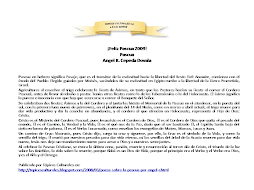
Pascua.arcd
Pascua 2008

¡Felices Pascuas de Resurrección!
Navidad y Año Nuevo 2008

Feliz Navidad y Próspero Año 2008
Calendario 2013
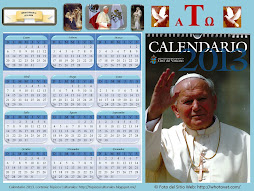
Juan Pablo II
CALENDARIO 2013

Virgen María en el Arte
Calendario 2013

Benedicto XVI
Pascua 2013
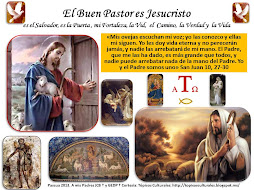
Jesucristo El Buen Pastor
feliz día de las madres 2012

feliz día de las madres 2012
DICIEMBRE 2012

DICIEMBRE 2012
NOVIEMBRE 2012

NOVIEMBRE 2012
OCTUBRE 2012

Octubre 2012
SEPTIEMBRE 2012

SEPTIEMBRE 2012
AGOSTO 2012

AGOSTO 2012
JULIO 2012
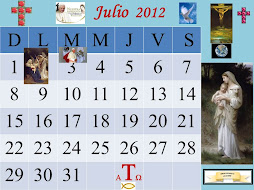
JULIO 2012
JUNIO 2012

JUNIO 2012
MAYO 2012
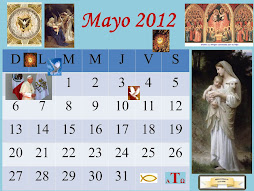
MAYO 2012
ABRIL 2012

ABRIL 2012
MARZO 2012

marzo 2012
FEBRERO 2012

FEBRERO 2012
ENERO 2012

enero 2012
Nuestras Actitudes ante la Vida

Actitudes ante la Vida
SEASON OF CHRISTMAS

DECEMBER 25, 2012-JANUARY 6, 2013
¡FELIZ PASCUA 2012!

pascua 2012
Cátedra de San Pedro

St. Peter
14 de Febrero
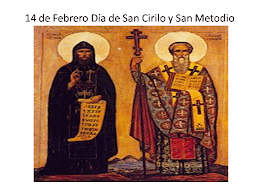
Día de San Cirilo y San Metodio
Conversión de San Pablo

Francesco Mazzola (1503-1540)
Manifiesto Universitario UAAAN
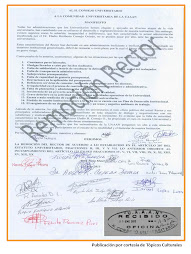
Documento Firmado y Recibido Enero 2013
Manifiesto Remoción Rector UAAAN

Documento, Enero 2013
Bendición

Feliz Navidad y Ventuoroso Año 2013
happy new year 2012

2012
Feliz Navidad 2011

Venturoso Año 2011
CUADRO 1. SÍNTESIS NEMOTÉCNICA UAAAN 2006-2012

CUADRO 2. SÍNTESIS NEMOTÉCNICA UAAAN 2006-2010
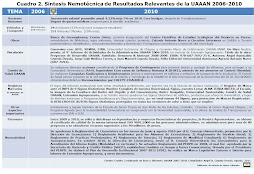
SHORT COMMUNICATION 1 ROGER BEHRA
Fig. 1. Development of Human Being. (Roger Behra, 2007)
CEREMONIA PARA LA PAZ
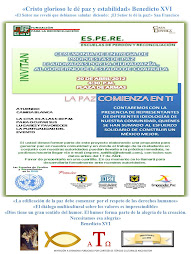
INVITACIÓN ES.PE.RE.
Cuadro 1.Semillas germinadas y estadísticos descriptivos.

ARCD y JMCD
Cuadro 2. Análisis de varianza para la variable número de semillas germinadas.

Encíclicas de la Iglesia Católica
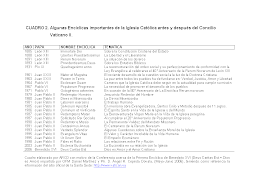
Algunas Encíclicas imortantes de la Iglesia Católica



